


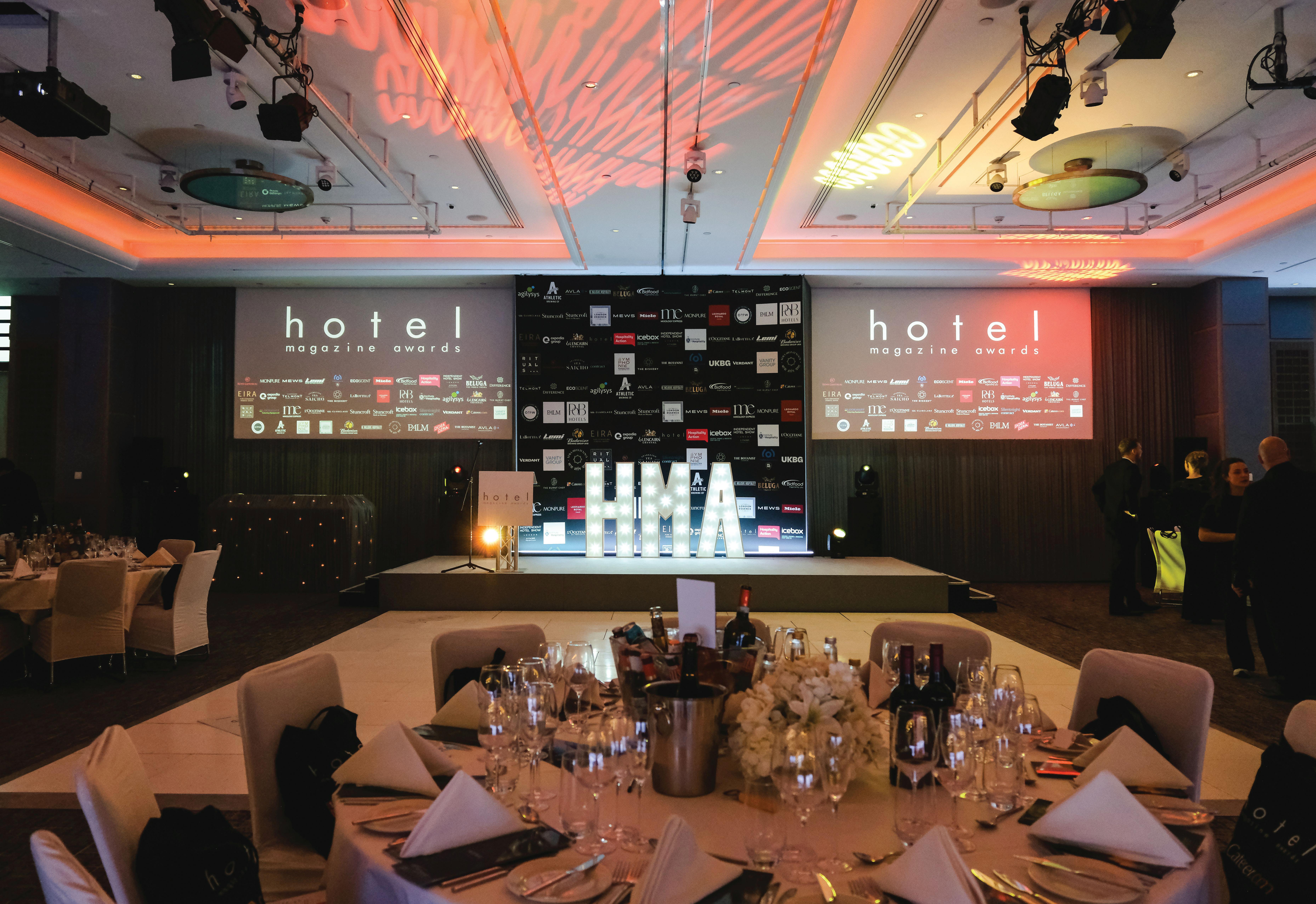

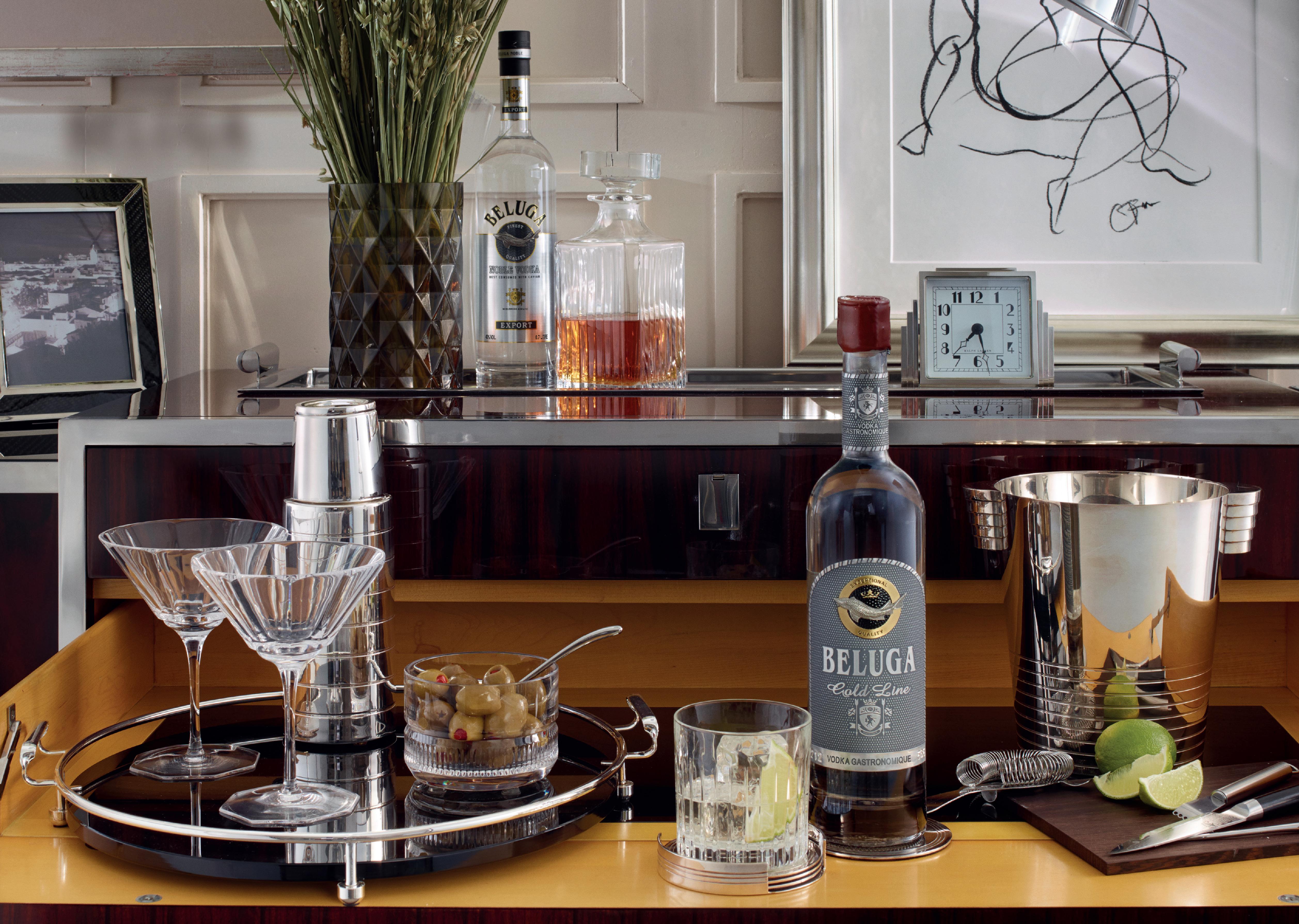























As summer pulses into full swing, the July issue of Hotel Magazine arrives brimming with fresh perspectives, timely insights, and bold conversations shaping the hotel landscape. This month, we spotlight two powerful forces redefining the hospitality experience: the renaissance of hotel bars and the rising return on investment from sustainability initiatives.
Once seen as mere amenities, hotel bars are now emerging as dynamic, stand-alone destinations. In this issue, we explore how these spaces are being reimagined—not just as stylish watering holes for guests, but as cultural hubs attracting locals and travellers alike. From craft cocktails and bespoke interiors to live music and inventive menus, hotel bars are rewriting their own rules and in many cases, becoming as iconic as the properties that house them.
Equally compelling is our feature on sustainability, “The ROI of Sustainability: Cost vs. Value for Hoteliers.” With rising environmental awareness and shifting guest expectations, hoteliers are increasingly asking not if they should go green—but how much they can gain from doing so. We delve into the financial upsides of sustainable practices, from significant energy savings to deeper guest loyalty, and offer strategies for turning eco-conscious investments into long-term profitability.

Of course, no issue would be complete without our trusted regular features—insights from the front lines of design, development, and innovation—plus a curated collection of standout stories from the sector’s most unique and inspiring brands.
Whether you’re flipping through from a sun-drenched terrace or catching up between site visits and meetings, we hope this issue serves as both a source of inspiration and a practical guide in navigating the evolving world of hospitality.


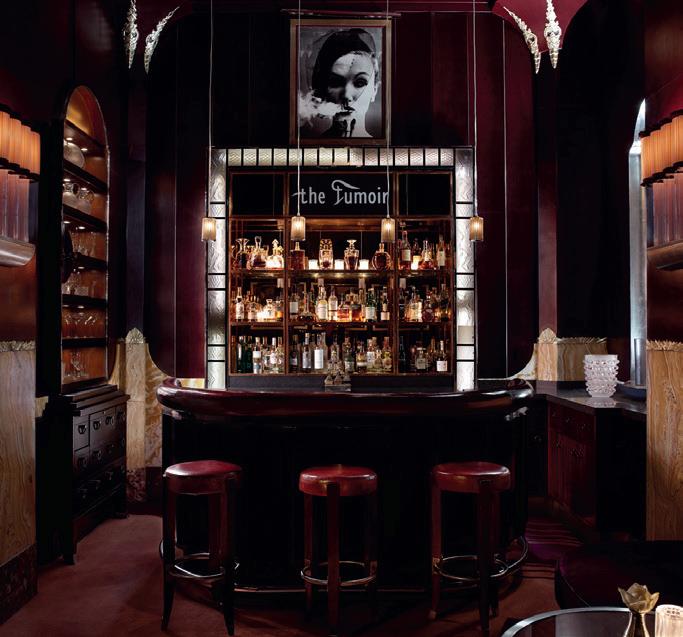
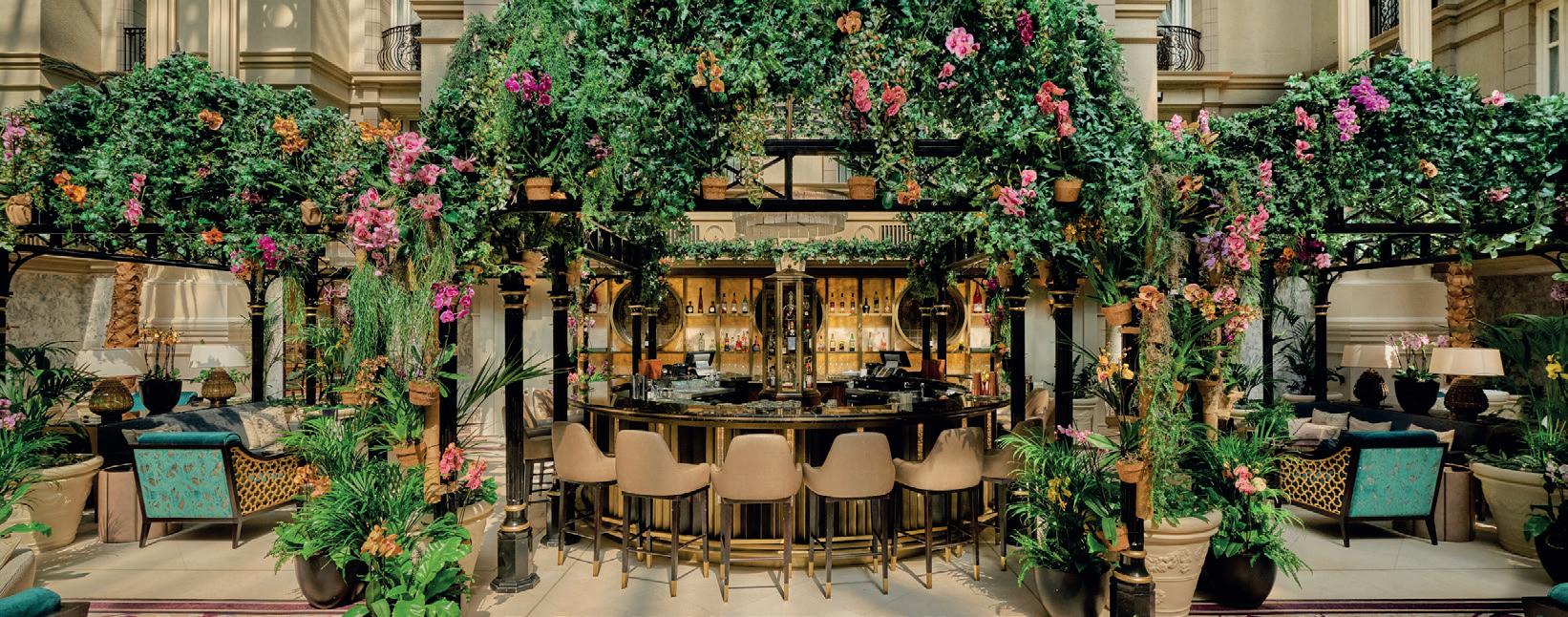


EDITOR-IN-CHIEF
Jade Evans
jevans@thehotelmagazine.co.uk
EDITORIAL ASSISTANT
Ailsa Newgreen ailsa@cimltd.co.uk
DIRECTOR
Declan Wale
declan@thehotelmagazine.co.uk Tel: 01795 509 112
HEAD OF BUSINESS DEVELOPMENT
Jazmine Davis
jazmine@thehotelmagazine.co.uk Tel: 01795 509 105
ADMINISTRATION MANAGER
Natalie Woollin admin@cimltd.co.uk Tel: 01795 509 103
CREDIT FACILITIES MANAGER
Gwen Lee creditcontrol@cimltd.co.uk Tel: 01795 509 103
MARKETING MANAGER
Lucas Payne lucas@cimltd.co.uk
SOCIAL MEDIA MANAGER
Lily Lawson socials@cimltd.co.uk
In case you missed it on our socials, we share details on all of our very worthy winners from this year’s Hotel Magazine Awards.
Gareth Banner, Group Managing Director at The Ned takes to our Hot Seat this July where we deep dive into his career and his approach to leadership.
With the help of expert comments, we look at the rise of the hotel bar renaissance and how these outlets are evolving into standalone destinations.
One Aldwych this July features as Hotel of the Month in Hotel Magazine, where we highlight its blend of luxury, sustainability, and cultural sophistication.
We analyse the financial benefits of going green—from energy savings to increased guest loyalty—and how sustainability initiatives can boost the bottom line.
We proudly share the first in its segment of our brand new housekeeping guest column from none other than Fernanda Lewis, Director of Housekeeping at The Goring and Chairperson for United Kingdom Housekeepers Association (UKHA).
DESIGN AND PRODUCTION
Grant Waters grant@cimltd.co.uk
James Taylor james@cimltd.co.uk
SALES DIRECTOR
Tom Woollin
CHIEF EXECUTIVE
John Denning
Enhance your hotel bar snack range with Pringles




Cheez-It reached £12.2m value sales after just 31 weeks, showing its broad appeal in the UK market1
Cheez-It has already attracted 2.5 million shoppers and achieved 23.7% loyalty in the UK2
Pringles is growing 15% year on year, outperforming the crisp category3
Pringles’ stackable format takes up 41% less space than the average crisps packet
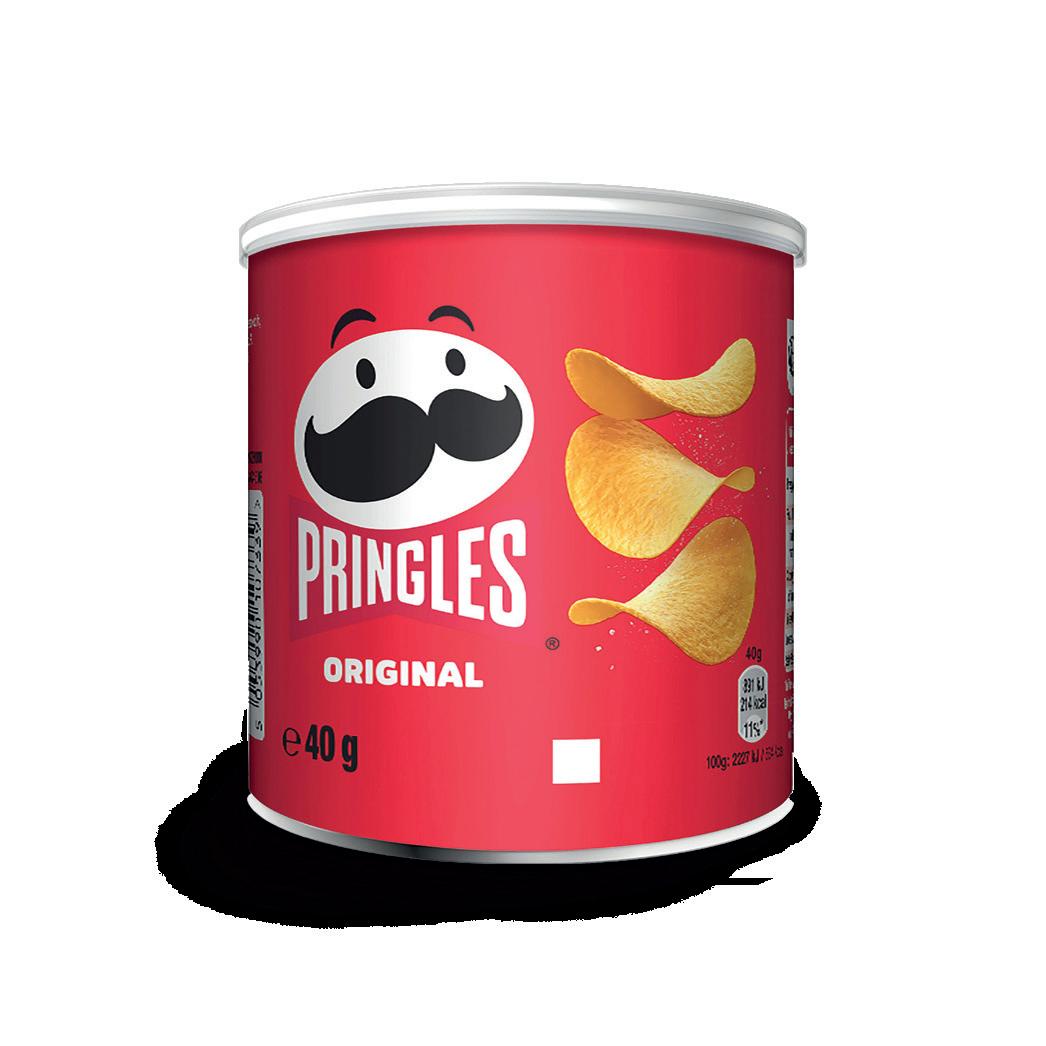



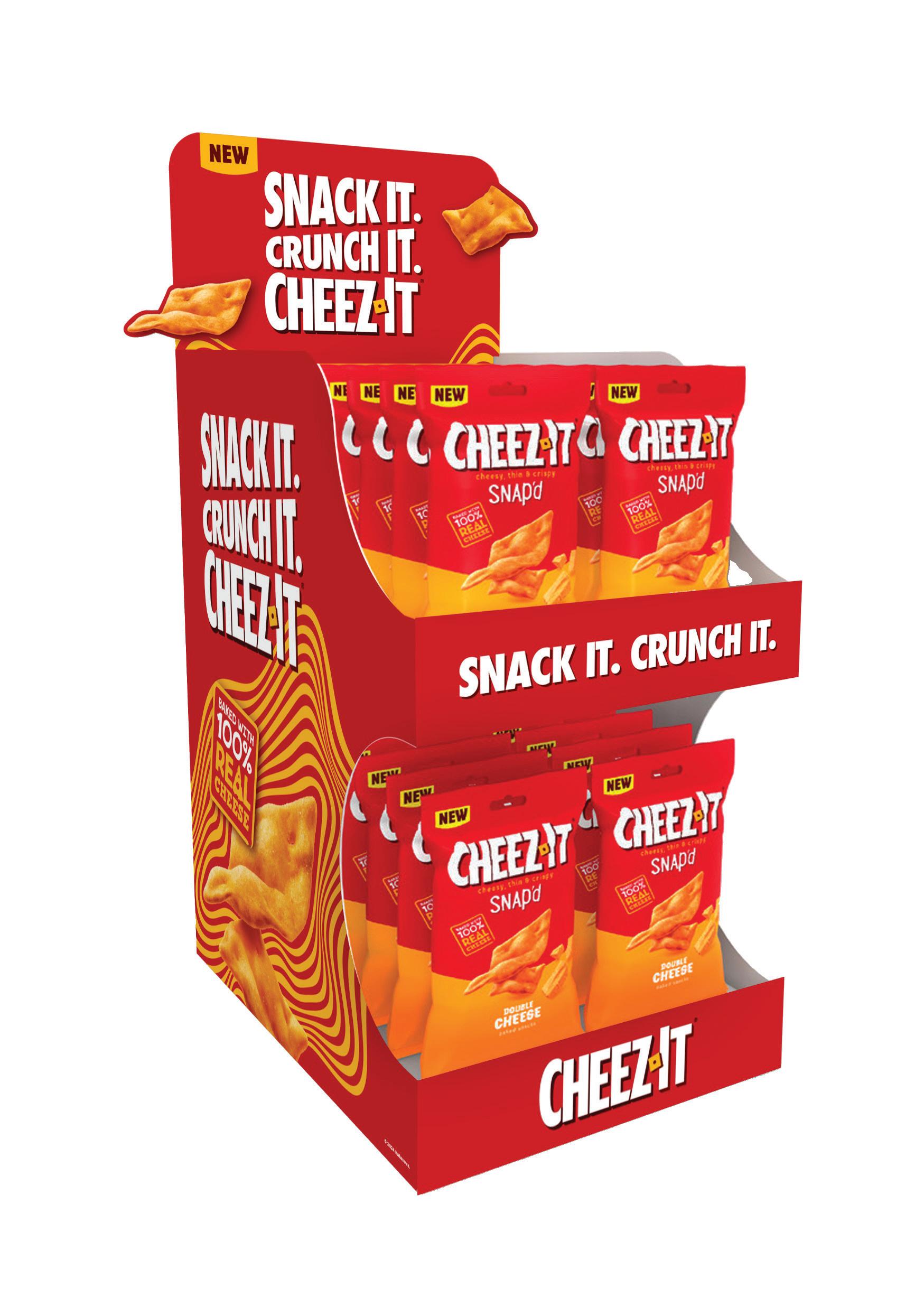











Luxury Hertfordshire hotel and multi awardwinning spa, Sopwell House, has announced the appointment of Giammario Ragnoli as its new General Manager.
An accomplished professional with over 20 years’ experience in hospitality, Giammario joins from private members’ club, The Hurlingham, where he held the position of Chief Operating Officer.
His career also includes senior roles at five-star properties such as Stoke Park, where he was General Manager for 14 years, and Baglioni Hotels, where he developed a reputation for operational excellence, strategic leadership and delivering exceptional guest experiences.
As General Manager, Giammario will oversee all aspects of Sopwell House’s operations including accommodation, food and beverage, spa and events. His focus will be to further enhance Sopwell House’s reputation as a leading luxury destination, foster a high-performance culture while nurturing the hotel’s heritage of warm, personalised service.
Commenting on his appointment, Giammario Ragnoli, General Manager at Sopwell House said: “Sopwell House is one of the finest hotels in Hertfordshire with stunning accommodation and outstanding facilities. The team are committed to delivering excellence and I look forward to working with them to further elevate the guest experience and drive continued growth.”
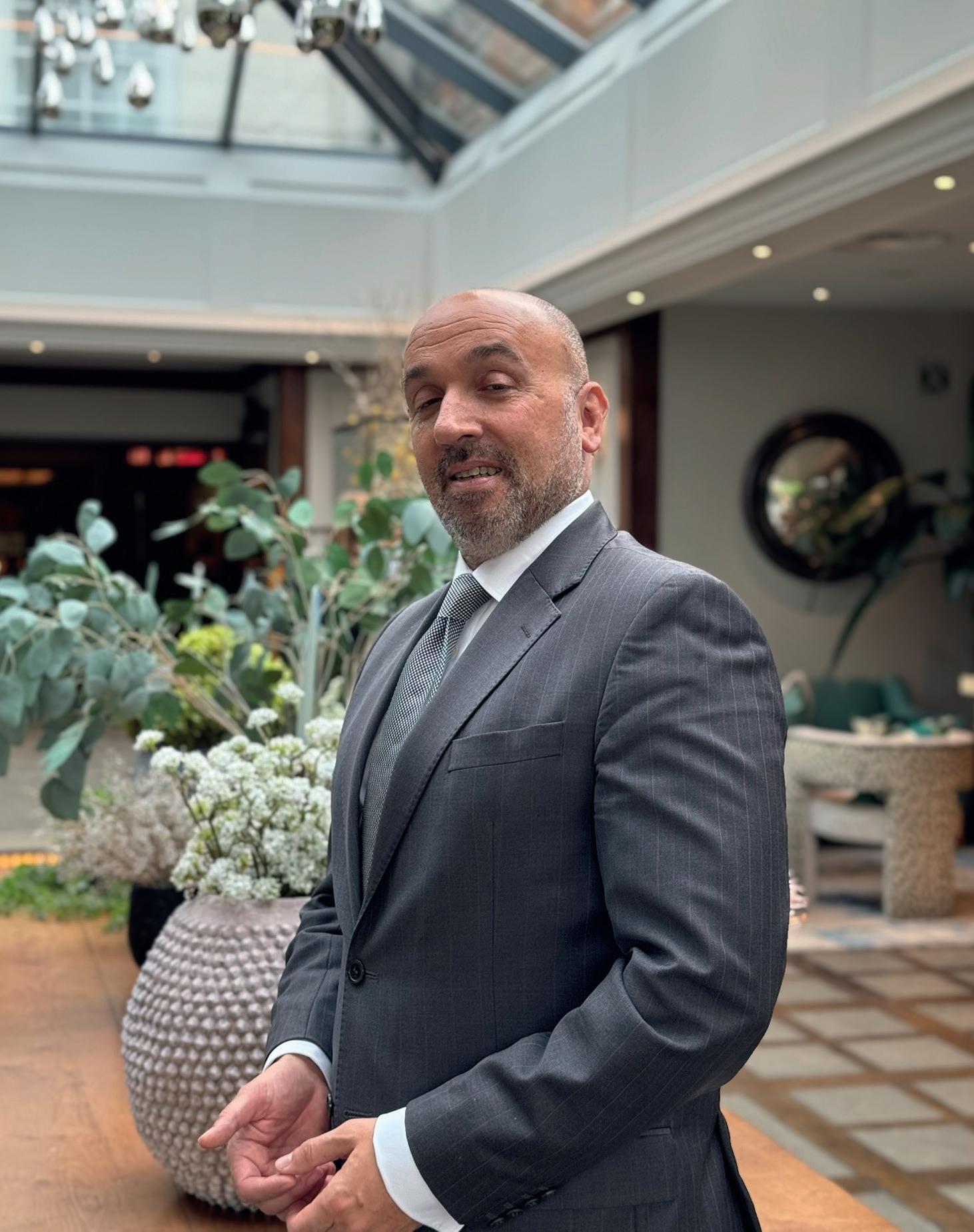
Following a significant six-figure investment, Cornwall’s most iconic hotel, The Headland, has unveiled its refurbished Ballroom after a threemonth period. The revamp of The Ballroom continues the ongoing renovation of the historic hotel, following on from the £3m investment in the launch of Restaurant RenMor two years ago.
As part of the award-winning hotel’s commitment to sustainability and journey with EarthCheck, 37 pieces of existing furniture have been carefully upcycled or reupholstered whilst new items have been acquired from local independent retailers and suppliers, such as Juzhz, Axminster Carpets, and GP & J Baker. The Ballroom has kept its elegant style whilst the full renovation gives a new modern look to the space. Other notable suppliers include Do Design Studio, GP & J Baker, Colefax and Fowler and Eden Carpets.
Commenting on the refurbishment, Veryan Palmer, Hotel Family Director, said: “As we mark our 125th anniversary this year, it felt like the ideal moment to breathe new life into our iconic Ballroom. We’re absolutely delighted with how it’s turned out—the space now feels bright and open, yet still retains the timeless character of the building. The teams involved have done an outstanding job. Over the past few weeks, it’s been incredibly rewarding to see guests relaxing with a coffee or cocktail, enjoying the sea
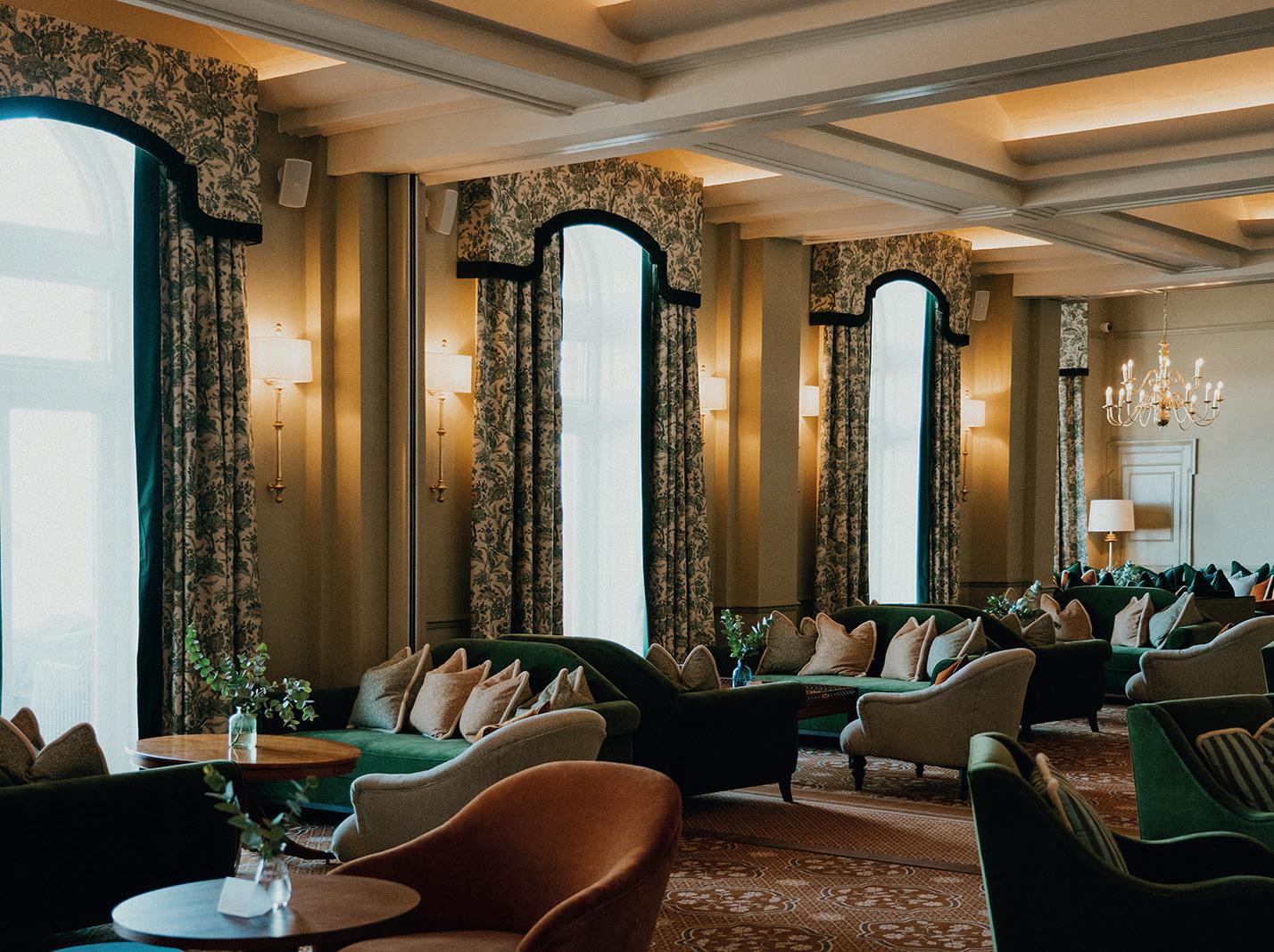
views, and making memories in our beautifully refreshed Ballroom.”
Following the mantra ‘five-star Cornwall, not formal’, The Headland offers a luxury yet laid-back escape on the southwest coast. Recognised as one of Cornwall’s most iconic hotels since 1900, and therefore celebrating its 125th anniversary in 2025, grand traditions and age-old charm with a modern twist combine to make The Headland one of the most well-appointed hotels in the South West.
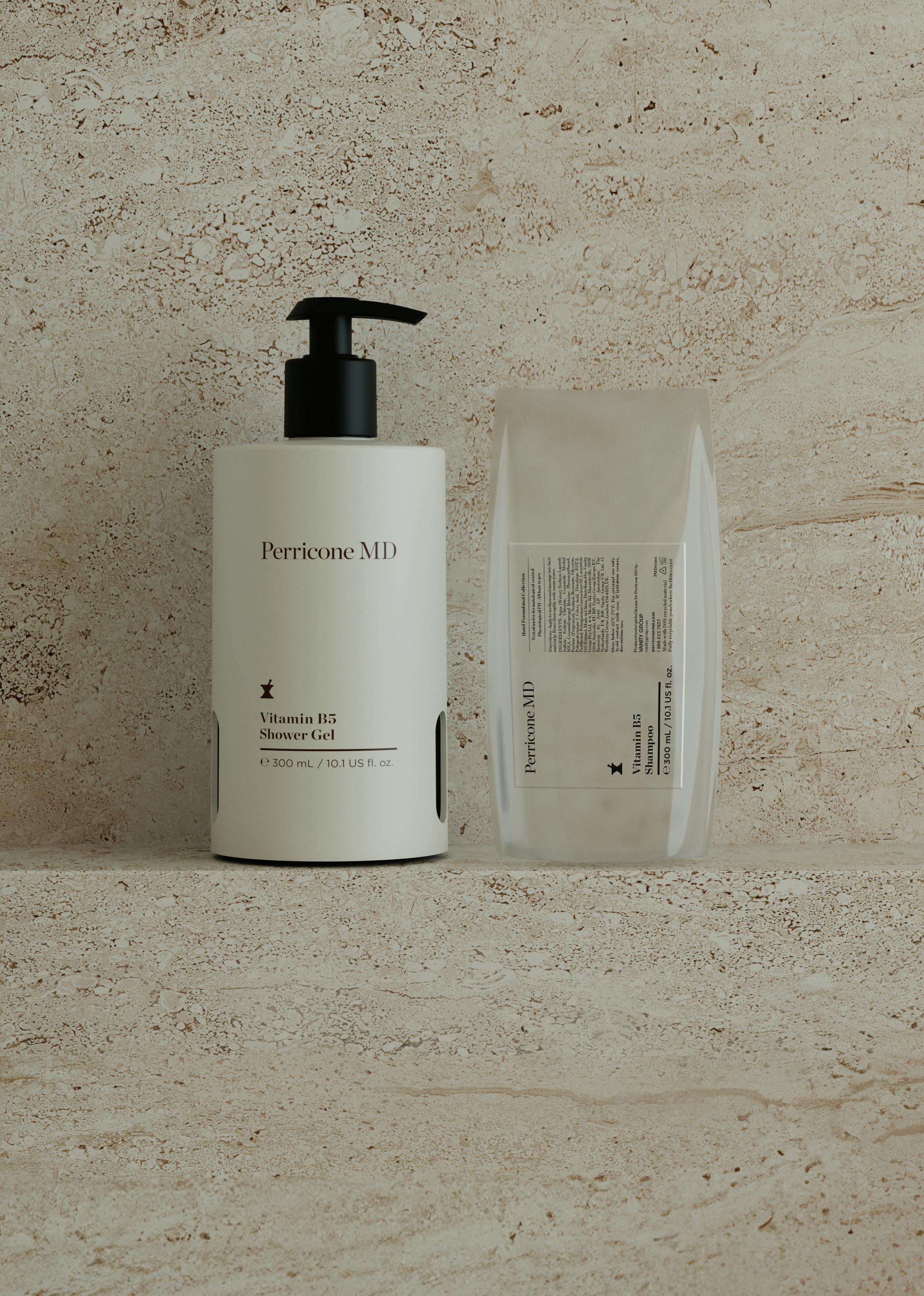


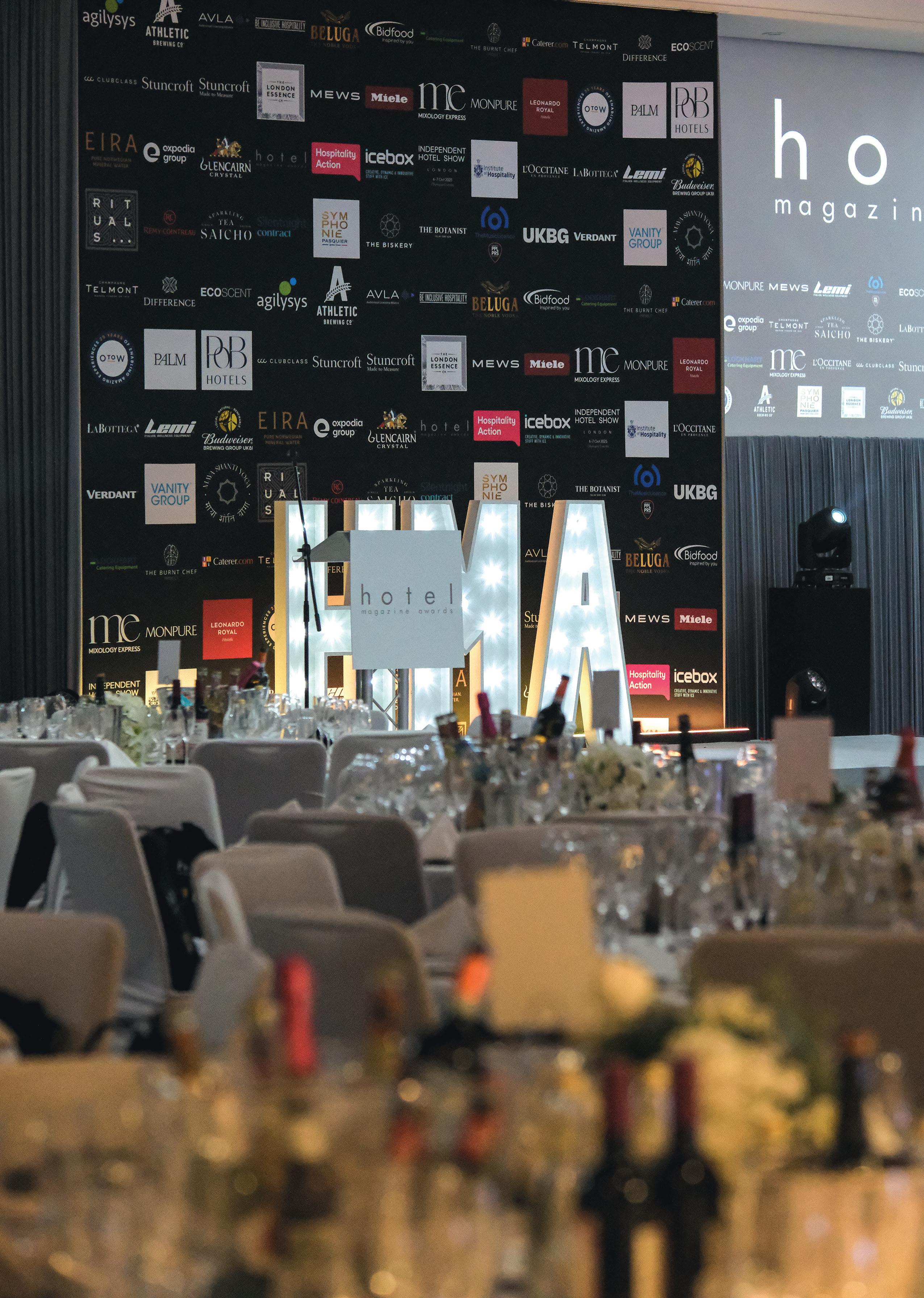
A huge congratulations to all of our exceptional 2025 Hotel Magazine Awards winners!



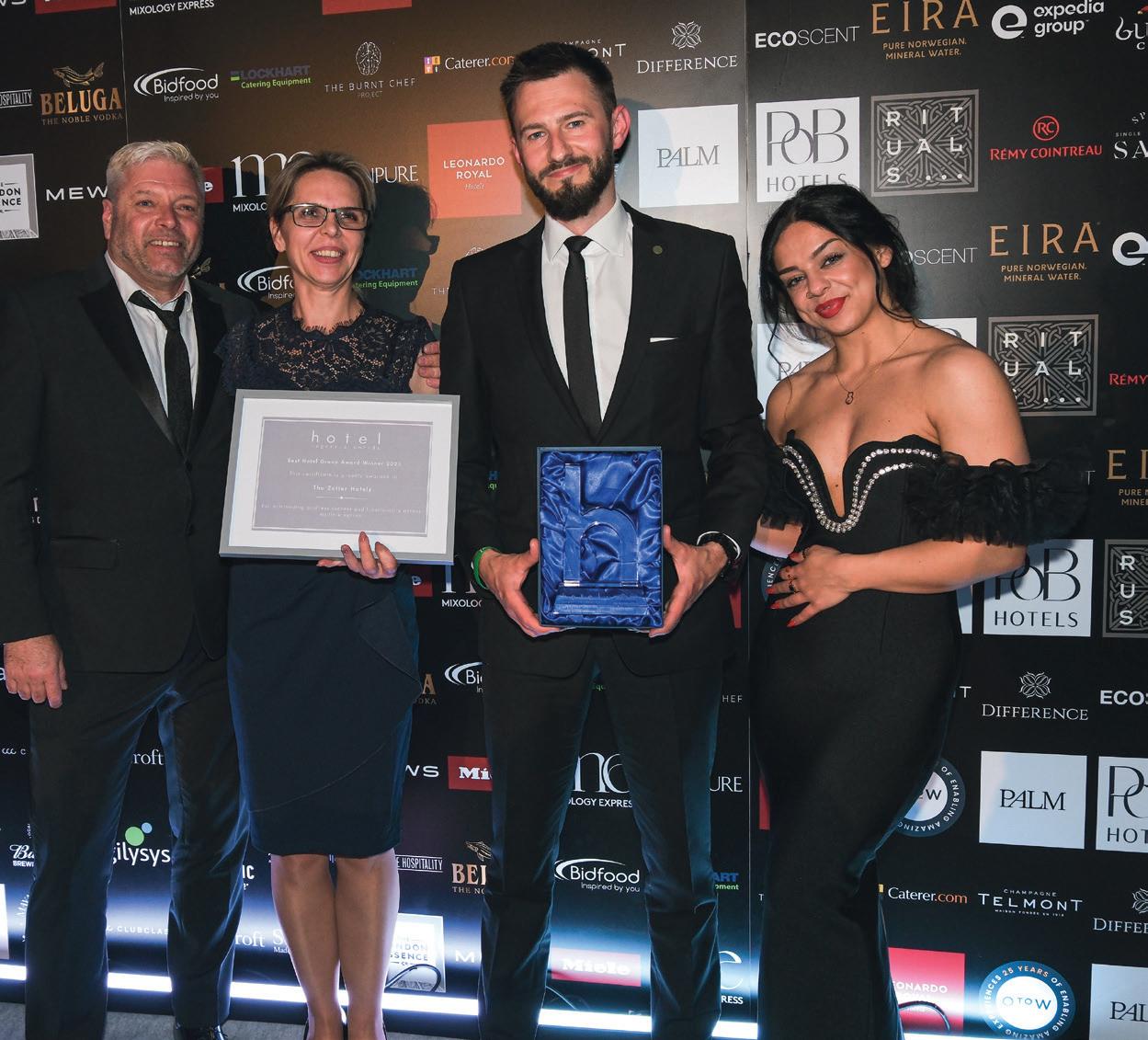

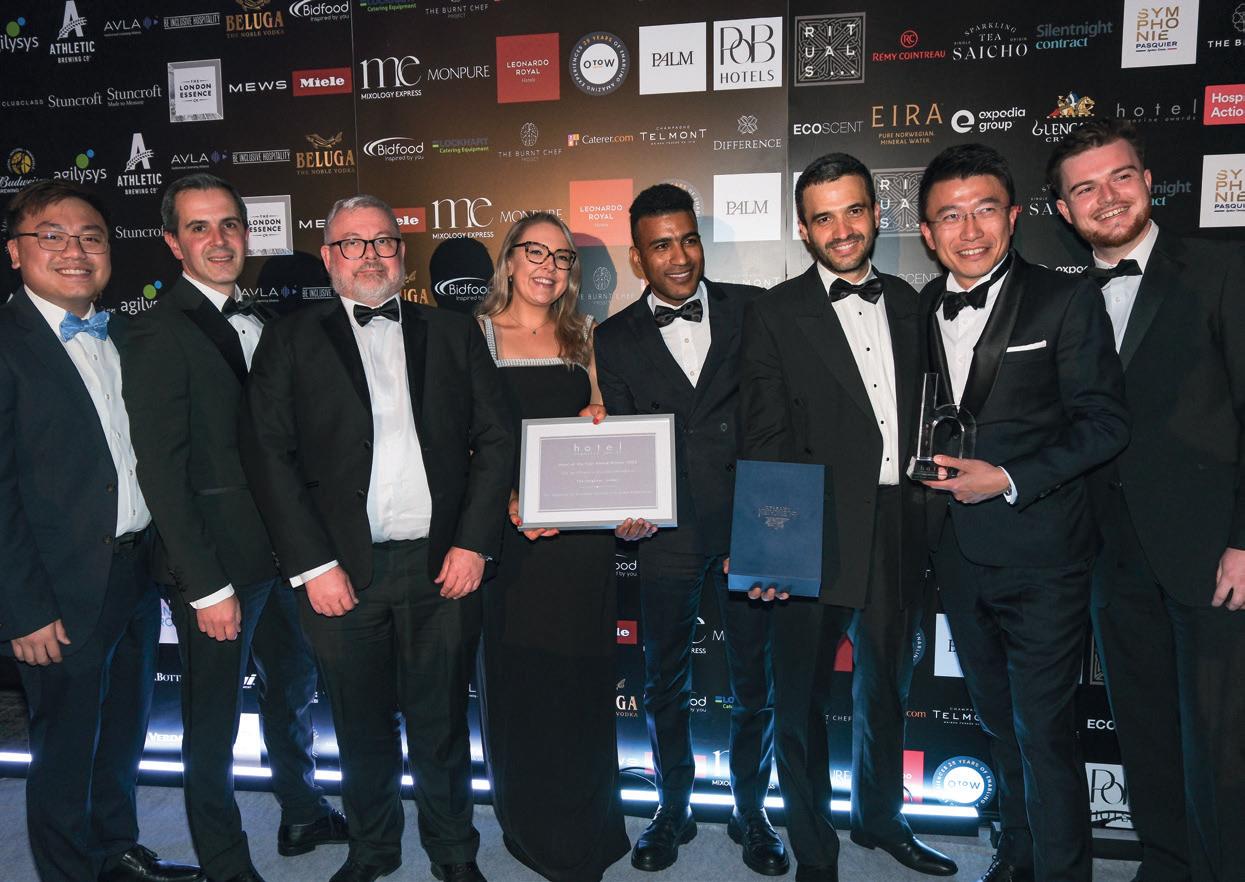
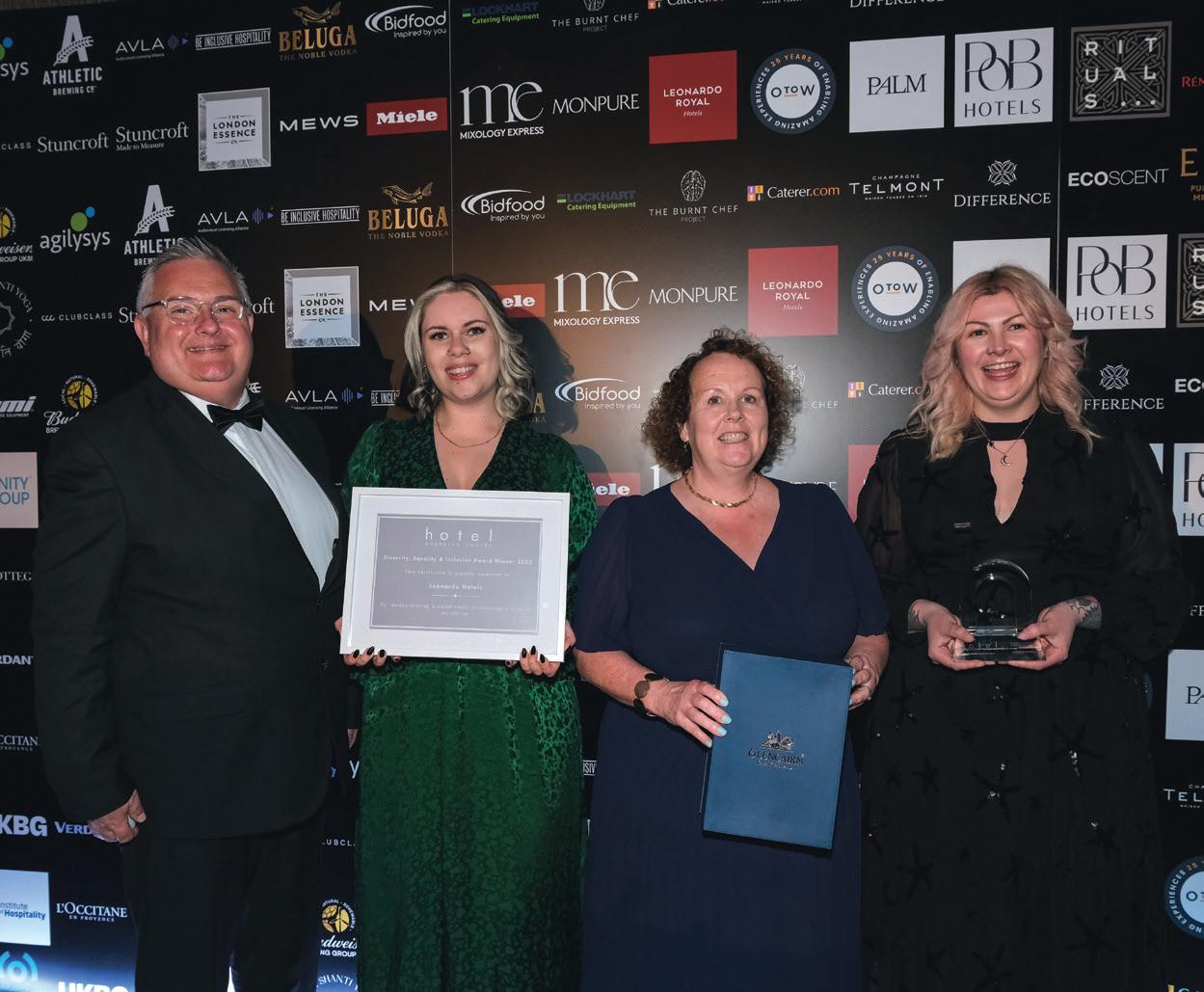

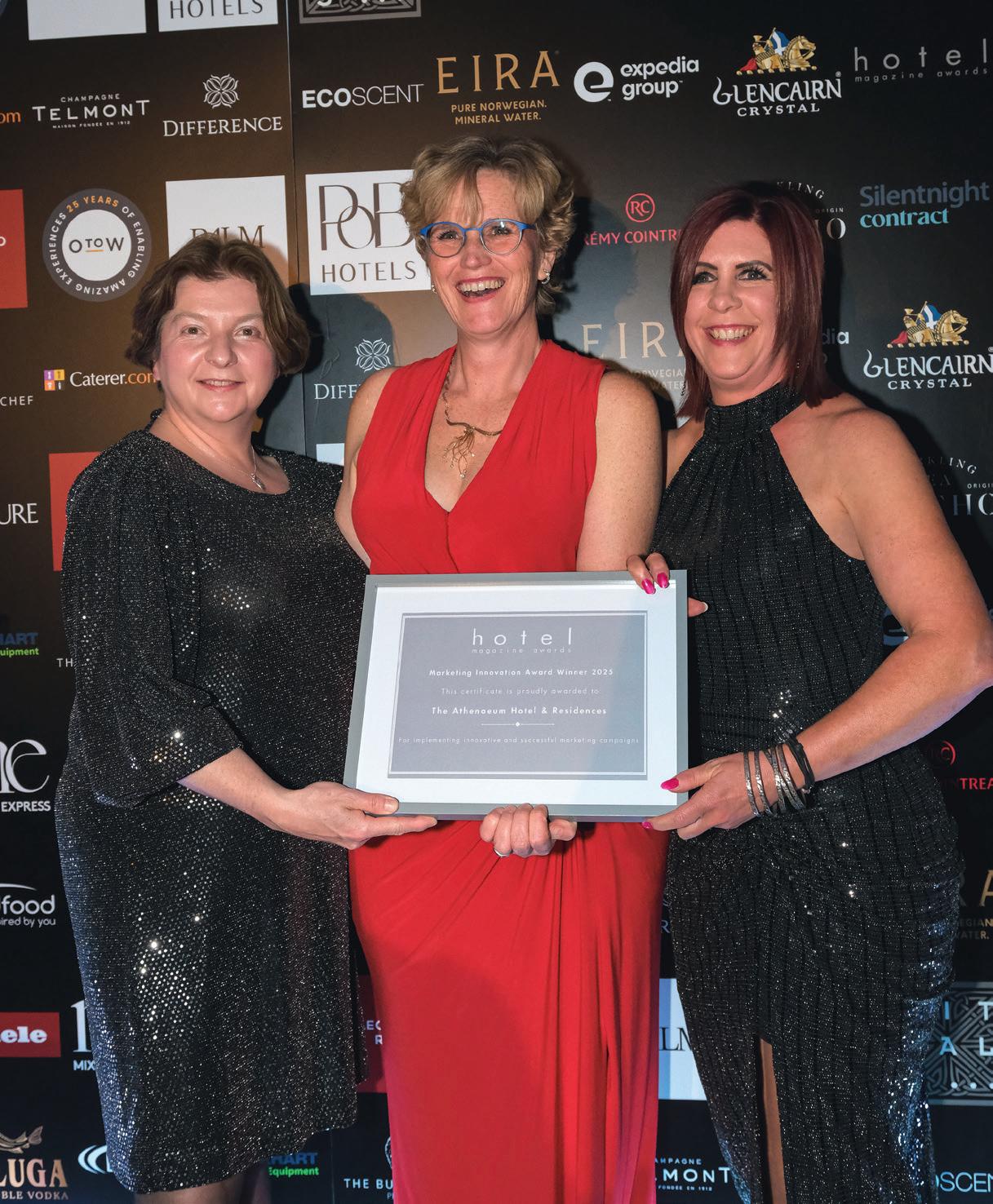

We proudly place Gareth Banner, Group Managing Director at The Ned, in the Hot Seat, to explore his journey through hospitality, the challenges and triumphs of opening one of London’s most distinctive properties, and his vision for the future of the brand.
With an impressive track record and a bold vision for the future of hospitality, Gareth Banner stands at the helm of one of the industry’s most distinctive luxury lifestyle brands. As Group Managing Director of The Ned, Gareth’s journey is marked by a blend of operational expertise, entrepreneurial spirit, and a genuine passion for people.
Gareth’s career began with a degree in Hospitality & Business Management from Oxford Brookes University, after which he joined the graduate development programme at Marriott Hotels in London. This early experience provided a robust foundation, exposing him to a variety of operational and project management roles. Over the next two decades, he held senior leadership positions at iconic London properties such as The Cavendish, The Hempel, and the St Pancras Renaissance Hotel.
His defining career milestone came in 2016, when Soho House founder Nick Jones invited him to view a confidential project in the heart of the City of London. What Gareth discovered was the former headquarters of Midland Bank—an architectural gem, brimming with potential. Enthralled by both the building and the vision for its transformation, Gareth accepted the role of preopening Managing Director. The result was The Ned London: a grand ‘urban resort’ featuring 250 bedrooms, 10 restaurants, a spa, and a private members’ club.
By 2022, as The Ned expanded internationally, Gareth was promoted to Group Managing Director. Under his leadership, the brand has launched properties in New York, Doha, and Washington D.C., with an exciting pipeline of new destinations underway.
Reflecting on his rise through the ranks, Gareth credited early experiences—like his very first job in a busy pub kitchen—as crucial to shaping his hospitality ethos. “I loved it from the get-go,” he recalled. “That summer job ignited something in me and set the path for everything that followed.”
The Marriott graduate programme, he noted, gave him deep operational insight and the ability to view hospitality as a fully integrated experience. But, it was opening The Ned that proved both the most challenging and rewarding. “Transforming a grade-1 listed building into a functioning luxury hotel and members’ club was incredibly complex. But the final product stands as a testament to vision, hard work, and collaboration.”
Gareth’s leadership style is rooted in flexibility, trust, and team empowerment. “Leadership isn’t about always having the answer—it’s about knowing when to lead and when to step aside so others can thrive,” he said. He believes in building teams that compliment his own strengths and admitted he’s still very hands-on. “We move the business forward together. My role is to ensure we never lose sight of what truly matters: the guest and member experience.”
That balance between operational precision and creative innovation is at the core of The Ned’s success. “We get the basics right—but we also have a lot of fun pushing boundaries,” Gareth explained. From curated pop-ups and culinary residencies to exclusive entertainment and brand partnerships, creativity is woven into a meticulously planned calendar that aligns with the hotel’s high service standards.
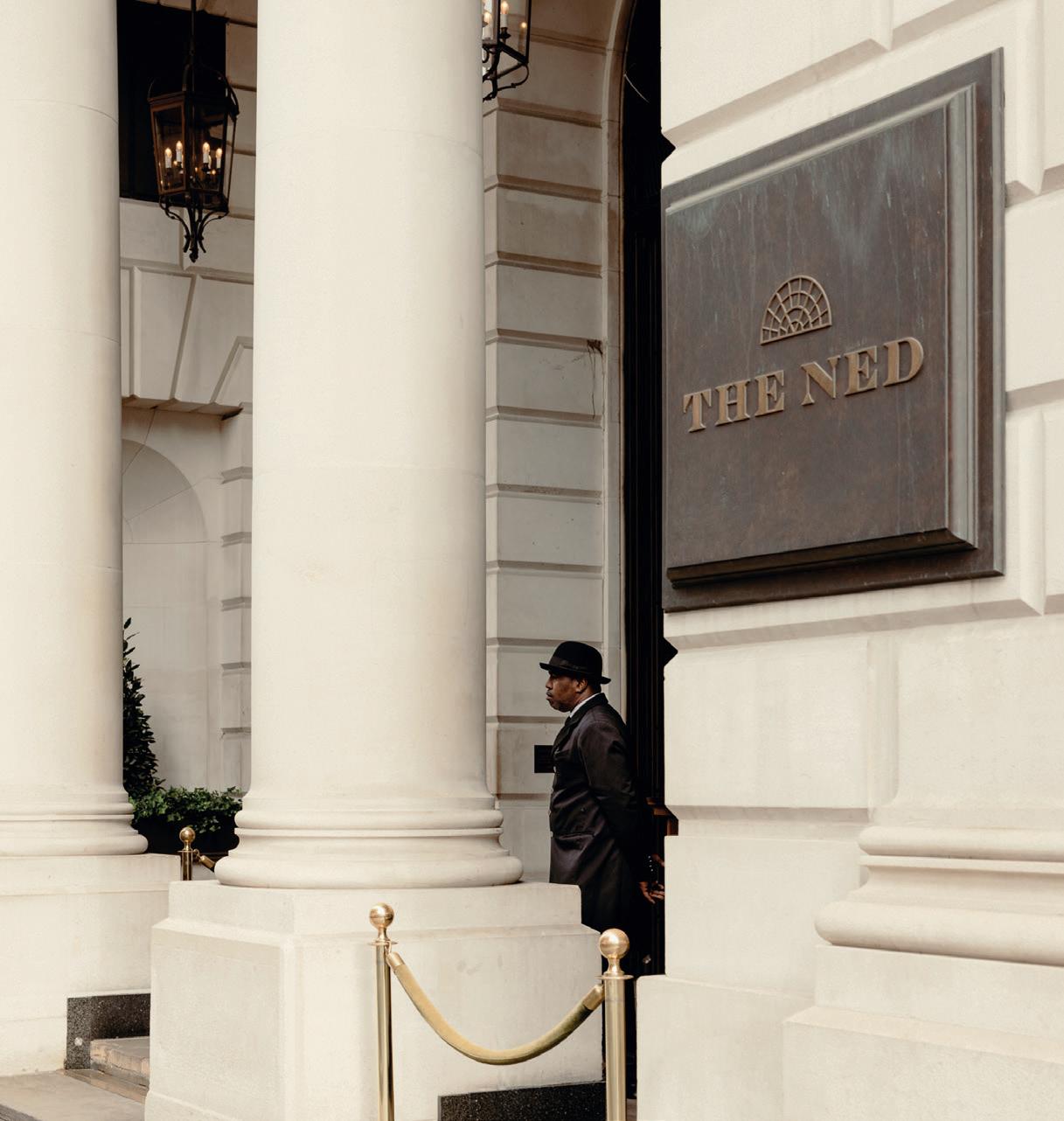
What truly sets The Ned apart, Gareth believes, is its DNA—a blend of architectural grandeur, diverse dining, wellness, exclusive membership, and, above all, its people. “We have 800 talented individuals who bring this place to life every day. They are the soul of The Ned.”
Looking ahead, the brand’s global footprint is set to grow. With locations now in London, New York, Doha, and Washington D.C., new sites on both the East and West Coasts of North America are in the pipeline. Closer to home, an exciting new project in the Home Counties will soon be revealed, alongside a flagship European location expected to be announced this summer.
In selecting new cities, Gareth and his team are guided by a deep respect for culture, architecture, and community. “We prioritise historically and architecturally significant buildings in dynamic settings,” he said. There’s also an increasing interest in exploring rural destinations—an opportunity to expand The Ned’s reach while staying true to its ethos of sophistication and exclusivity.
As for the future? Gareth doesn’t believe in rigid longterm predictions, but he’s confident about the momentum. “The last five years have been extraordinary, and the next five look even more exciting. We’ll continue to grow organically, guided by our values and inspired by the people who make it all happen.”
Earlier this year, Gareth was honoured as UK Hotelier of the Year by The Caterer, a recognition of both his leadership and contributions to the industry. He remains an active figure in hospitality circles, speaking at universities, participating in industry panels, and holding titles such as Master Innholder and Freeman of the Worshipful Company of Haberdashers.
For Gareth Banner, hospitality is more than a career—it’s a calling. And with The Ned, he’s redefining what a modern luxury hotel can be.
By Clockwork Marketing.
Inclusion and accessibility are no longer niche considerations—they’re essential principles of good hospitality. From the booking process to the final farewell, guests expect a seamless, welcoming experience. And yet, too often, the digital experience doesn’t reflect the welcoming nature of the property itself.
Yet for many independent hotels, communicating accessibility information can feel overwhelming. What should be shared? How much detail is enough? And how do you make this information easy for guests to find, without cluttering your site? These are common questions we hear from hoteliers who want to be more inclusive but aren’t sure where to start.
As a hotel and hospitality marketing agency with over 30 years’ experience, we’ve seen first-hand the barriers that can arise when digital design and real-world inclusivity don’t align. Good website design doesn’t just look beautiful—it functions as a bridge between guest expectations and what your property can offer.
That’s why we created the first hospitality-specific content management system in the UK, giving us full control to develop flexible, high-performing hotel websites. They’re fast, optimised for search, and designed around the unique needs of hospitality businesses.
Crucially, we’ve worked alongside VisitEngland to leverage their Key Accessibility Features framework. The result? A simple website module that allows hotels to clearly showcase their accessibility information in a structured, guest-friendly way.
Libby Sutherland, from Forbes of Kingennie in Scotland, shared her experience:
“All the hard work’s already been done. It really is just a tick box on the back end of the website where you can choose exactly which features are applicable to you. Once it’s live, it’s clear, and easy for customers to see exactly what you offer.”
And that clarity matters. Many hotels already provide accessible features—from level access to hearing loops—but they’re often hidden from view. This tool gives hoteliers the confidence to show what’s available, in a way that’s easy to update and easy to understand.

“It was something I’d been putting off, and this meant I did it,” Libby added. “Time is precious, but Clockwork had already done a great job of pulling this together. It really was simple.”
We’re not accessibility consultants—but we are passionate hospitality marketers. And we believe inclusion starts online. As a B Corp we’re sharing our values to help our clients become more inclusive too.
By removing digital friction and making accessibility easy to showcase online, we’re helping boutique hotels create a more welcoming experience from the very first click. Need a better website? Let’s talk.

Discover quality hospitality brands at the Independent Hotel Show 2025.
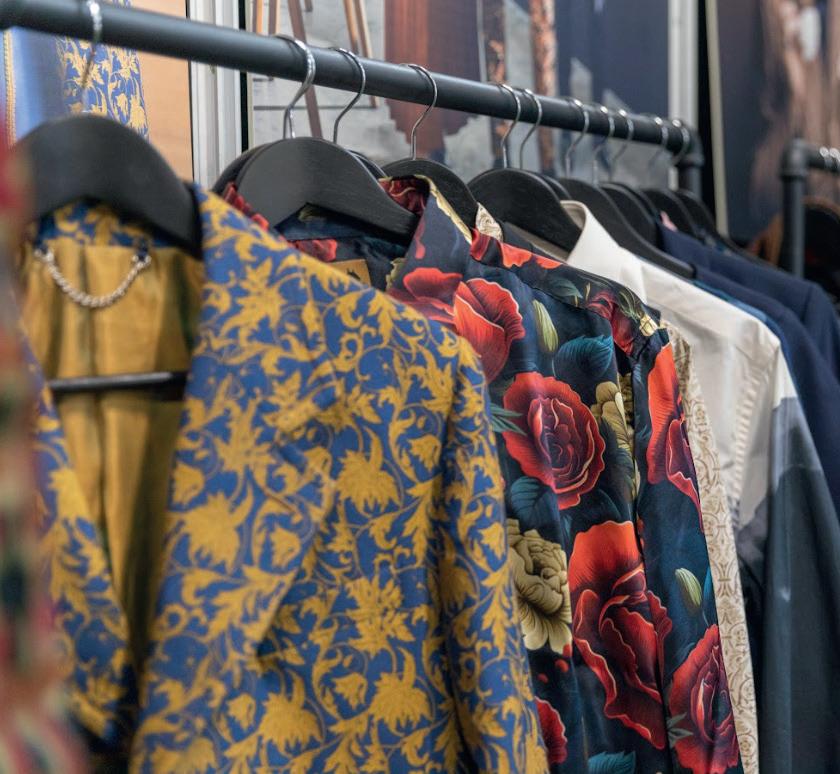
The Independent Hotel Show will return to Olympia in London on 6-7 October 2025, as a unique meeting place for the UK’s boutique and independent hotel community.
Designed specifically for this vibrant sector, the show brings together hoteliers, designers, suppliers and hospitality thought leaders for two days of insight, innovation and connection.
The event is renowned for its curated atmosphere and tailored offering, making it a must-attend for anyone involved in the running or development of an independent hospitality business.
This year’s theme, Redefining Luxury, will underpin the seminar programme, design features and broader discussions across the show floor. It’s a concept that invites debate and interpretation, from minimalist interiors and wellbeing-focused experiences to the role of technology in shaping a new kind of convenience-led guest comfort.
Stephen Browning, Hotel Director at The Feathers, commented on the theme: “For us at The Feathers, redefining luxury in 2025 means creating a guest
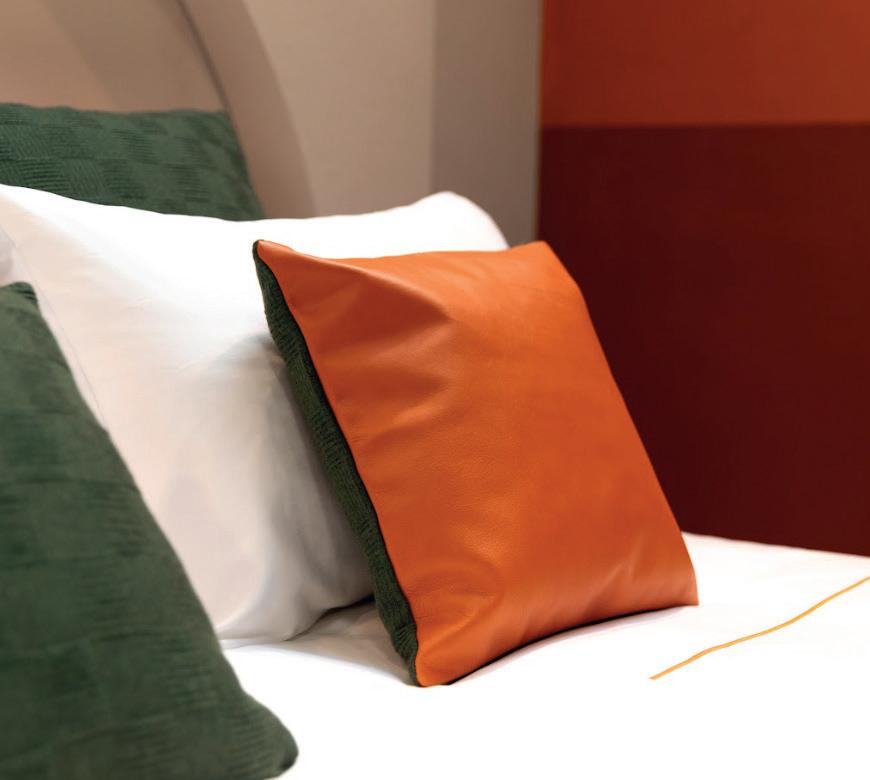
experience that feels both deeply personal and effortlessly relaxed. It’s not about formality, but about meaningful touches, warm, intuitive service, beautifully crafted food, and spaces that invite guests to truly slow down. Luxury today is less about extravagance and more about authenticity, comfort, and connection.”
Quality brands taking part in this year’s event
Across the show, hoteliers will find an extensive selection of suppliers showcasing the latest products, technologies and design-led solutions that support memorable guest experiences.
Exhibitors in the amenities and in-room category include ADA Cosmetics, known for their sustainable luxury cosmetics, and Belu, a social enterprise bringing ethical bottled water and water filtration systems to the hospitality sector.
Gordon Castle Scotland returns with its signature bathroom products, while La Purative offers vegan and organic boutique skincare focused on wellness. Hoteliers can also explore solutions from SHAR, Sparenity, and
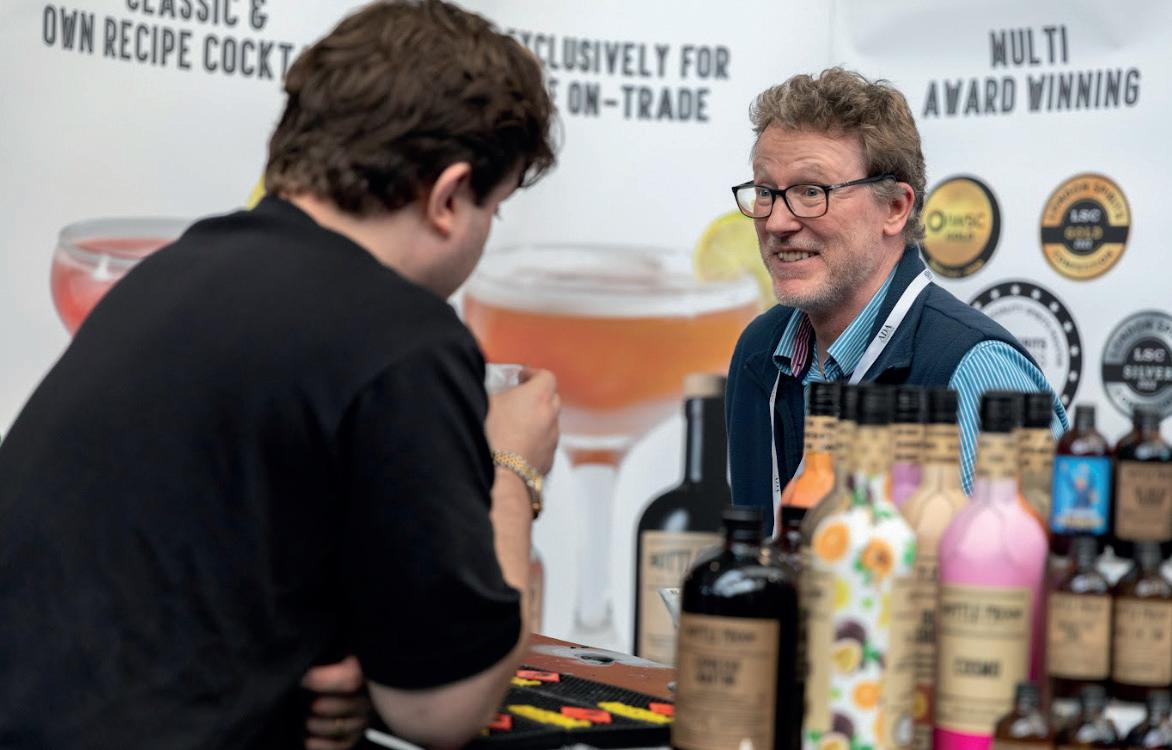

others who bring both style and sustainability to guestfacing details.
F&B can form an important part of a hotel brand, and the Independent Hotel Show continues to spotlight independent and artisan producers, showcasing everything from premium tea to small-batch spirits.
Hoteliers looking to enhance their in-room offering or bar menu can meet brands such as CRU Kafe, who deliver organic, fairtrade coffee with a conscience, or Birchall Tea and Hoogly Tea, both known for exceptional blends. Sweet and Salty Popcorn Ltd. offers a creative touch for welcome gifts or minibar treats, while Carton Water - Lighter on the Planet provides British spring water in a lightweight, sustainable caron.
Cocktail menus, meanwhile, get an upgrade with gin, whiskies and more from Hawkridge Distillers Ltd., and breakfast service can stand out with The Fruit Pig Company’s artisan bacon and black pudding.
Whether hoteliers are refreshing a single suite or planning a full renovation, the 2025 show will feature a host of specialist suppliers offering visual impact, craftsmanship and durability.
Among them, contract furniture brand Cult Furniture brings consumer style intro commercial spaces, while Rosetone Contract Furniture is known for robust, stylish


event furniture solutions. Those looking for statement elements can connect with Belltrees Forge Ltd for hand forged interior accessories or ATADesigns for bespoke wallpaper and surface pattern design.
Hospitality tech continues to evolve rapidly, offering new ways to streamline operations, personalise guest interactions and optimise profitability.
Exhibitors such as Guestline and Agilysys provide comprehensive PMS and guest engagement platforms, while ReGuest GmbH supports guest communication for sales and marketing.
From hotel access control systems and smart entertainment systems from Macrotech’s to high capability internet from Televes UK Ltd, hoteliers can explore a broad spectrum of future-ready solutions.
As wellbeing becomes a central component of the luxury guest journey, hoteliers are exploring new ways to deliver moments of calm and rejuvenation. At this year’s event, Fitshop will showcase professional-grade fitness solutions, while Komoder brings cutting-edge massage technology for guest rooms and spa spaces.
The Independent Hotel Show London takes place on 6-7 October 2025 at Olympia. For more information about everything happening as part of this year’s event visit independenthotelshow.co.uk.
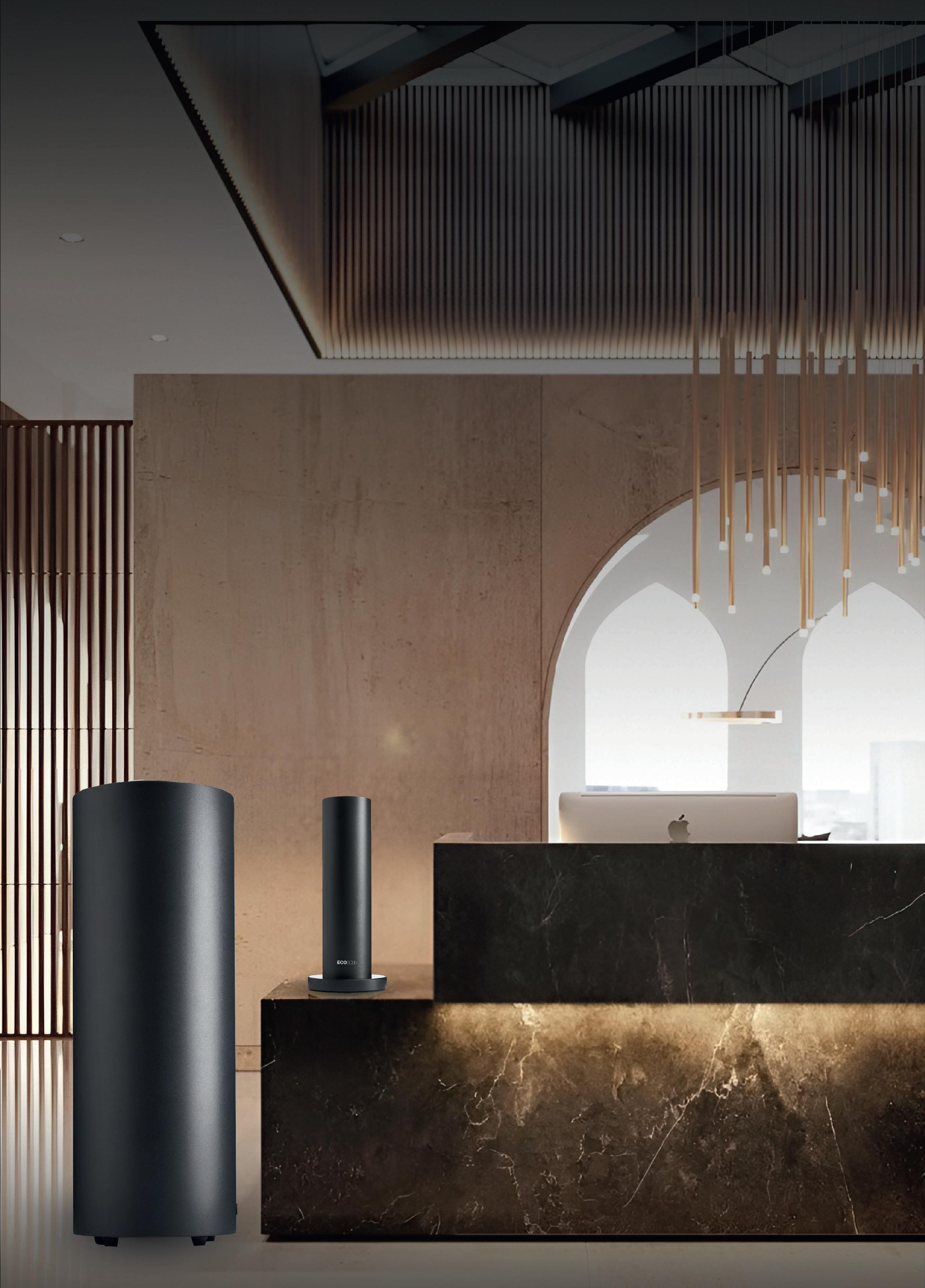

At EcoScent, we specialise in scent marketing solutions that transform spaces and enhance brand experiences. We work with hotels across the UK and beyond to create bespoke f ragrances that leave a lasting impression on guests.
Create a Memorable Guest Experience Strengthen Your Brand Identity Enhance Guest Perception Encourage Guest Loyal ty



We explore the rise of the hotel bar renaissance and how they are evolving into standalone destinations.

Once seen as quiet corners reserved for exhausted travellers, hotel bars are now undergoing a striking transformation. These spaces are evolving into vibrant, standalone destinations that attract not only hotel guests, but also a growing crowd of discerning locals.
From craft cocktails to curated wine lists and locally inspired menus, the modern hotel bar is redefining its role—becoming a cultural and culinary hotspot. This renaissance is being fuelled by thoughtful design, elevated service, and a sharper focus on product choice, turning these venues into vital parts of a city’s social fabric.
Mark Thewlis, Hotel Manager at Foxhills Club & Resort, has noticed how guests are looking for Instagrammable spots with a story. He said, “There has been a broader cultural shift where people are craving connection, craft and a place where they belong. Hotel bars can offer just that, blending the comfort of a luxury setting with the thrill of discovery, giving great social and networking opportunities.” At Foxhills, they’ve created a ‘home from home’ feel but still aim to give guests the feeling they are indulging.
Mark believes that bars now need to differentiate themselves and keep up with the ‘high street bars’. An example at Foxhills is, “We’re looking into the idea of serving a selection of 125ml Foxhills bar but of higher quality wine, allowing people to try something special without having to pay £80/90 for a bottle.”
Speaking on how the team at Foxhills has adapted their bar menu to cater to the growing demand for craft cocktails and unique drink experiences, for Mark, it’s all about “the story.” He sees that through working with local suppliers, their approach is rooted in quality, seasonality and creativity, curating memorable experiences but also value for money. “We are moving away from house Champagne and going with English sparkling wine as the house pour and we’ve introduced bespoke cocktails inspired by the estate, drawing on ingredients from our own grounds where possible, alongside a curated selection of small-batch spirits, artisan mixers, as well as broadening our low/no-alcohol range which is a market that continues to grow.”
In terms of what has changed in the expectations of guests when it comes to hotel bars in the last decade, a spokesperson at Dakota Newcastle, said, “The variety of drinks on offer – guests are hoping for a more elevated experience than just a G&T or glass of wine.” This is why the bar menu at Dakota Newcastle features both Classic and Contemporary Cocktails, fine wines, a plethora of whisky and spirits, and some really incredible options such as Louis XIII.
In line with the renaissance hotel bars are currently experiencing, The Dover Marina Hotel & Spa recently unveiled its newly refurbished Churchill Bar & Lounge, marking a significant milestone in the hotel’s ongoing transformation. Pradeep Wijesinghe, Hotel Manager at The Dover Marina Hotel, revealed that the vision behind the recent refurbishment came from the venue’s owner who wanted to restore the hotel’s historic charm while seamlessly integrating modern amenities. This vision led to a comprehensive transformation, including the unveiling of the Churchill Bar & Lounge — a sophisticated yet welcoming space.
With hotel bars becoming destinations in their own right again, rather than just amenities for overnight guests, Pradeep believes that this reflects a broader shift in the hospitality industry, “where hotel bars are evolving into cultural and social landmarks in their own right.”
Similarly, at Bath’s Royal Crescent Hotel & Spa, their relaunch of their restaurant and bar area as Montagu’s Mews a couple of years ago, has meant that the bar area has become a central meeting place for guests and nonguests alike. Lorraine Jarvie, GM at The Royal Crescent Hotel & Spa, said, “With its own Montagu’s Mews identity,
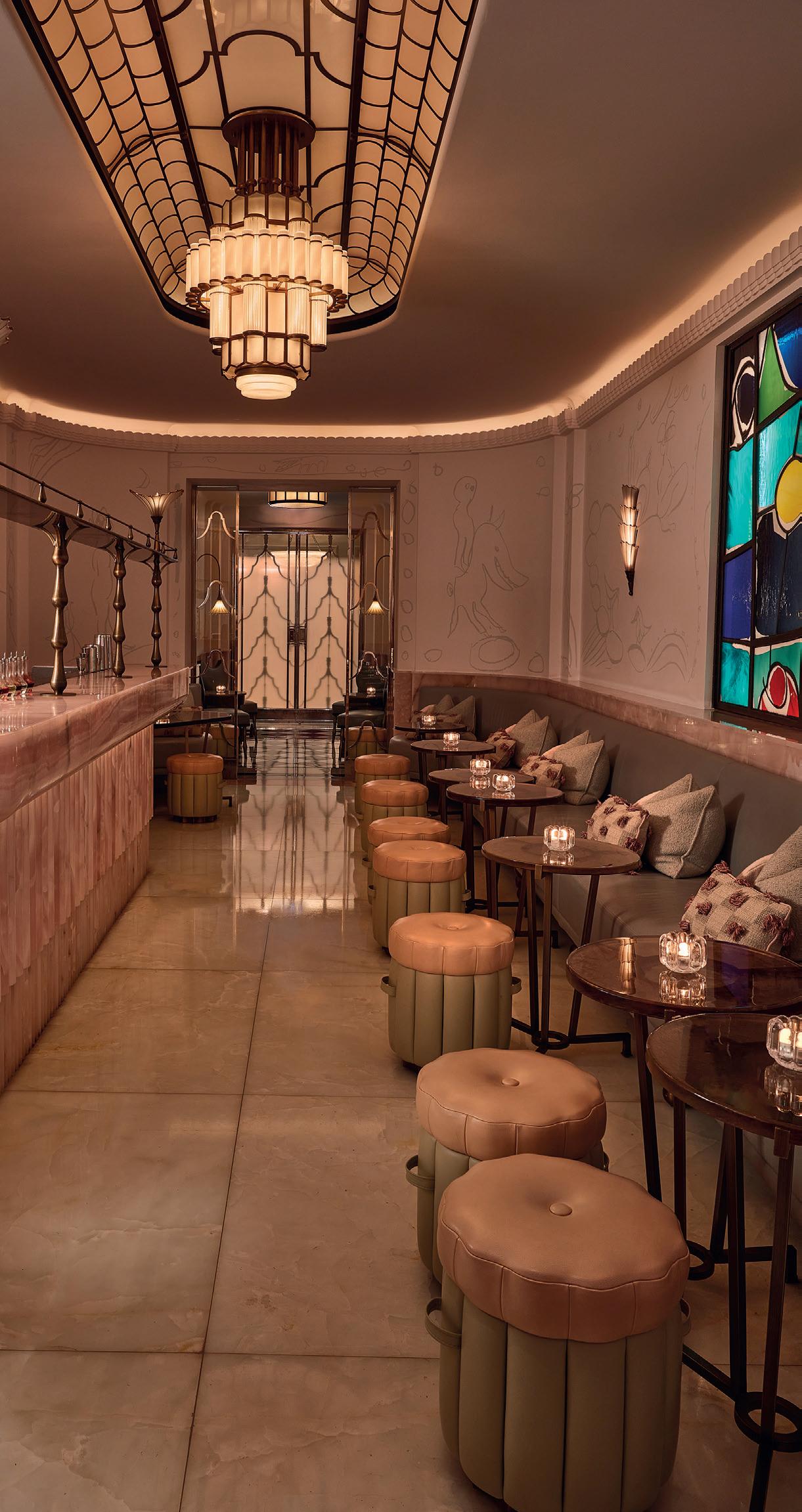
it is seen as a local place to go in its own right, and thanks to the hotel it attracts high level rather than transient staff, resulting in high quality service for guests and patrons”
In terms of the key trends that are driving the resurgence of hotel bars as standalone destinations, rather than just amenities for overnight guests, Lorraine explained how her team are definitely seeing a rise in low and no alcohol options, she said, “Given our resources as part of the hotel, we are able to cater to these requests in a more creative way than many bars.
“In addition, hotel bars are often design led and seen as cooler places to be, plus the high service levels, means more non-guests are flocking to hotel bars as fun alternatives.”
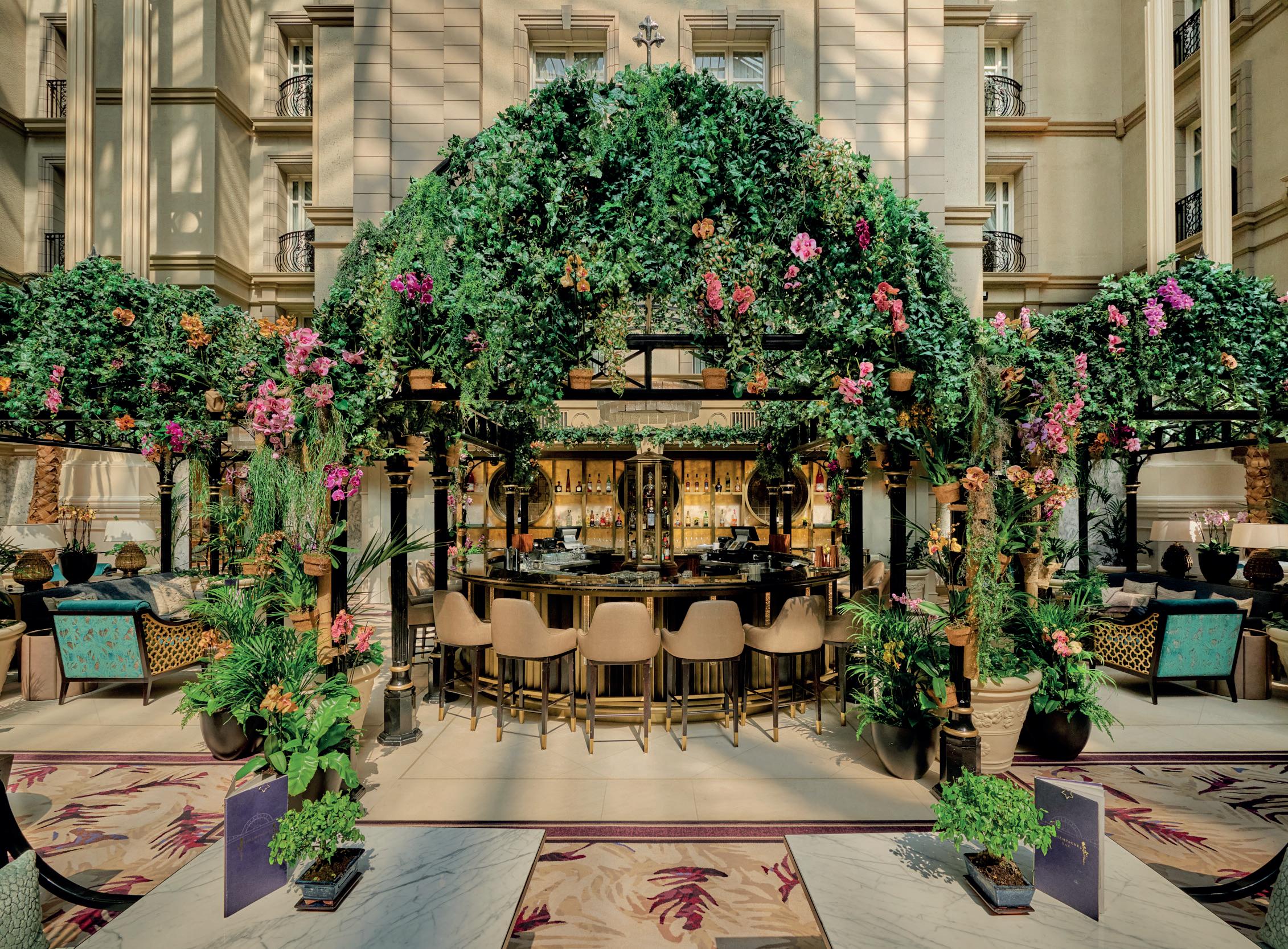
In order to attract these non-hotel guests to the bar, for The Royal Crescent Hotel & Spa, creative social evenings have been key to getting the message out that the venue is open to non-residents and their events have helped in having something to talk about. Lorraine said, “We have appealed to a younger audience with summer DJ nights, live music in the winter time, and newer jazz nights in summer too.
“This summer we also have a Taittinger Terrace in the gardens, opening up a beautiful outside bar space for locals to enjoy. Finally, we have ensured that our offering is affordable and relaxed, but can also be used as a special occasion spot, making it welcome to all types of guests.”
Cedric Lescure, Director of F&B at The Landmark London, believes he is truly witnessing and actively contributing to a profound renaissance in hotel bars, where their role has fundamentally transformed. “At The Landmark London, we believe bars are no longer merely convenient amenities, but rather vibrant, standalone destinations that actively compete with, and often surpass, independent establishments. Our philosophy is
to create experiences that deeply resonate with both our international guests and the discerning local community.
“A cornerstone of this transformation, and what truly defines this renaissance, is the meticulous curation of our product choice. Take our recent Japanese Garden pop-up as a prime example. We didn’t just create a stunning visual space, we meticulously selected Japanese sparkling sake, boutique Champagnes, and bespoke cocktails, perfectly complementing an exquisite new sushi menu. We also offer live music and entertainment from pianists, jazz bands and gigs. This deliberate and thoughtful selection of drinks, food and entertainment is how we elevate the experience, turning our bar into a sophisticated hub where guests genuinely choose to spend their afternoons and evenings, affirming the new era of hotel bar excellence.”
At Claridge’s, their bars reflect this renaissance by blending historical charm with the elegance of Art Deco design, while providing quiet luxury and refined hospitality. George Raju, Director of Bars at Claridge’s, gave The Fumoir bar as an example and said, “Nearly 14 years ago, when I joined, it was a beautiful space but not that well
known amongst non-hotel guests since with focus on great service and the ‘Bright Young Things’ cocktail menu then it has grown to become a firm favourite amongst the local Londoners and our international hotel guests as a high-end cocktail bar with a loyal following.”
Reinventing your hotel bar menu is essential to stay relevant and attract new audiences, particularly younger travellers and local patrons seeking fresh, Instagramworthy experiences. A refreshed menu that incorporates trending flavours, sustainable ingredients, and creative presentation can transform your bar into a destination in itself, boosting both foot traffic and revenue.
When it comes to the approach of creating a cocktail menu that appeals to both international travellers and locals, George said, “It may seem like common sense, but the menu should match the character of the venue.”
Often, you see menus that are too fussy for the sake of it leaving guests unable to relate. George advises looking within for ideas and inspirations to use. “Draw from what you have already then look outwards for innovative techniques, trends and great products while aligning it with expectations of your target guests. Get your bar team involved in the creativity so that they can see their input into the cocktail do well or not so well and learn from it.”
We asked George what advice he would give to upand-coming hotels looking to create a world-class bar programme, to which he said, “Have a beverage programme that tells a story or showcases what you do better than others. Build a team that’s consistently reliable at offering genuine hospitality than being occasionally brilliant.
“In the luxury hotel market, I feel the guests are impressed by surroundings of course but the real reason they keep returning is for being remembered for their preferences, welcomed by name, and made to feel at home something we do very well.”
It’s no secret that some hotel bars have previously lacked excitement, largely due to the perception that they were only for in-house guests. Today, however, the majority of hotel bars offer innovative cocktail menus, original concepts, and exceptional service, with significant efforts made to ensure they’re accessible to the general public.
Finbarr Collins, Food and Beverage Operations Manager, One Aldwych, is excited by this shift and over the last decade, has seen cocktail menus evolve in response to changing customer tastes, trends and demands. He said, “That’s why, three years ago, we launched The Gallery Menu inspired by our remarkable art collection and featuring local, often lesser-known distilleries, and celebrating seasonal produce from across the UK. Being an independent hotel ourselves, we are very passionate about working with other independent spirits, as well as fellow B Corp brands. In fact, we’re the first five-star hotel in London to achieve B Corp status.”
Delving into exactly what sparked the renaissance of the hotel bar in London and globally, Finbarr believes it has been driven by “a massive trend toward cocktails and high-end spirits”. He explained how many hotels noticed their guests were visiting independent cocktail bars, so they began offering a similar experience in-house.
“Before long, these hotel bars started to rival independent establishments, thanks to their high level of service and unique concepts”.
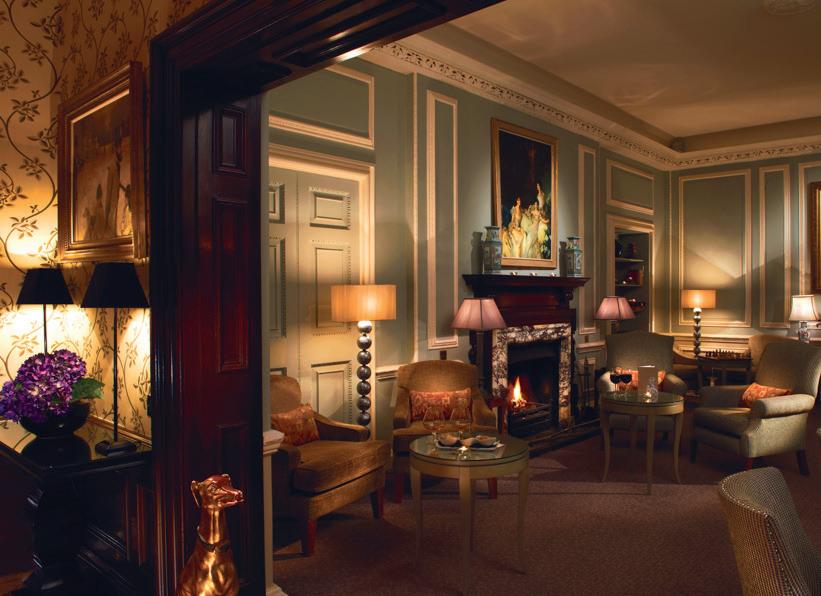
Collaborations with notable mixologists and hosting bar takeovers at hotel bars can significantly boost footfall by creating buzz and drawing in both locals and travellers eager for exclusive, one-night-only experiences. These events generate excitement through the allure of celebrity bartenders, unique cocktail menus, and social mediaworthy moments. Additionally, they can position venues as a trend-forward destination, attracting new clientele and encouraging repeat visits from those seeking curated, high-end nightlife.
For their last cocktail menu at One Aldwych, the team collaborated with Marcis Dzelzainis, founder of Idyll Drinks. Finbarr said, “We wanted to focus on our art collection in the hotel and small independent distillers from the UK. Looking ahead, we’re planning to host bar takeovers and have an exciting collaboration coming up with fellow B Corp brand Sipsmith, so watch this space!”
Robert Pici, General Manager of Ellie Beach Resort, believes that people are choosing hotel bars over traditional venues due to several reasons, “Including a laidback guest centric atmosphere, live music offerings, great cocktails and mocktails, and an elevated experience.”
In terms of what, nowadays, is an absolute necessity within a hotel bar for it to stay relevant – Robert sees that the ability to adapt and pivot quickly is essential to staying ahead of the competition and standing out from the crowd.
He said, “Modern travellers value quality, novelty and a connection to the destination, so a hotel bar must be prepared to deliver all three.
At The Ellie, for example, we offer seasonal offerings that highlight the best of the local flavours and trends. During the warmer months, our poolside bar features refreshing drinks and light bites that pair perfectly with a day spent by the water, while our winter menu leans into cosy, comforting options such as hot cocoa to create a welcoming ambiance during the holiday season. By focusing on thoughtful seasonal updates and incorporating guest feedback, we ensure our bar remains a relevant and memorable part of the resort experience for everyone who visits.”
Kourosh Jahani, Director of Food & Beverage at The Elser Hotel, also noted how, historically, hotel bars were the heart of a city’s social fabric—refined, cosmopolitan, and

synonymous with high service standards. “That legacy is being rediscovered, but with a modern twist: today’s hotel bars are more intentional, experiential, and deeply rooted in a sense of place,” he added.
At The Elser Hotel, their rooftop concept—Elser Bay Terrace—is designed to reflect the energy of Downtown Miami. Hotel bars often act as cultural gateways: when a guest arrives in a new city, their hotel is often their first impression and sets the tone for the destination. Unlike standalone bars that compete for the attention of locals who’ve lived in the city for years, hotel bars are curated to immerse guests in the local flavour right from the moment they check in.
There’s also a unique convergence happening—guests are increasingly choosing hotels based on their vibe, design, and social programming. That identity naturally extends
to the bar, which becomes not just a place to grab a drink, but a curated extension of their travel experience. Kourosh said, “A well-designed hotel bar doesn’t just attract foot traffic—it anchors the entire guest journey.”
Product selection in hotel bars has also evolved over the years with hotel bars in the last decade shifting from standardised menus to curated experiences. Guests now seek cocktails that carry a sense of place, tell a story, and reflect local flavour. At Elser Bay Terrace, their menu leans into Miami’s vibrant cultural mix—with tropical influences, Latin spirits, and globally inspired techniques.
“The growing demand for authenticity and wellness has also shaped offerings—zero-proof cocktails, botanical infusions, and ingredients sourced from local purveyors are not just trends, they’re expectations. Guests want drinks that feel intentional. For locals, it’s about discovery. For travellers, it’s about connection. A cocktail with Miamisourced citrus or a rooftop bar that overlooks Biscayne Bay ties the drink to the moment in a way that’s memorable.
“Experience is equally important. It’s not just about what’s in the glass—it’s about where you’re sipping it, who made it, and the story behind it. Today’s guest wants to be engaged, educated, and delighted”, finished Kourosh.
This transformation aligns with the growing trend of experiential travel, where guests seek authentic and memorable encounters—even within the hotel itself.
Dalio Calado, Hotel Continental’s Vice President of Food and Beverage, recognises how there’s growing interest in local flavours, authentic experiences, and cocktails that come with a story. In his opinion, a hotel bar today needs to blend thoughtful design with a warm, inviting ambiance. “Comfortable seating, considered lighting, and music that sets the tone are essential.
“Equally important is a strong mixology programme built on fresh, local ingredients—and above all, a genuine sense of hospitality that makes every guest feel at home.”
Hotel bars today go far beyond simply chasing profits— they aim to create distinctive, memorable experiences that resonate deeply with guests, especially in the post-pandemic era. Recognising that people now crave authenticity, connection, and a sense of place more than ever, hotel bars have evolved into cultural hubs that showcase local flavours, design, and storytelling. It’s no longer just about drinks; it’s about leaving guests with lasting impressions and a reason to return.
Freedom Russino, The Goodtime Hotel’s Assistant Director of Food & Beverage, acknowledges this too and recognises how hotels are starting to rethink how bars fit into their story - not just from a design or revenue perspective, but as key players in building atmosphere, creating buzz, and offering something guests can’t get anywhere else.
“At The Goodtime Hotel, the bar isn’t just a secondary amenity - it’s a central part of our identity,” he said. Strawberry Moon operates as its own vibrant destination, attracting both locals and travellers, while still being seamlessly integrated into the hotel’s overall energy and aesthetic. “What’s changing is that hotels are no longer thinking of bars as purely in-house conveniences. Instead, they’re recognizing them as cultural touchpoints - spaces that can drive community, shape guest perception, and even become the heart of a property’s personality. For
us, Strawberry Moon sets the tone for the Goodtime experience: bold, inclusive, stylish, and fun,” finished Freedom.
It is also down to the rise of social media that has led to hotel bars becoming identities of their own that highlight their uniqueness.
Alexandra Sommers, Beverage Manager at Hotel Effie Sandestin, believes that hotel bars have become successful because they are exclusively part of a wider guest experience, and those who do it successfully keep the identities separate. “Hoteliers want to give our guests consistency in service but variety in experiences and we tie in with elements of what makes the entire experience unique. Our unique elements will continue to evolve with new bar trends and skills,” she said.
Will Rice, On-Trade Sales Director at HEINEKEN UK sees that offering new, premium brands contributes to the curation and delivery of high-end hotel bar experiences. “Reflecting the growing interest in World Beer, hotel guests are keen to discover new flavours and brands that marry with the local culture, or that can transport them to destinations around the Mediterranean.
“Recently launched Birra Moretti Sale di Mare, for example, not only taps into demand for continental style lagers, but also offers the opportunity to further stretch the pricing ladder of a hotel’s beer offering. Adding premium packaged lagers in the fridge is an easy way to temporarily premiumise the range behind a hotel bar to boost revenue, offer something different or special, and cater to this extra demand for great quality experiences.
“Similarly, with 120 years of brewing heritage, and as the UK’s fastest growing Spanish lager , Cruzcampo is well positioned to capture this growing demand for World Beer, offering hotel guests around the globe an authentic taste of Sevilla. Cruzcampo® offers all the advantages of Spanish premium beers at an affordable price, providing consumers with a great quality experience that attracts premium clientele.”
Speaking on emerging trends in the hotel bar industry, Will believes that the popularity of Low & No Alcohol beverages in bars and restaurants will continue to grow, with 10.3% of customers now choosing these alternatives when dining or drinking out . Therefore, the Low and No Alcohol offer is becoming increasingly important in hotel bars, especially those that act as a hub for both hotel guests and the local community.
Will revealed how most drinkers will stay category loyal and hoteliers looking to drive more footfall within their hotel bars will find real value in stocking Low and No Alcohol alternatives across all categories. “That being said, beer remains the most popular Low and No Alcohol category and so broadening the beer range to include different styles including lagers, stouts and IPAs, will get the best results.”
Premium No & Low Alcohol options command a higher price point than their classic or mainstream counterparts. For example, consumers are willing to pay more for Birra Moretti Zero than Heineken® 0.0 in the 330ml bottle, making it a good option on the bar to encourage hotel guests to trade-up and engage with more premium brands.
Earlier this year, HEINEKEN UK introduced the UK’s first dealcoholised cider, Inch’s 0.0. The no-ABV alternative

to Inch’s Medium Apple will allow operators to create excitement around moderation and wellness.
At The Bradley Hare, the team are all about small-batch spirits and local producers – the kind of finds you won’t come across elsewhere. The venue’s house gin comes from Tack Room Distillery, just eight miles away, and their taps feature brilliant local names like Lost and Grounded, Three Daggers and Honey’s Midford. Elliot Mauger, Bar Manager at The Bradley Hare, said, “Guests want to discover something new and regional, and our regulars love seasonal twists and signature serves.”
In line with what Will said, Elliot added, “There’s also growing interest in low- and no-alcohol options, so we’ve built those into the menu with just as much care.”
An innovative cocktail at The Bradley Hare that has been particularly popular among both guests and locals, Elliot
explained is “Our Pear & Mint Sour – made with Grey Goose Poire, fresh mint and lemon – it’s a crisp, refreshing favourite.
“Returning to our summer list is the Smoky Strawberry –Black Cow vodka and mezcal shaken with our house-made strawberry and lavender cordial, balanced with lemon. It’s smoky, sweet, floral – and unforgettable. We’ve had so many requests for its return since it left the menu last autumn – even from returning guests. Then there’s the Negroni Amber – a smooth, simple twist on the classic, with small-batch gin, Suze instead of Campari for a more herbal note, and Antica Formula for richness. A slow sipper with real character.
“These cocktails show where hotel bars are headed –seasonal, creative, and crafted with care, but still relaxed and full of personality. We want people to remember the drink and the moment that came with it.”
We asked Elliot what strategies he and the team have implemented to ensure the bar stays competitive and continues to attract both new and returning patrons, regardless of whether they’re staying at the hotel, to which he said, “It all starts with consistency and connection”. Elliot and the team aim to treat every guest like a regular, and every regular like family as he believes that warmth really sticks.
“Seasonal drinks give people a reason to return, and I’m big on community-led ideas too. After hosting a recent cocktail masterclass, I’m planning to offer it as a guest experience – watch this space! We want locals to see this as their bar, not just the hotel’s. That mix of familiar faces and new experiences is what keeps people coming back,” finished Elliot.
Alex Lambert, Sanpellegrino HoReCa Sales Lead at Nestle Waters, also recognises how luxury hotel bars are making a remarkable comeback, evolving into immersive destinations that blend sophisticated design with masterful mixology, offering an elevated drinking experience. He said, “In this context, water – both sparkling and still is taking central stage, bringing elegance and a sense of refined hospitality to every guest experience.”
Sanpellegrino, through its premium brands S.Pellegrino and Acqua Panna, has gracefully adapted to this shift, aligning with the refined demands of luxury bars around the world.
With both proudly listed at some of London’s most prestigious hotel bars - such as The Connaught Bar, Alex added, “The evolution of our portfolio formats continue to elevate the drinking experience across the world’s leading luxury establishments. Our 250ml and 750ml glass bottle formats are mostly preferred across hotel bars—perfect for single as well as group servings, elevating the premium experience with an elegant presentation.”
In terms of the role that water—both still and sparkling— play in enhancing the modern cocktail experience and overall bar ambiance in luxury hotels, Alex recognises that it thoughtfully served alongside cocktails to enhance the drinking experience and cleanse the palate. “S.Pellegrino’s sparkling bubbles refresh the palate between lighter tasting drinks like spritzers and highballs, while Acqua Panna’s smooth stillness balances richer tasting, more complex cocktails—together creating a refined, balanced tasting journey.
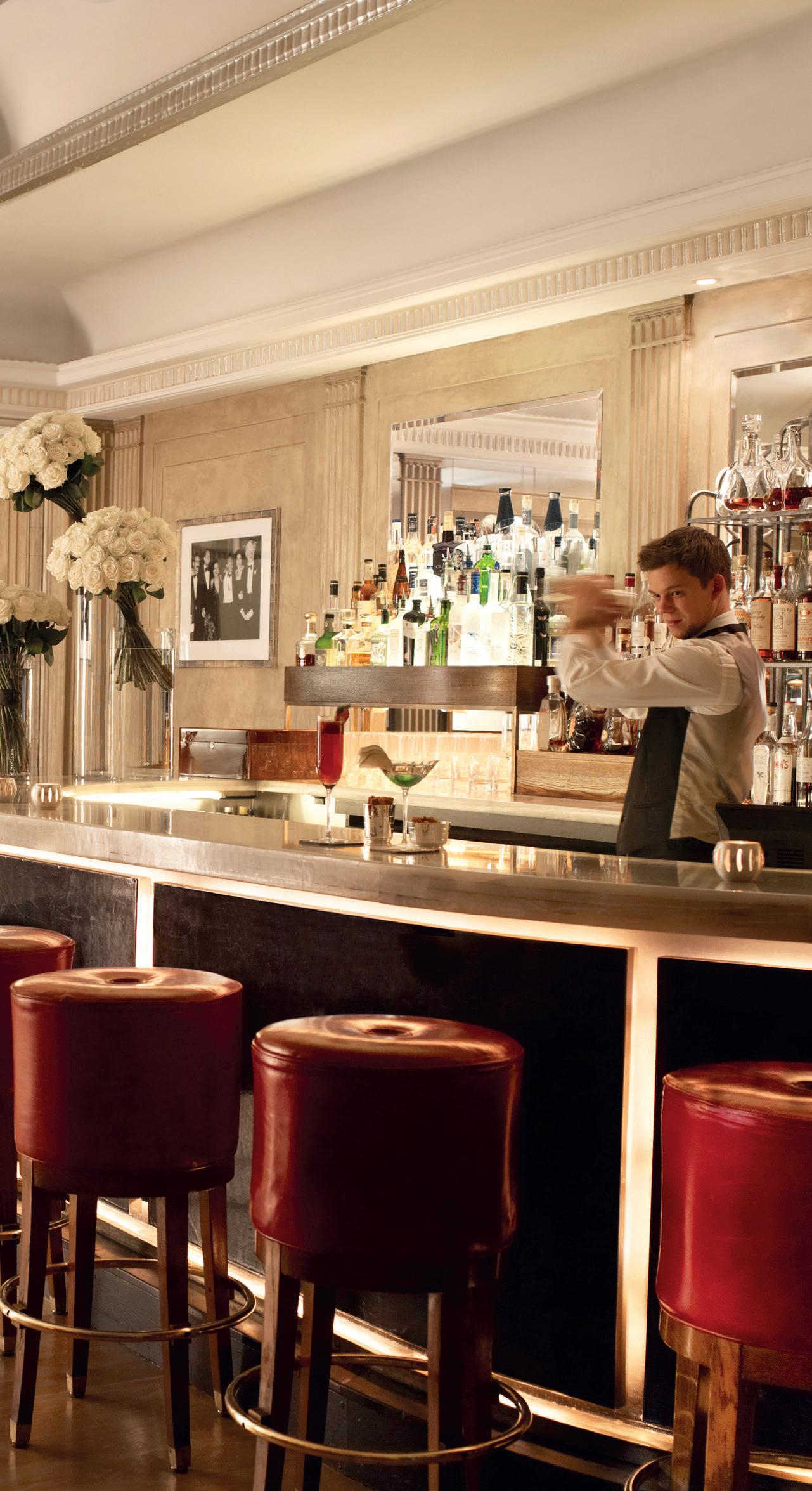
“Today’s top hotel bars choose more than great taste— they choose purpose. Sustainability and provenance are no longer trends—they’re imperatives. Sanpellegrino is leading the way with recyclable packaging, carbon goals, and deep respect for the heritage of S.Pellegrino and Acqua Panna. Not only that, but for us, sustainability also means championing, enhancing, and growing the community of bars, restaurants, and talent that define exceptional hospitality worldwide,” finished Alex.
As hotel bars re-emerge from the shadows of anonymity to become cultural and culinary destinations in their own right, they are redefining what it means to drink and dine away from home.
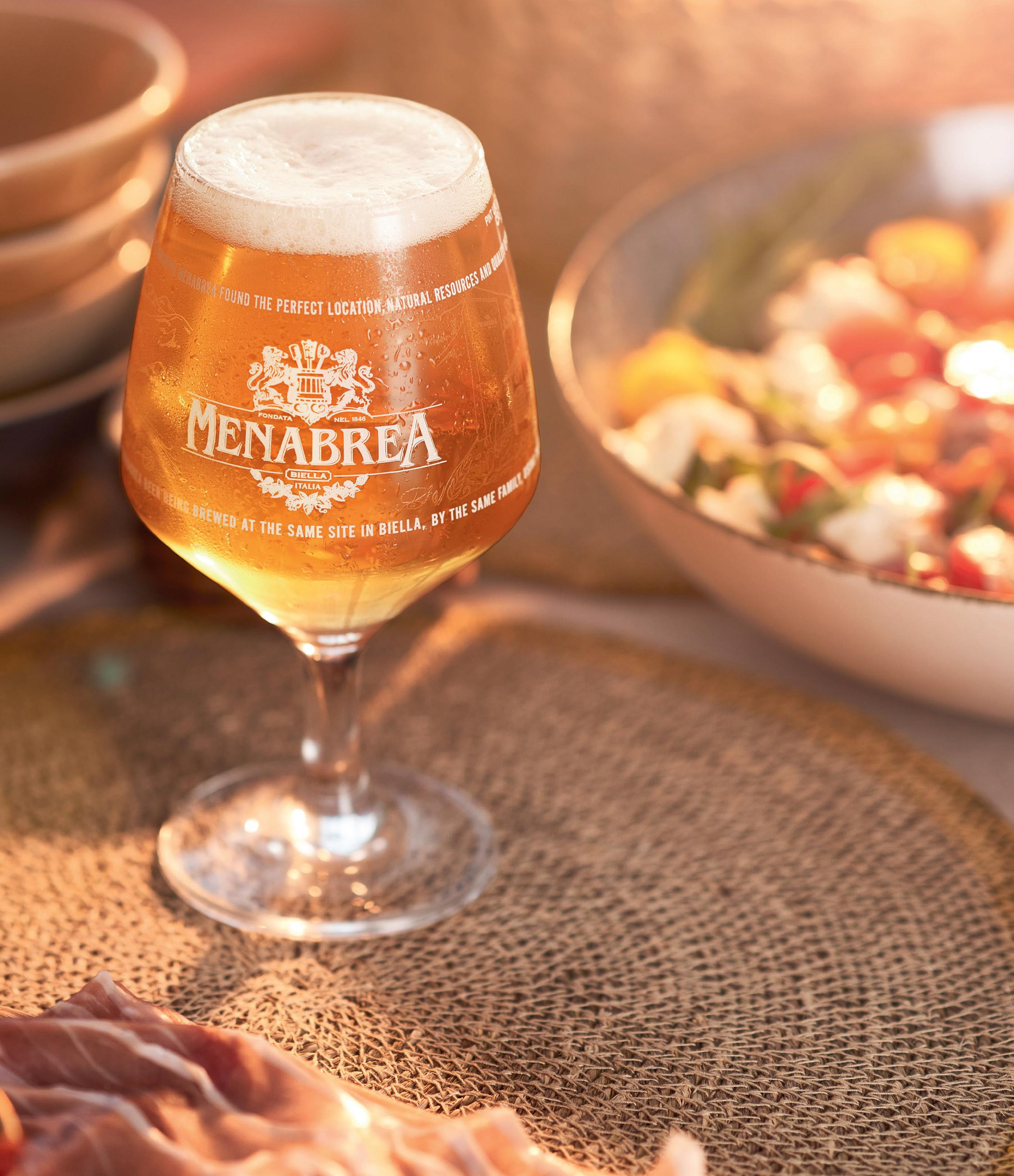
What do you get when you cross three seasoned publicans, great bar chat, and a tech system that’s changing the way hospitality handles draught dispense? A new vodcast by HEINEKEN SmartDispense®
The new vodcast, Three Landlords Walk Into A Bar, shines a light on incredible hospitality operators and in its newly released third episode, focusses on Craig Couper, Product Operations Manager at Atlas Hotel.
Hosted by model, racing enthusiast and publican Jodie Kidd and landlord, Merlin Griffiths of first dates fame, the episode explores what it takes to manage the 60 bars across the Altas estate and how installing draught solution HEINEKEN SmartDispense® is now saving the business up to £160,000 a year.
It’s not Just Pubs: Hotels Need to Ensure their Pints are Perfect too
For a business where up to 54% of bar revenue comes from draught beer, and which sold over 250,000 pints of Cruzcampo® alone last year, Craig Couper is well versed in the importance of getting draught beer and cider service right. On the Three Landlords Walk Into A Bar vodcast, the group discuss why hotels that aren’t yet prioritising their beer quality may want to think twice.
The main reason being that many hotels are competing with local pubs and bars for casual drinking occasions, so offering a high-quality pint can differentiate their service from competitors. More to the point, a well-poured pint contributes to the overall perception of the hotel’s standards and hospitality, vital for businesses that are trying to excel at every phase of a guest journey.
Couper points to the use of SmartDispense® in the Atlas hotel bars as a vital resource in assuring pint quality over 60 sites. “From a guest perspective, the quality of the product [when using SmartDispense®] is outstanding every single time. It’s probably more difficult to pour a bad pint than a good one. You’re going to get a constant temperature for your pints as well which makes a massive difference.”

After an initial trial Craig’s team have now rolled out SmartDispense® across all bars, and when dealing with the estate size of Atlas the benefits really stack up. Couper calculates that since the SmartDispense® install, draught yields have increased by 4-7% which has a massive overall impact. “It’s potentially saving us over £130,000 to £160,000 a year because we’re getting more yield from the product”.
It’s not just in wasted beer and cider where SmartDispense® is saving Atlas Hotels money, SmartDispense® reduces the need for weekly line cleans and simplifies keg changes, for hotel F&B teams juggling breakfast, room service, and evening rushes, it’s not just a draught system — it’s operational relief.

In an industry built on conversation, connection and community, The Three Landlords Walk into a Bar series offers a platform for hoteliers, restauranteurs, and publicans. A platform that enables them to talk about the realities of running a venue in today’s climate, share best practice, and champion the innovative and communal spirit that continues to drive the sector forward.
For hoteliers looking to evolve their offer, deliver consistent quality, boost operational efficiencies and reduce both waste and time in their operations, HEINEKEN SmartDispense® is a compelling proposition. And for those simply seeking inspiration, advice or a moment of camaraderie, this vodcast series is set to deliver that in spades.
The first three episodes of Three Landlords Walk into a Bar are now available to listen to, with two exciting conversations with the Cavern Club and The White Lion still to come. Operators that feature in the series include:
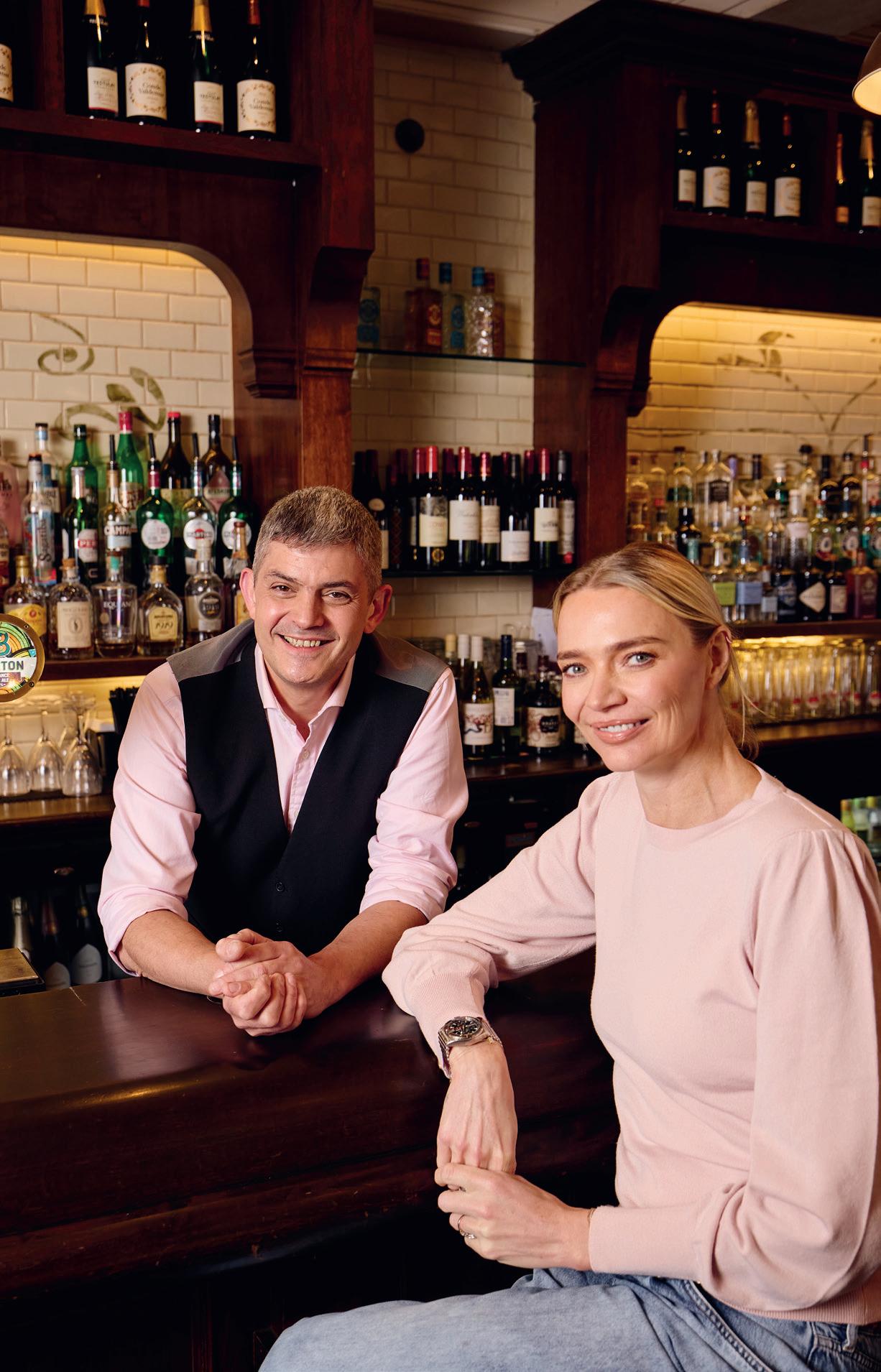
• The landlady of The Gedling Inn in Nottingham who was at the centre of a viral pint giveaway following Nottingham Forests 7-0 win in February
• The founder of The Prince of Peckham, one of London’s most inclusive community hubs
• The product operations manager at Atlas Hotels, discussing how smart tech, bold moves and a focus on quality are transforming the hotel bar game
• The team behind Liverpool’s world famous Cavern Club
• The landlord of The White Lion in Stockport — one of Britain’s oldest and most haunted pubs
Tune in now, available on Apple, Spotify, YouTube or smartdispense.heineken.co.uk. If you’re interested in finding out more about how HEINEKEN SmartDispense® can support your business, sign up at smartdispense.heineken.co.uk/contact-us and a representative will be in touch to come to you and discuss the different solutions HEINEKEN SmartDispense® can provide.
The hotel bar is often the beating heart of guest experience. It is a space where first impressions are formed over welcome drinks and lasting memories created during evening cocktails. Yet behind every spotless wine glass and pristine cocktail coupe lies one of hospitality’s most crucial decisions: choosing the right glasswasher. In this article, Gemma Christie, Business Account Manager at Miele Professional, explores why freshwater dishwashing systems are increasingly becoming the preferred choice for discerning hotel operators.
Hotel bar managers will tell you there’s no room for smudges or lipstick stains on glassware, especially during peak service periods when guest satisfaction is paramount. For hotel operators managing different outlets – from rooftop bars to intimate lounges – the dishwashing technology debate between freshwater and tank systems has implications for both guest experience and operational efficiency.
For years, tank dishwashers have been commonplace in commercial kitchens. These systems store water in a tank and reuse it across multiple wash cycles, topping it up with fresh water for rinsing. While this approach might seem cost-effective for budget-conscious hotel operations,

concerns around hygiene, odour build-up, and cleaning consistency have prompted many in the hospitality industry to reconsider.
Hotel brands invest heavily in maintaining their reputation, and nothing damages guest confidence quite like substandard cleanliness. Unlike tank systems, which clean multiple loads with the same water, freshwater dishwashers use clean water for every cycle. Any bacteria, grease, or residue from one load is flushed away completely before the next begins.
Freshwater systems give bar staff confidence that every glass returns to service spotless, without crosscontamination risks. Miele Professional’s MasterLine range helps hotel operators maintain standards by removing 99.999% of bacteria, even on the five-minute ‘Super Short’ programme. This enables quick table turnaround without compromising quality.
Tank dishwashers appear efficient because they reuse water, but this efficiency can compromise results. Over time, tank water becomes saturated with grease and dirt particles, leading to diminished cleaning performance –particularly problematic for delicate glassware.
Modern freshwater systems balance hygiene with sustainability through short-cycle options and smart water usage features. With intuitive controls available in 32 languages, staff training becomes straightforward.
Freshwater systems built to commercial-grade standards offer durability essential for continuous, high-volume use. Machines tested to withstand up to 28,000 cycles, such as the MasterLine range, provide the reliability hotel operators require.
To discover how Miele Professional’s MasterLine dishwashers can enhance your hotel’s bar operations, visit: miele.co.uk/pro/masterline


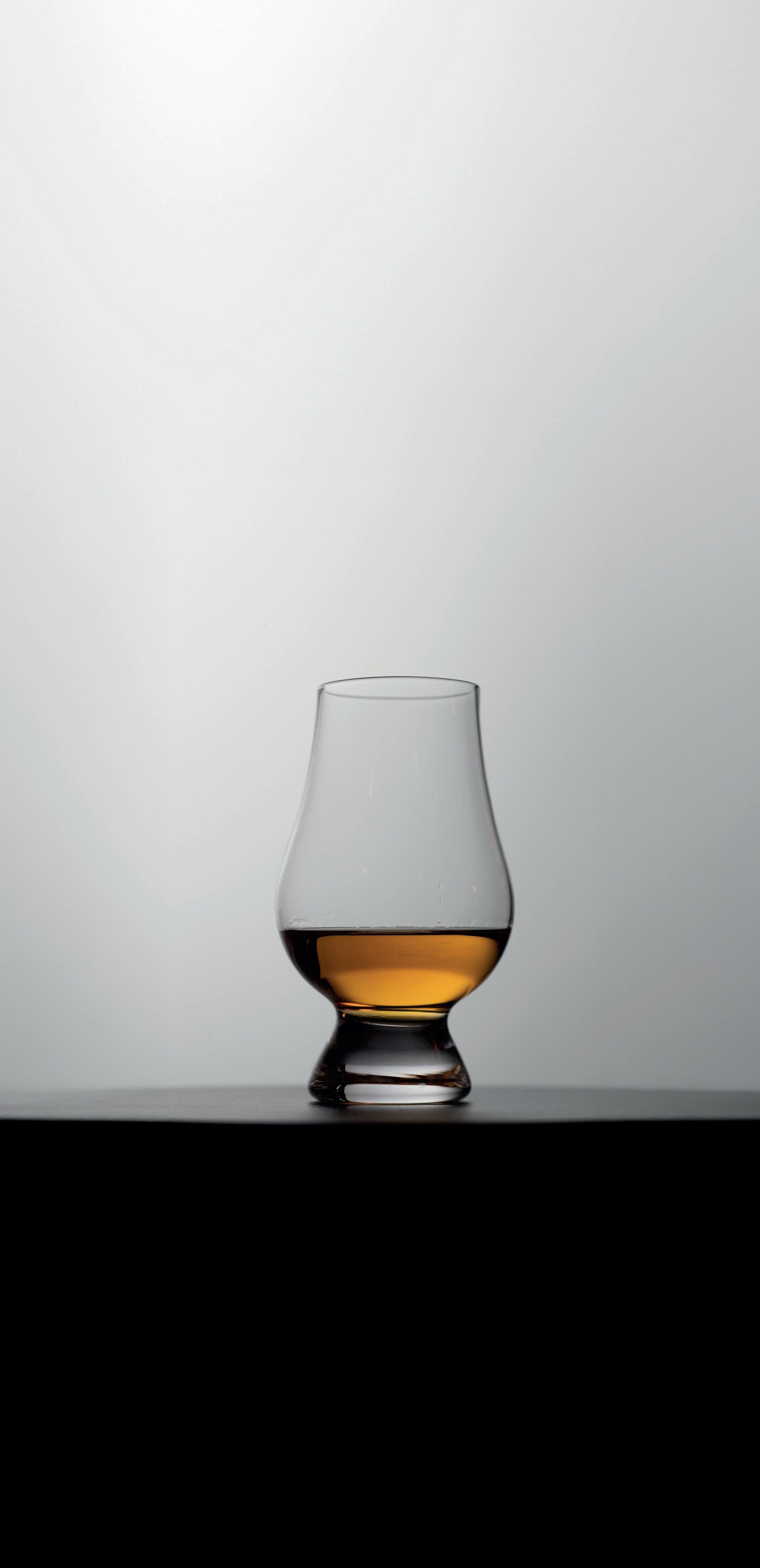
Scan for a branded sample of The Glencairn Glass


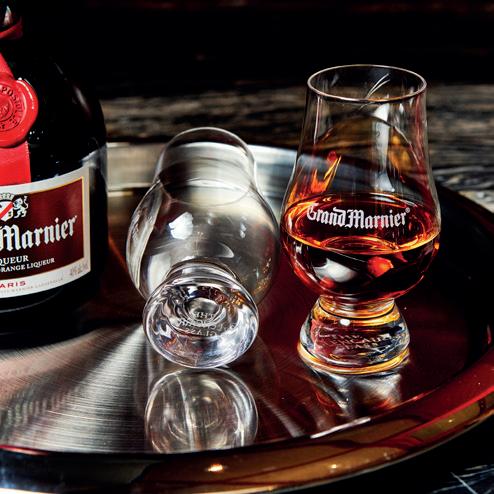
Deliver the perfect events with effortless elegance: The Rise of Premium Ready-To-Drink Cocktails in Hospitality.
As the summer season unfolds with rooftop soirées, seaside weddings, and corporate retreats, the demand for exceptional guest experiences is at an all-time high. In an industry where quality, timing, and taste are everything, Ready-To-Drink (RTD) cocktails are stepping into the spotlight - not just as a convenience, but as a cornerstone of elevated, effortless hospitality.
Once associated with picnics and garden parties, chosen for ease rather than excellence, RTD cocktails have seen an impressive transformation. Today’s offerings are mixologist-crafted, spirit-forward, and designed with both aesthetics and taste in mind. For venues and event planners, this evolution represents far more than a passing trend, it’s a strategic innovation redefining how premium experiences are delivered at scale.
From rooftop lounges buzzing with summer energy to al fresco garden parties and beachfront celebrations, the season brings a packed calendar of high-volume events. The challenge? Serving hundreds of guests with consistency, speed, and style - especially when there’s a need for quality.
This is where ready-to-drink cocktails shine. With no muddling, shaking, or mixing required, they allow staff to serve perfectly balanced Margaritas, Negronis, or Palomas in seconds. The result is reduced wait times, seamless flow at the bar, and more time spent enjoying the moment, all without sacrificing the artisanal touch today’s discerning guests expect.
In hospitality, every second and every detail counts. RTD cocktails eliminate the bottlenecks of traditional bar service, allowing teams to operate more efficiently during high-pressure windows. Whether during the cocktail hour of a wedding or a mid-summer media launch event. They also deliver operational benefits behind the scenes: less waste, streamlined inventory, and greater predictability in planning. For large-scale venues and boutique experiences alike, this translates to higher margins and smoother operations. In a season where staff shortages and tight timelines are common, such efficiency isn’t just helpful, it’s transformative.
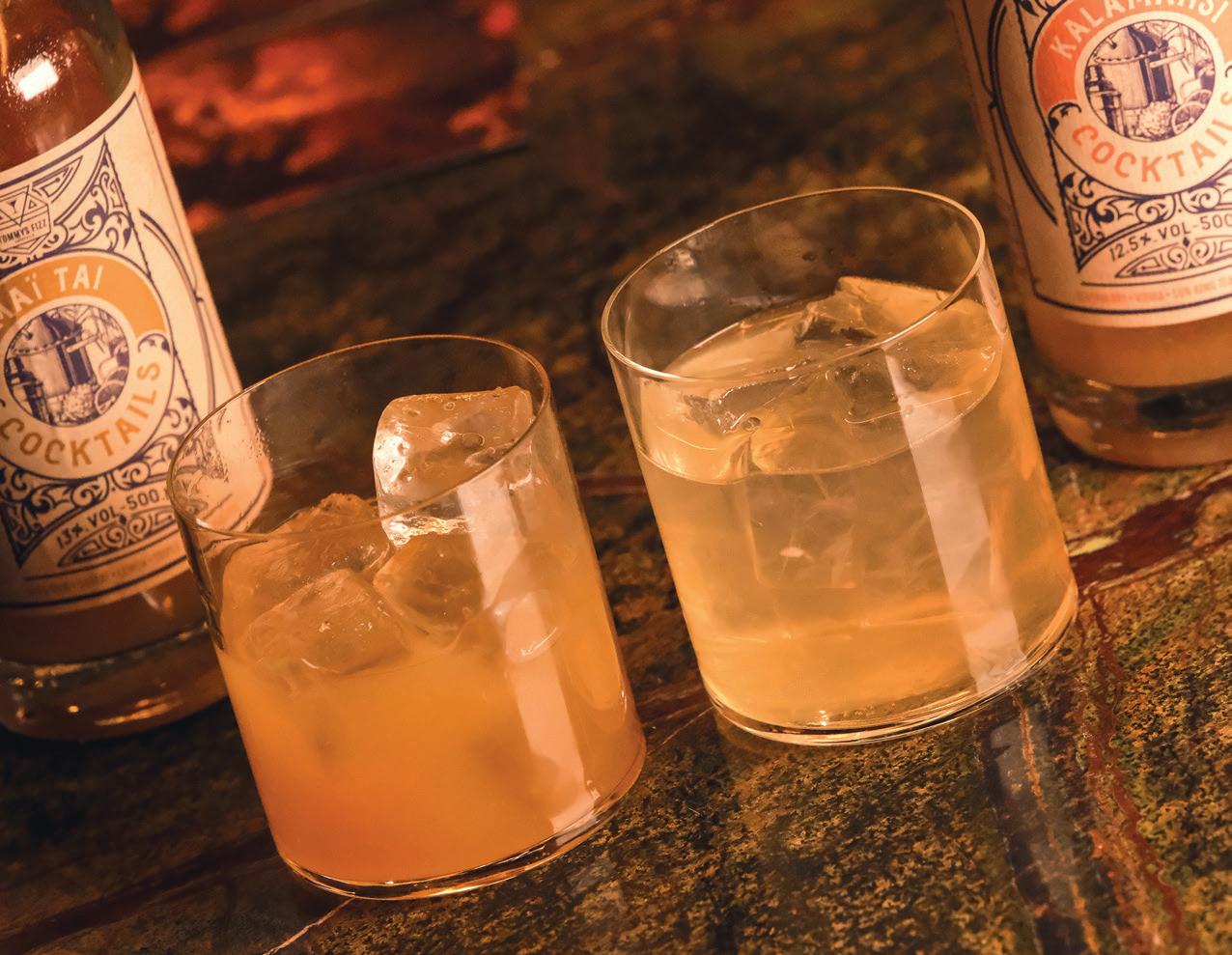
RTD cocktails aren’t just practical, they’re also a canvas for brand storytelling. With elegant packaging, locally sourced ingredients, and unique flavour profiles, they offer an opportunity to enhance the overall guest journey. Whether served from a bespoke cart at a VIP event or handed out as a welcome drink at a poolside party, each bottle becomes part of the event’s narrative.
Moreover, their consistency ensures every guest receives the same premium pour, from the first toast to the final cheers of the night - a vital component for brands looking to impress at every touchpoint.
As the industry leans further into premium and personalised experiences, RTD cocktails are no longer a clever addition, they’re an essential asset. They empower teams to focus on what truly matters: connection, service, and atmosphere.
Hospitality is about creating unforgettable moments. With premium RTDs, venues are not cutting corners, they’re redefining what excellence looks like in the modern age. This summer and beyond, the smartest hosts will be those who combine innovation with intimacy, and flavour with function.
mixologyexpress.com
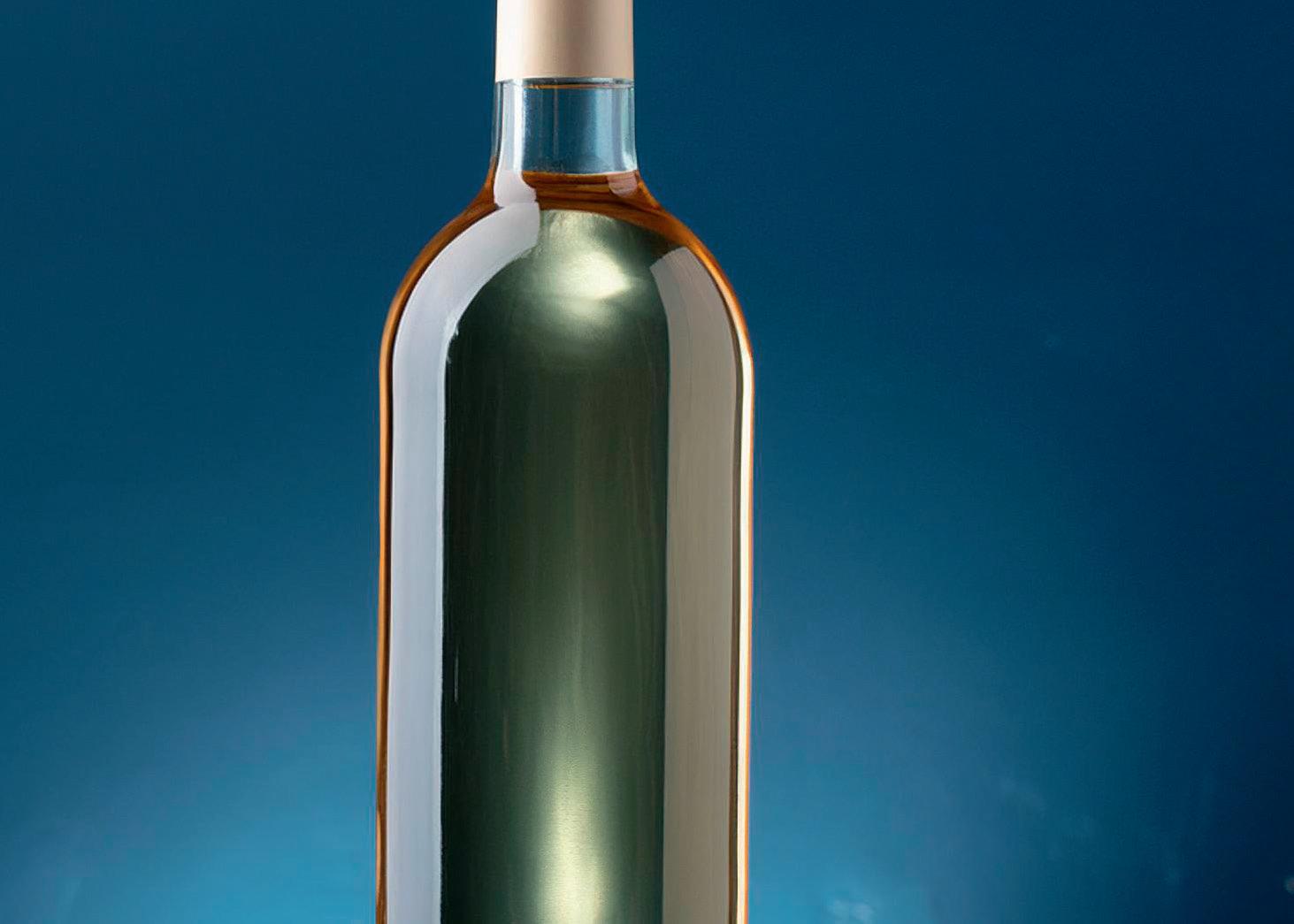
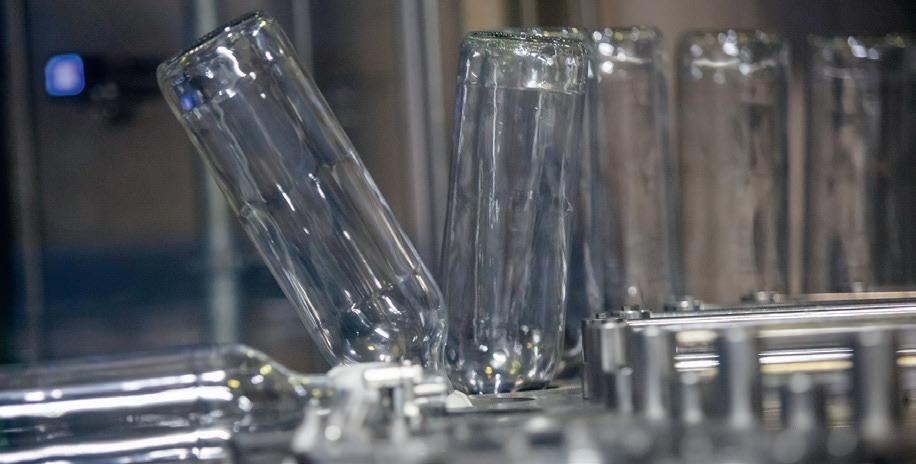

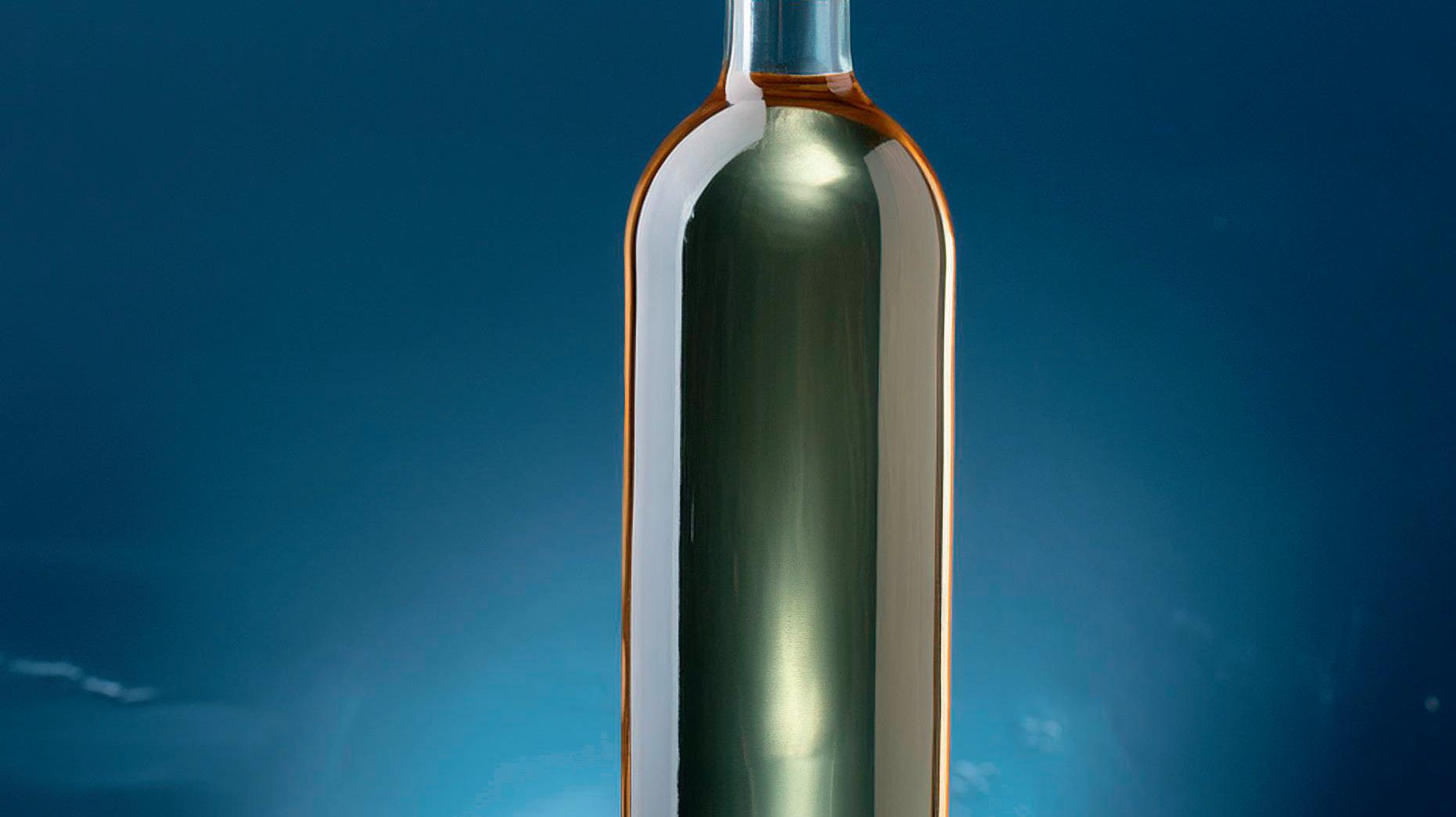
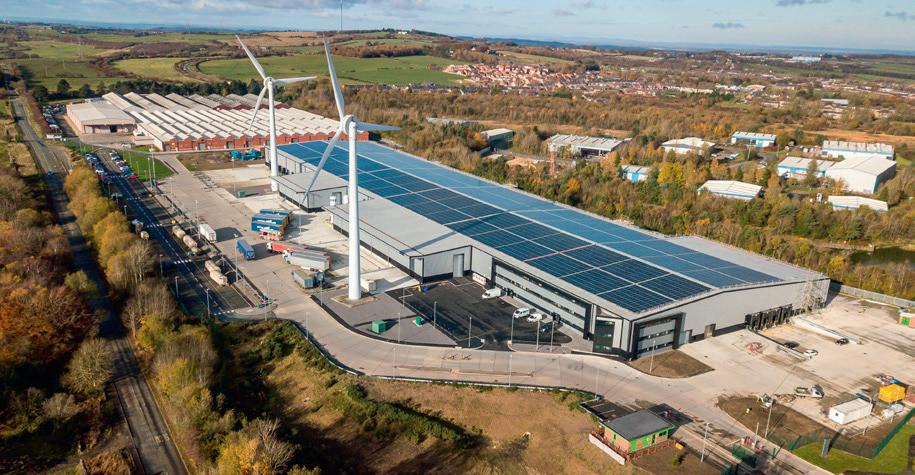

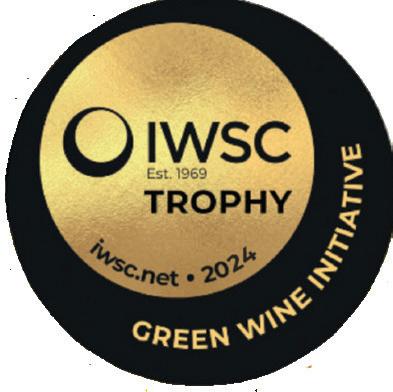


As the summer season approaches, hospitality spaces are evolving to meet the changing desires of today’s guest - seeking not just refreshments, but immersive, visually captivating experiences. In this exclusive conversation, Helio Andrade, Director of Food & Beverage at The Langham, London, shares his insights into the key food and drink trends shaping the industry this summer and how London Essence’s range allows the hotel to explore these throughout its bar menus.
What are your predictions for hospitality trends this summer within the food and drinks space, and what will guests be looking for?
During the summer months we tend to see an increase in chef-led pop-ups and collaborations around the country, I believe this year will be no different. Guests will be looking at unique spaces such as rooftops and gardens and perhaps unexpected venues, such as galleries or museums, where they can experience something unique and exciting. There will be a focus on experience driven activations for sure.
The no and low alcohol sector will continue to grow especially with the wellness focused guests. London Essence’s range of Crafted Sodas allows us to explore more creative non-alcoholic cocktails through a broad range of flavours including Pink Grapefruit and White Peach & Jasmine, and sophisticated spritz alternatives. We cannot predict the weather, but summer months in the UK are getting warmer and long warm days often call for a long refreshing drink.
Are there any upcoming activations, partnerships, or seasonal changes to your food and drink menus that you’re especially excited about this summer?
Absolutely. At Artesian bar, we have a newly launched cocktail menu where London Essence’s range has helped us boost both our alcoholic and non-alcoholic offering, with the ‘Salsify’ which provides an exciting twist on the classic Gin & Tonic and incorporates London Essence Indian Tonic Water. We also have a delicious non-alcoholic alternative with a Paloma-inspired ‘Currant’ serve, which uses London Essence’s bright and fruity Raspberry & Rose Crafted Soda. To complement this, we have just started a collaboration with Chef Chet Sharma of Mayfair’s BiBi at Artesian bar, which brings a contemporary Indian flair to the bar, featuring dishes like aged N25 caviar with coconut shakargandi blinis and kasoori methi chicken pakora.
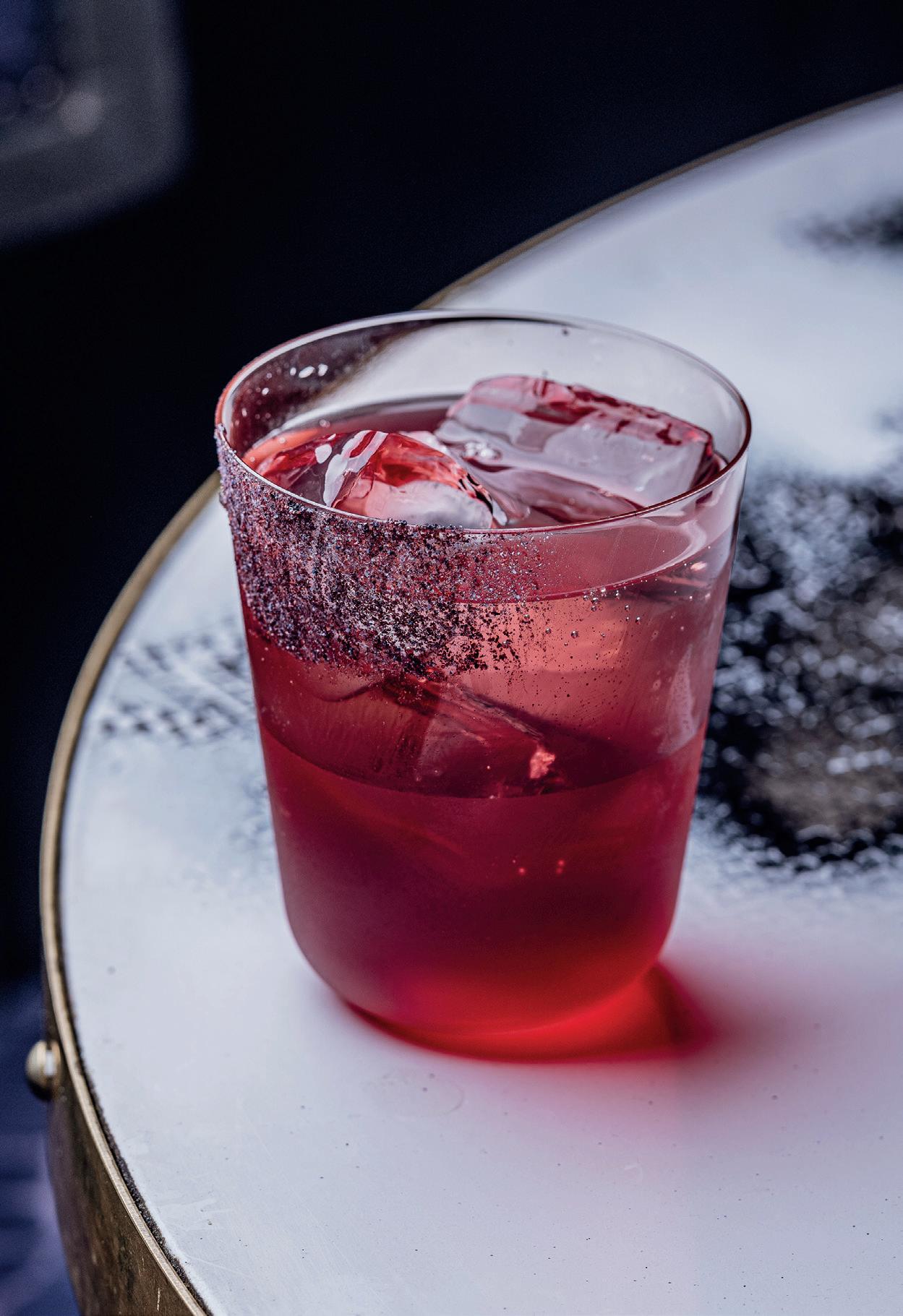

At Palm Court, the birthplace of afternoon tea, we celebrate the Langham, London’s 160th anniversary with a special commemorative tea service. This offering combines blends of sweet and savoury favourites from the 19th and 20th centuries, reimagined in a contemporary way, with seasonal ingredients.
The Langham is known for its elegance, so how important is the visual experience when it comes to food and drink, and how do you bring that to life across your menus and serving styles?
The visual experience is extremely important. The food and drink quality remains absolutely essential of course, and it is, as we use the very best products. The attention to detail from our team is incredible, with impressive cocktails at Artesian with precision cut garnishes, edible elements, or smoke. Modern diners are visually led and, for many, the aesthetic of the dish or drink is as important as its taste. We eat and drink with our eyes first, plus in the age of social media, dishes and drinks must be camera ready. With that in mind, we have custom-made chinaware in Palm Court to complement the menu’s elegance, while at Artesian, cocktails are served in specially designed glassware. London Essence’s range has strong visual appeal with its colourful flavours and distinctive glass bottles, which elevate our cocktails and spritz serves.
How do drinking preferences vary throughout the day at The Langham, and how does your menu adapt to cater to different guest needs - from early arrivals to evening diners and overnight stays?
The Langham’s offering responds well to the early risers and the brunch time lovers with a fine selection of beverages available all day, and also 24 hours through our room service for all our resident guests.
Drinking preferences certainly vary throughout the day. In the morning you see guests wanting speciality coffee, teas, fresh pressed juices, smoothies and health forward drinks as they are seeking energy, focus and hydration. As we enter the evening, lighter and more elegant serves are preferred. Guests will often go for low ABV refreshers or alcohol free and botanical sodas, such as London Essence’s White Peach & Jasmine Soda, which we offer as a standalone adult soft drink.
In the evening, we see more indulgence and this is where our cocktail menus alongside champagne and wine are opted for, and our guests can experiment due to London Essence’s wide range of products and innovative flavour combinations that allows them to try something a little bit different.
londonessenceco.com
As the modern hotel bar continues to evolve, blending timeless elegance with bold innovation, Disaronno remains a distinctive and dynamic player in the mixology space. Known for its unmistakable almond flavour and rich Italian heritage, Disaronno Originale is both a nostalgic favourite and a versatile ingredient for forwardthinking bartenders. We sat down with Annie Ingram, Prestige Trade Marketing Manager at Disaronno International UK, to explore how this iconic liqueur is finding new life in contemporary hotel bar experiences — from rooftop spritzes to creative cocktail menus in world-class lounges.

Disaronno is known for its distinctive flavour and heritage—how do you see it fitting into the modern hotel bar experience, where guests are seeking both familiarity and innovation?
Disaronno Originale, the world’s favourite Italian liqueur and the UK’s No.1 non-cream liqueur brand, is a staple in any well-rounded hotel bar. Its recognisable almond flavour makes it ideal for familiar favourites like the Amaretto Sour and the Godfather - drinks that guests know and love. At the same time, Disaronno’s unique and complex flavour profile allows bartenders to push creative boundaries, pairing it with a variety of spirits and mixers to craft modern, innovative twists on classic cocktails. This versatility makes it perfectly suited to today’s hotel bar experience, where guests seek both comfort in the familiar and excitement in the new.
In terms of versatility, how does Disaronno adapt to different hotel bar concepts, from classic lounges to rooftop venues or poolside settings?
Its sweet and nutty profile pairs well with a wide range of ingredients, making it a great base for many classic and creative cocktails. Guests can enjoy Disaronno in elevated Champagne cocktail serves in classic lounges, for example APPLE in The Langham’s Artesian Bar’s ULTIMO menu. Or you could serve something different like a Disaronno Spritz, a low-alcohol drink with a distinct combining Disaronno with fizzy soda bubbles and lemon juice for a refreshing and thirst-quenching cocktail – perfect in rooftop or poolside settings.
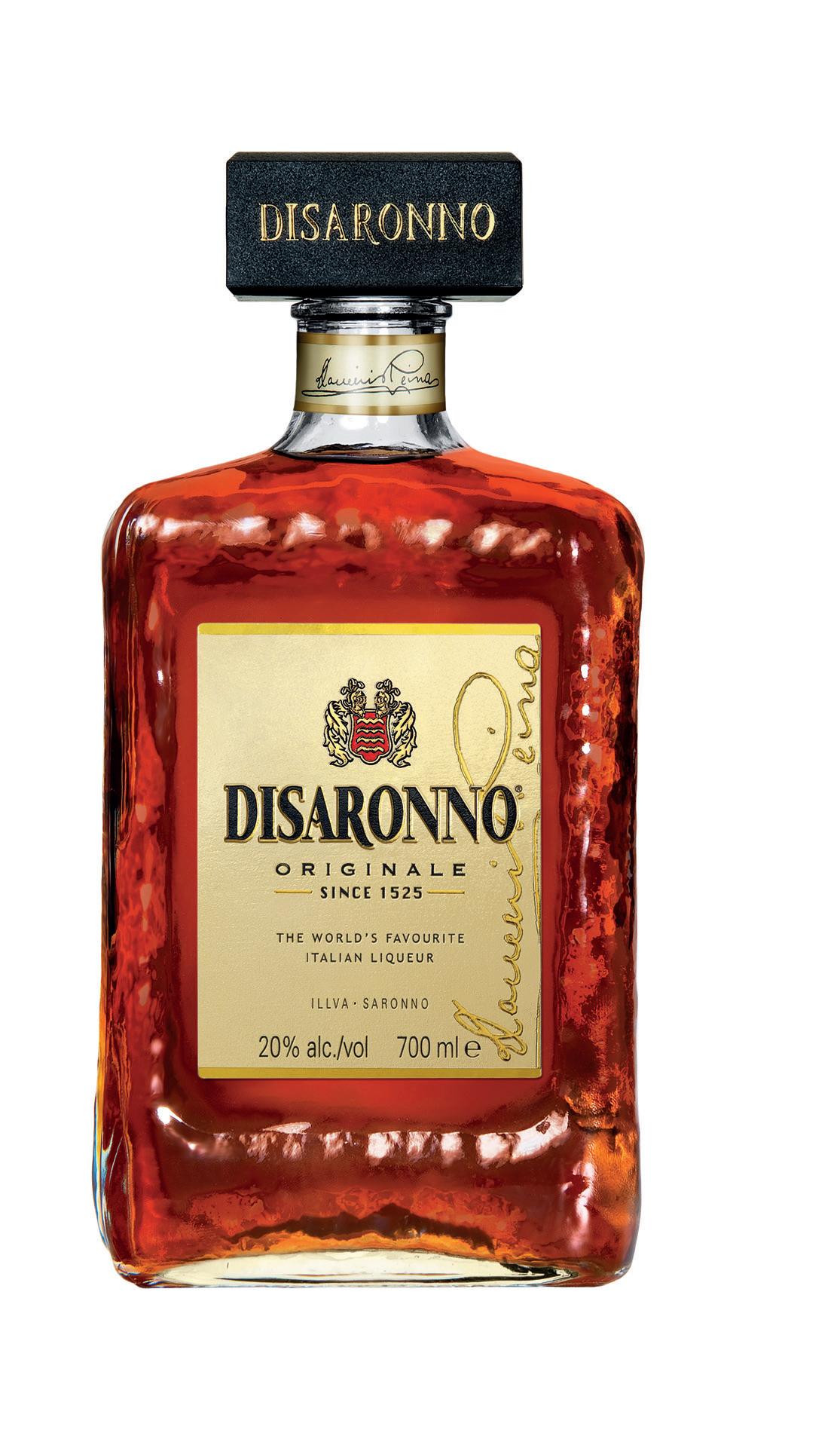

Fitz’s Bar at Kimpton Fitzroy London
same time, Disaronno’s unique almond profile and smooth finish offer bartenders a creative base for innovation, allowing them to craft modern twists and regionally inspired pairings.
Its broad appeal also makes it ideal for customisation - whether in low-ABV creations, dessert-style drinks, or theatrical presentations.
disaronno.com
How does Disaronno align with current trends in hospitality and mixology, particularly as hotel bars strive to offer memorable, locally tailored experiences?
Disaronno aligns seamlessly with today’s hospitality and mixology trends by offering both familiarity and versatility - key qualities as hotel bars aim to deliver memorable, locally tailored experiences. Its instantly recognisable flavour and rich Italian heritage make it a comforting, premium choice for guests seeking classic cocktails like the Amaretto Sour or Godfather. At the

Disaronno Sour
Ingredients
50ml Disaronno Originale
25ml Fresh lemon juice
5ml Sugar syrup
Egg white (optional)
Method
Shake all the ingredients with ice. Garnish with a slice of lemon
As summer 2025 arrives, Nespresso Professional is blending Italian-inspired flavours with the latest coffee trends and versatile recipes through the innovations that are Amaretti Decaffeinato, and the return of the bold Ice Intenso.
With summer’s arrival bringing vibrant hues and warm temperatures, coffee enthusiasts across the UK are in search of refreshing and flavourful experiences without the caffeine kick. This season, Nespresso Professional invites you to enjoy the taste of Italy with Amaretti Decaffeinato – an almond-infused decaf coffee perfect for any occasion, at any time of day.
Inspired by Italy’s beloved amaretti biscuit, Amaretti Decaffeinato brings the taste of authentic Italian flavours. Made from 100% decaffeinated Arabica beans, sustainably sourced from Colombia and Brazil, this blend offers a touch of Italy’s culinary traditions. Enjoy the sweet almond and gentle biscuit notes for a comforting Italian experience.
As the demand for decaffeinated coffee that doesn’t compromise on flavour increases, this blend demonstrates that you can go caffeine-free without sacrificing taste. Whether you’re savouring a hot cup as part of your morning routine or concocting a vibrant Almond Cherry Cooler to beat the midday heat, this coffee offers exceptional versatility.
In addition to this new decaf option, summer 2025 also sees the return of a seasonal favourite – Ice Intenso. Designed with summer in mind, this bold creation is ideal for all iced coffee recipes. Picture the satisfaction of bold, roasted cereal flavours in creamy iced lattes or simply poured over ice for a refreshing experience.
Nespresso Professional is committed to delivering both exceptional taste and excellent sustainable credentials. Both Amaretti Decaffeinato and Ice Intenso are part of Nespresso’s Creations range, aligning with the company’s AAA Sustainable Quality™ Program, which is in partnership with over 168,000 farmers worldwide to help restore landscapes, enhance farmers’ livelihoods and protect the high-quality coffee of today for future generations.
As a leader in out-of-home coffee solutions, Nespresso Professional combines innovation with a commitment to consumer satisfaction. With its B Corp™ certification

achieved in 2022, Nespresso underscores its dedication to social and environmental responsibility.
Let Nespresso Professional’s summer 2025 lineup enhance your coffee experience. Whether crafting a chilled treat or savouring a flavorful decaf, Nespresso ensures every sip is about quality, taste, and sustainable practices.
For more information and to incorporate Amaretti Decaffeinato and Ice Intenso into your coffee solutions, visit Nespresso Professional’s website.
Experience Italy’s charm and Nespresso Professional’s innovation this summer—where taste is timeless, and every moment is a coffee moment. nespresso.com/professional
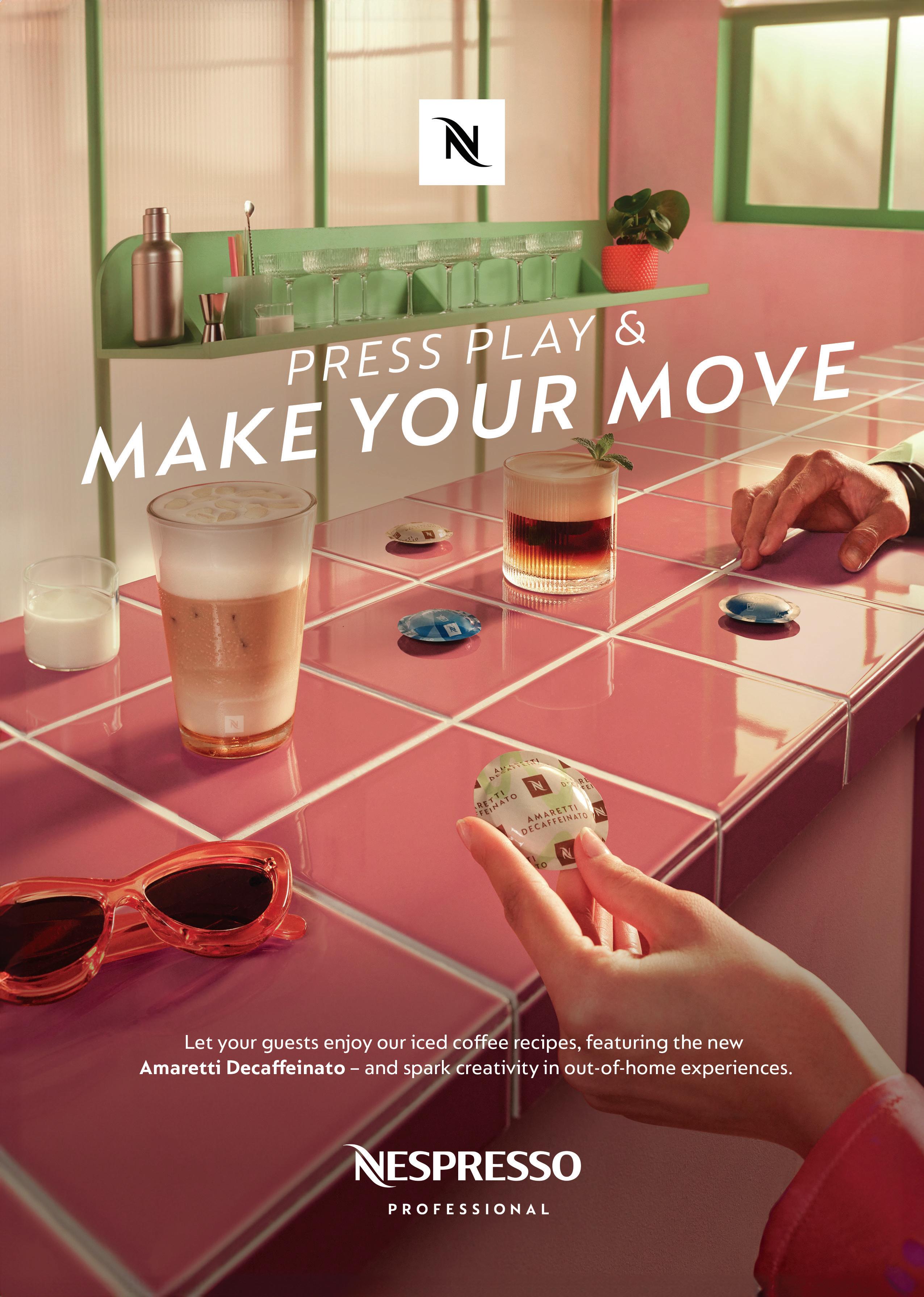
The traditional hotel bar is undergoing a stylish transformation— pairing craft cocktails with curated, premium snacks to deliver a more elevated guest experience. As part of this shift, iconic brands like Pringles and Cheez-It are finding a new home among the artisanal spirits and sophisticated settings of today’s boutique and luxury hotel bars. In this interview with the team at Kellanova, we explore how these beloved snacks are being strategically positioned to align with upscale hospitality trends.

How do Pringles/Cheez-It product offerings align with the evolving, upscale experiences found in today’s revitalised hotel bars?
Pringles and Cheez-It are a natural fit for today’s elevated hotel bar scene. Sleek, portioned packaging and bold flavour profiles allow them to sit seamlessly alongside curated drinks menus.
Pringles’ stackable format, taking up 41% less space than a standard crisp bag, is ideal for high-visibility countertop displays, with exciting flavour options such as Sour Cream & Onion and Texas Barbecue offering guests the opportunity to try something new. Cheez-It, with its distinctive bite-sized crunch and real cheese flavour, delivers a mouth-watering yet refined snacking experience - perfect for pairing with inventive drinks.
This snack duo reflects Kellanova’s broader snacking strategy: offering flexible, craveable options that drive impulse and enhance the guest experience – whether they’re at the hotel bar for a quick drink or settling in for a longer stay.
Have you seen an increase in demand from boutique or luxury hotels looking to offer premium or nostalgic snack pairings alongside craft cocktails and why do you think this is?
Yes – generally we’re noticing a trend across the hospitality sector where premium and nostalgic snacks are being used to elevate high-end drinking experiences. Today’s travellers are seeking to merge old favourites with new experiences, and when relating this to snacking in premium environments, it’s about delivering comfort and quality with a refined twist¹.
As a long-time household favourite, Pringles taps into that emotional connection. Similarly, Cheez-It, already very popular in the US, is gaining momentum in the UK thanks to its bold flavour and real cheese credentials, achieving £12.2m value sales after just 31 weeks in the market².
Familiarity builds trust, while bold flavour profiles keep the experience fresh and exciting - an ideal combination for high-end hospitality!
Is there a strategic approach behind how your brands are being positioned in hotel minibars or bar snack menus to compliment the elevated guest experience?
Absolutely - with 70% of snacking purchases made on impulse, brand visibility is key³. Whether through curated minibar selections or inclusion in bar menus, we focus on delivering high-quality snacks that align with the increasingly premium atmosphere of today’s hotel bars. At the end of the day, no matter the environment, consumers

will typically choose the brands they recognise and whose quality will add to their experience as a whole⁴.
With the growing competition in hospitality and changing consumer snacking habits, what are some effective strategies for hotel bars to make snacks more visible and appealing to guests?
Strategic placement is everything. Positioning snacks like Pringles and Cheez-It at eye level and within reach of guests, such as on bar countertops or near drink service areas drives spontaneous interest. To support this, we offer free POS materials through our Kellogg’s Vantage website, aiming to elevate the look of your bar and spotlight the trusted brands that guests count on. Also, a little upselling can make all the difference: especially when staff recommend the perfect snack to complement a guest’s drink choice!
1 Amadeus Travel Trends, 2024.
2 Circana I Total GB I Total Crisps I Value Sales I Data since launch to 8th Feb 25.
3 Lumina Intelligence Convenience Tracking Programme; 52 WE 08/12/2024.
4 Deloitte UK Travel, 2024.
“Today’s travellers are seeking to merge old favourites with new experiences.”
Jane Pendlebury, CEO of
Hospitality has always been – and will always be – about people. It’s about connection and warmth to deliver a service that feels personal rather than prescribed. But in the modern world, technology is playing an increasingly vital role behind the scenes. When deployed thoughtfully, it enables that human touch to flourish where it matters most.
The beauty of today’s technology lies in its potential to streamline back-office functions so hospitality professionals can focus on doing what they do best – delighting guests. Whether it’s replying to guests’ frequently asked questions – such as checking checkout times, or automated revenue management, AIgenerated forecasting, seamless rota scheduling and more, technology is lifting the burden of repetitive tasks. This frees up valuable time and resources, especially at a time when recruitment and retention remain a challenge across the industry.
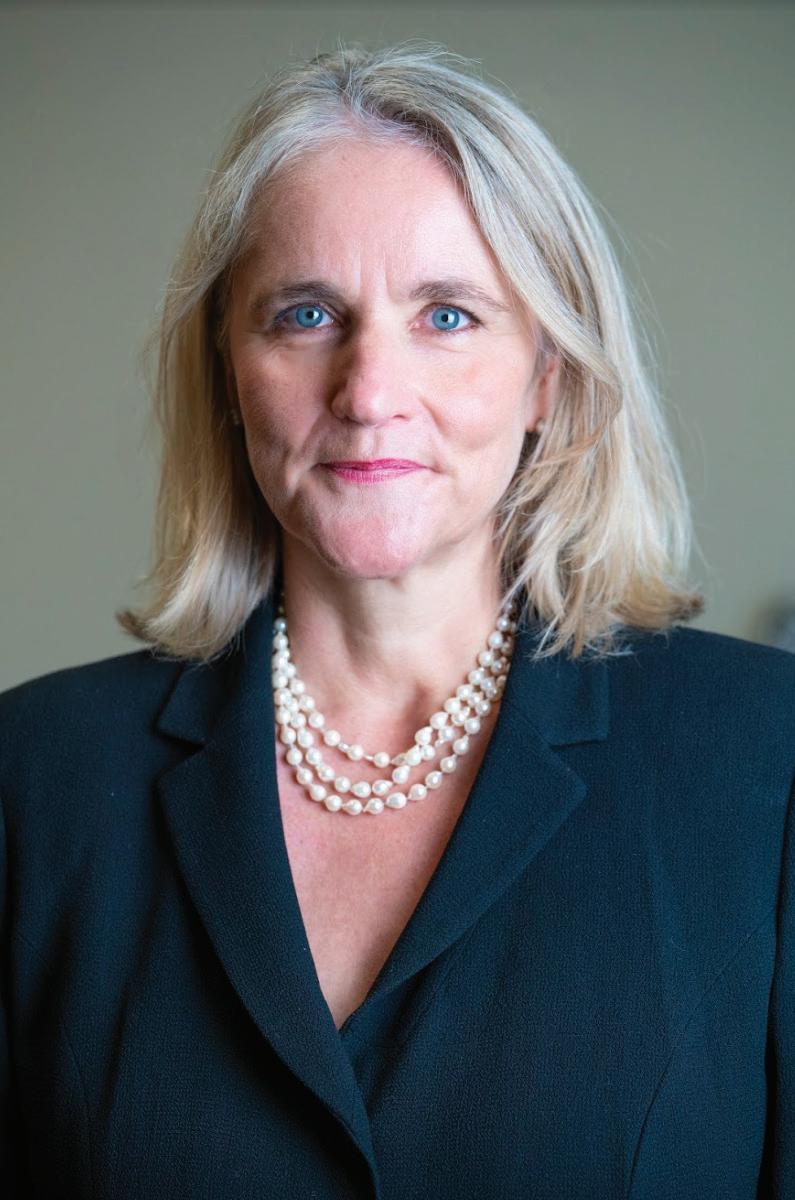
The evolution of artificial intelligence has accelerated this shift. What once required hours of spreadsheet trawling can, in many instances, now be achieved with a few clicks, delivering not only speed but insights that would be almost impossible to gather manually. But the real magic happens when that data is used to guide decisions – not simply left sitting in a dashboard. Technology is only powerful when acted upon.
The guest-facing side of hospitality is also being shaped by AI – from highly responsive chatbots to digital concierges. In many cases, guests appreciate the speed and ease these tools offer, especially for functional interactions like booking queries or room service requests. Some bots are now so sophisticated they can hold impressively human-like conversations. But we must be cautious not
to let guests fall into a digital loop with no escape route. In luxury in particular, choice is key. Guests should always have the option to speak to a real person if they want to – that’s what true hospitality is about. Striking the right balance is critical. Just because something can be automated doesn’t mean it should be. Each property must decide where technology adds value – not only to their operations but to the guest experience. It’s about thoughtful integration, not blind adoption.
One of the big opportunities I see lies in giving teams more freedom to focus on moments of impact. A welltrained member of staff who isn’t tied up with admin can spot a birthday in the diary and organise a surprise cake. They can spend time chatting with a couple celebrating their anniversary, offering recommendations and creating memories. These are the moments that make guests return – and tell others.
Of course, this doesn’t happen by accident. Operators need to invest in the right tech stack for their unique brand and clientele. They must ensure their teams are trained not just to use the systems, but to interpret and act on the information they provide. It’s about empowering staff, not replacing them.
Ultimately, the most successful hotels will be those that blend the best of both worlds – smart systems running quietly in the background, and brilliant humans delivering exceptional service front of house. Technology might be the enabler, but it’s people who make hospitality truly special. Let’s make sure the two work hand in hand.
Jane Pendlebury is CEO of HOSPA – the Hospitality Professionals Association. For more information visit www.hospa.org.


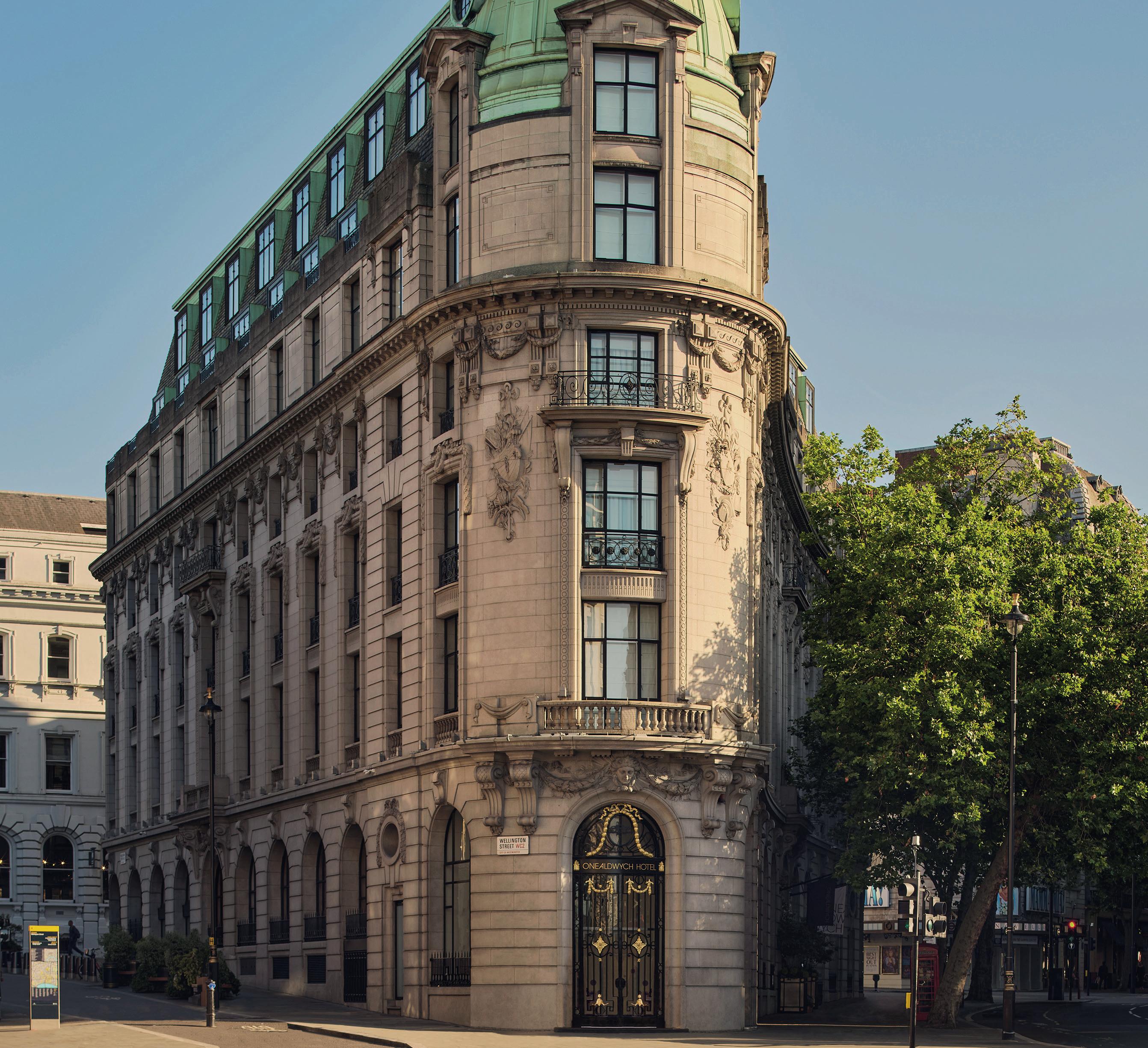
Tucked within London’s buzzing Covent Garden, One Aldwych offers a rare combination of heritage, independent spirit, and modern luxury and this July features as our Hotel of the Month.

Housed in a distinctive Edwardian triangular building that once served as the headquarters of the Morning Post newspaper, this privately-owned hotel has long stood apart in a city teeming with fivestar addresses. But, in 2024, it took that distinction even further: One Aldwych became the first and only five-star hotel in London to earn B Corp™ certification — placing sustainability, community and purpose firmly at the core of its operations.
Fresh from a stylish enhancement unveiled in early 2025, the hotel has reopened with renewed energy and vision. Long-time design collaborators Fabled Studio were invited back to reimagine the hotel’s iconic spaces, layering modern interventions onto its storied bones. The Lobby Bar, the heart of the hotel, now boasts a bold, sculptural ceiling installation — a sweeping, organic form in metallic textures that ripples overhead. It’s a space that is at once dramatic and inviting, enriched by the launch of a Gallery cocktail list inspired by pieces from the hotel’s expansive art collection of over 400 works.
Art, in fact, is embedded in the DNA of One Aldwych. From its carefully curated public spaces to original artworks in every guest room and suite, the hotel acts as a living gallery that champions both established and emerging artists. This creative sensibility flows seamlessly into the guest experience.
The hotel’s 86 rooms and 16 suites blend contemporary British design with comfort and quiet luxury. All furnishings are British-made, with thoughtful details like handwoven Scottish throws and bath products crafted from natural floral oils on a Kent farm. Two of the hotel’s Signature Suites — The Somerset and The Waterloo Bridge — have been updated with styling touches by American designer Jonathan Adler, bringing eclectic elegance and personality to these already distinctive spaces. The Somerset Suite now also caters to family travel, converting easily into a four-bedroom residence.
Dining at One Aldwych is a celebration of British ingredients and independent producers. Indigo, the hotel’s acclaimed neighbourhood restaurant, has been reenergised with subtle yet striking design updates, including deep-set English oak window frames and textured wall

coverings that nod to the building’s heritage. Executive Chef Dominic Teague’s menus follow the seasons and reflect the best of British land and sea — from hand-picked growers to artisan butchers and coastal fisheries.
Sustainability isn’t just a feature at One Aldwych; it’s a philosophy. The hotel’s B Corp certification is recognition of its 26-year journey to reduce its environmental and social impact. Initiatives range from long-standing relationships with local suppliers to reduce food miles, to an in-house water filtration system and energy-saving measures that cut annual consumption by 5%. The hotel even monitors its carbon footprint through a bespoke tracking system. Meanwhile, its inclusive, idea-driven workplace culture and local charitable partnerships further demonstrate its role as a community steward as much as a hospitality leader.
Guests looking for wellness and escape need look no further than the hotel’s Health Club, which offers an 18-metre chlorine-free pool, sauna, steam room, and fully equipped gym with Peloton bikes and Technogym equipment. For a more whimsical kind of retreat, One Aldwych’s beloved Charlie and the Chocolate Factory afternoon tea — a sensory journey of floating bubbles, factory clinks, and scrumdiddlyumptious treats — remains a hit with children and grown-ups alike.
Outside, the hotel’s Covent Garden location puts guests within walking distance of more than 20 West End theatres, the Royal Opera House, Somerset House, and iconic London landmarks. The hotel’s dedicated Curators — a team of local cultural insiders — offer behind-the-scenes experiences ranging from music tours of Soho to backstage access at the Donmar Warehouse.
Managing Director Janine Marshall puts it best: “These enhancements reflect our desire to evolve with our guests, offering deeply personal, design-led experiences grounded in purpose. We want our design to reflect our independence — as a brand and as a building.”
One Aldwych is more than a stylish place to stay — it’s a statement of how a modern hotel can honour its heritage while pushing forward with integrity and intention. For travellers seeking elegance with substance, culture with conscience, and comfort with character, One Aldwych is truly London at its independent best.


Belu share their thoughts on making the most sustainable choice.

At Belu, when it comes to water, we’re experts. With more than 20 years’ experience, supplying everything from bottled mineral water to filtration systems and now taking steps towards our first canned water – we’re fully immersed. One of the questions we are often asked by our hospitality partners is: “What’s the most sustainable way to serve water?” And our answer? It depends (it really does). Making the most sustainable and sensible water choice depends on more than just comparing carbon footprints. Take time to weigh up your format options and your potential suppliers, because your water choice can impact your ESG progress, guest engagement and loyalty - as well as your environmental credentials and bottom line.
For starters, consider your current offering. Do you serve imported bottled water? Switching to a UK water source can instantly reduce your carbon footprint. Can you buy less packaged water and combine it with filtered water points? That’ll reduce waste and transport emissions. Have you looked into your water suppliers’ sustainability credentials? They should be easily accessible on the product packaging and brand’s website so you can make an informed choice.
To help you navigate through all the options, here’s our latest intel:
Mineral water in glass bottles
Glass is elegant and has classic charm, a premium feel
and is widely, infinitely recyclable. It is however energy intensive to produce and heavy to transport - so if you’re serving mineral water in glass bottles, look for options made in the UK with recycled material (Belu bottles have at least 40%). Even better, our specially developed UK made light-weighted bottles are not only less intensive to produce and transport, but also lighter to carry.
Whilst the UK’s glass recycling rate is high (just under 75%*) there is still a significant amount which is likely to end up in landfill. The key point is that if your glass is collected and recycled and the glass option you choose has recycled material and is light-weighted, it’s much less intensive and supports circularity as well as reducing carbon emissions. The future looks bright for glass with leading manufacturer Encirc trialling alternative fuels for their furnace, which could make glass the most sustainable option in the long term.
For grab-and-go, lightweight plastic bottles still make sense. 65% of people in a recent ‘City to Sea’** survey said they use refillable water bottles, but many still forget them – or need to buy water if there is no refill station. Plastic is widely recycled in the UK and the recycling rate for plastic bottles is relatively high (more than 70%*) so whilst some plastic bottles do still end up in landfill or waterways, the majority are recycled. Producing plastic bottles in 100% recycled material (rPET) uses around 75% less energy than producing new ones.
Our Belu plastic bottles are made of 100% rPET. Our bottle caps are made from virgin plastic because currently it’s not possible (industry wide) to get food grade 100% recycled caps. We’re working on that though and they are ‘natural’ in colour. No additional dye added means they’re easier to recycle. Our rPET bottles are blown and filled at our mineral water source in Wales, not imported. They’re still light in weight compared to glass once filled, so the carbon footprint from transportation is much lower. Overall, the production process for rPET bottles is significantly less energy and carbon intensive than shaping glass.
We’ve really done our research on this one, especially since we are poised to launch Belu water in cans. Historically we were not pro-can, but production processes are progressing and cans do have their plus points. Like the fact that they are fully, infinitely recyclable and have reached a record level rate of recycling in the UK (81% in 2023*) with 75% of all aluminium ever produced still in circulation. Plus they’re stackable and compact. In addition, our ‘new sleek’ 330ml can (at 4g lighter than a standard 330ml can) has a 33% lighter CO2 footprint - so you can see why we now have a can-do attitude.
Cans are fully recyclable, however they do come with a higher carbon footprint than plastic bottles made with rPET. They are also not plastic-free because they all need a plastic liner. Look out for ‘BPA (Bisphenol A) Free’ cans because the alternatives have been linked to possible health problems. UK can manufacture is fairly limited and recycling often takes place outside of the UK so transportation within the supply chain can be intensive. The other consideration is that virgin
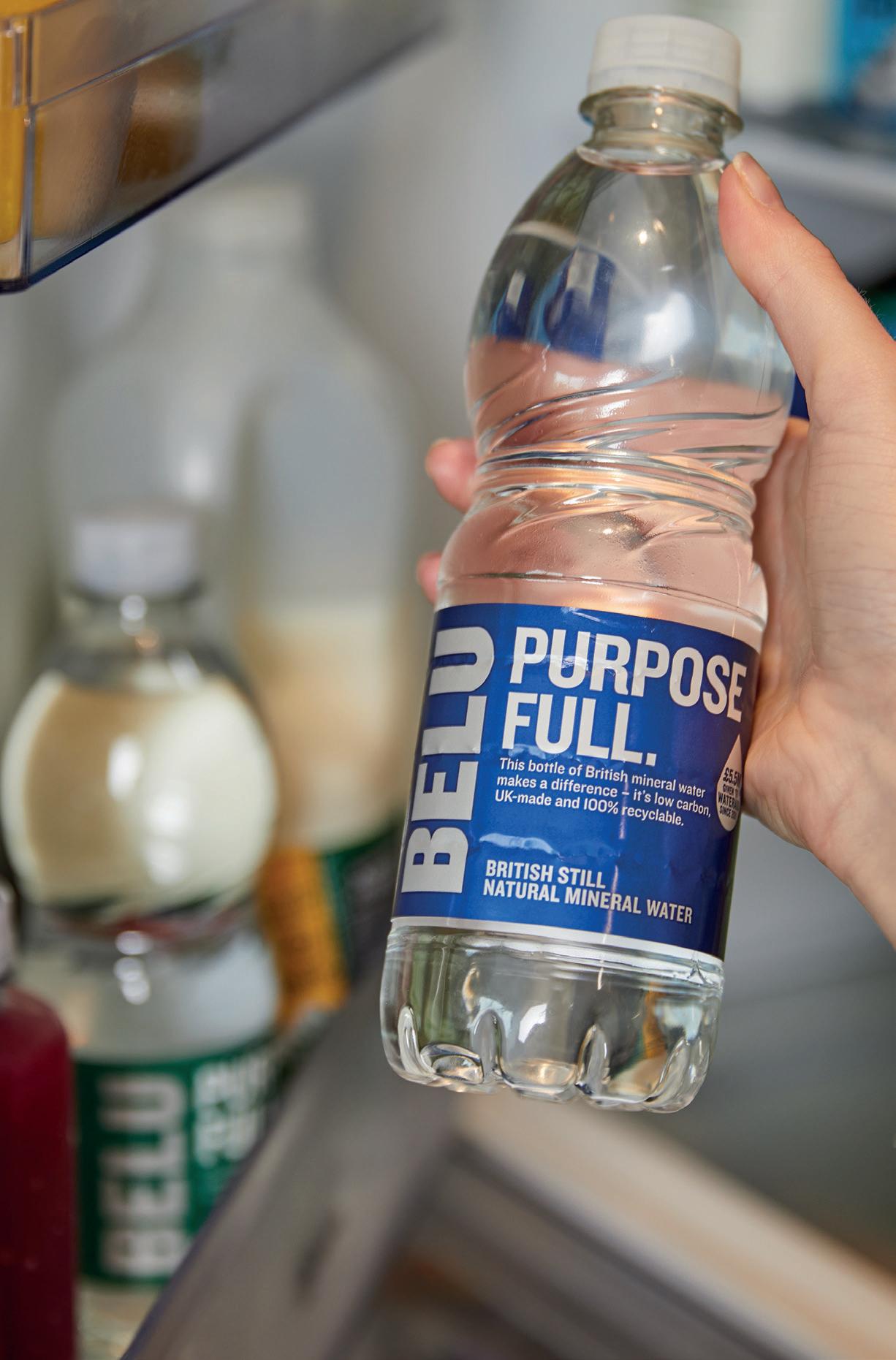
aluminium comes from bauxite, mined in countries as far flung as Australia, China and Brazil, which can cause air and water pollution, and disruption to the local environment. That’s another good reason for choosing cans made from as much recycled material as possible.
Cartons are a bit more complicated. They are made from multiple materials, generally including paperboard, aluminium and polyethylene which makes recycling more difficult. 92% of UK local authorities have some form of carton recycling collection, but there is still just one reprocessing facility in the UK, only capable of recycling 40% of the cartons manufactured here.
In an ideal world all layers would be separated out and then used to make more cartons. However, generally, the paperboard becomes paper, and the polyethylene and aluminium are used in the cement industry.
So, although cartons are recycled, new cartons are largely made with raw materials, using more energy and creating more waste. If half of the UK’s 2023 plastic water
bottle usage had been cartons instead, it would have created 98,141 tonnes of low-quality waste (enough to fill almost 9,000 bin lorries) whereas plastic bottles can be made into new rPET bottles as part of a circular system.
Bio plastics are plant based and are appealing in theory for bottled water because they appear to be a more natural, ‘earth friendly’ version of plastic. Brands using bio plastics and other biodegradable materials present them as the most sustainable packaging option. The reality is that the majority of a bottle of water’s carbon footprint comes from the production of the packaging - especially when creating new materials like bio plastic. These are largely made outside of the UK, so transportation must also be factored into the overall carbon footprint.
Another key consideration is disposal. You can’t just pop your bottle into your garden compost. Bio plastics require a commercial composting facility to break down properly, and the UK has very limited infrastructure for this. Most local authorities do not accept compostable plastics in food or garden waste collections, meaning these bottles often end up in general waste and are sent for incineration or landfill. They can also contaminate plastic recycling streams if mistakenly recycled. Without a closed-loop collection system, the sustainability benefits of bio plastic in the UK are questionable. There has also been research indicating that if conditions aren’t right, bio plastics can breakdown into microplastics. Bio-plastic may well become a game changer but for the time being we are sceptical about the claims being made aligning with real-world impact.
Filtering and serving water in re-useable bottles at your hotel (whether in room, in restaurant or for events) eliminates single-use packaging, making it the lowest waste, lowest carbon footprint option compared to packaged water. Filtration machines carry the majority of their carbon footprint upfront during the manufacturing phase. However, many suppliers are steadily improving their sustainability credentials and reducing the carbon
How Belu’s different formats measure up

intensity of production through more energy-efficient processes. While some energy is still required to operate the equipment ongoing, these systems are being optimised with energy efficient features. Over time, the carbon emissions per litre of filtered water are significantly lower than bottled alternatives. Water filtration is cost-effective compared to bottled water too. And because you’re getting great tasting, hot, chilled, still or sparkling filtered water, it can be a significant revenue driver.
Belu provides a range of water solutions, because we know that every venue operates differently. Belu Filter in Action helps workplace and hospitality businesses serve great-tasting filtered water as well as supporting them with servicing and maintenance. Where there is a need for


bottled water, whether it be for fine dining or grab and go, we’ve developed our range of light-weighted glass bottles, recycled plastic bottles and cans to be the most sustainable they can be - and we’ll continue to improve.
Choosing social enterprises or brands which commit to giving profits to a charity not only means that you are delivering positive impact, but also that you have an inspiring story to share. That can help boost team engagement and guest advocacy. Belu is a social enterprise that invests 100% profit in changing the way the world sees water. We support UK water stewardship projects, invest in carbon reduction and give all net profts to WaterAid to bring clean water, decent toilets and good hygiene to communities worldwide.
There’s no one-size-fits-all sustainable water format for every hotel and often a combination of solutions is best. Some Belu customers choose filtration for the restaurant and back of house, mineral water for the bar, rPET for inroom or a different combination to suit them. Aligning your
purchasing with your sustainability policy is important, but so is making sure teams have exactly what they need to deliver impeccable and efficient customer service.
At Belu, we’re here to help you find the best water solution for your business; meeting your sustainability goals, your budget and your guest expectations. Get in touch: hello@belu.org
*wrap.ngo/resources
**www.citytosea.org.uk/attitudes-towards-refill-and-reuse-in-the-uk
“There are many options and formats available but they all have their own pros and cons. Sometimes navigating the facts beyond the greenwash is difficult too. At Belu we continually stay ahead of the curve when it comes to sustainability, making sure we’re continually improving and working with our suppliers to innovate.”
Nolan Wright Director of Supply Chain Operations & Finance
Cost vs. Value for Hoteliers – we analyse the financial benefits of going green—from energy savings to increased guest loyalty—and how sustainability initiatives can boost the bottom line.
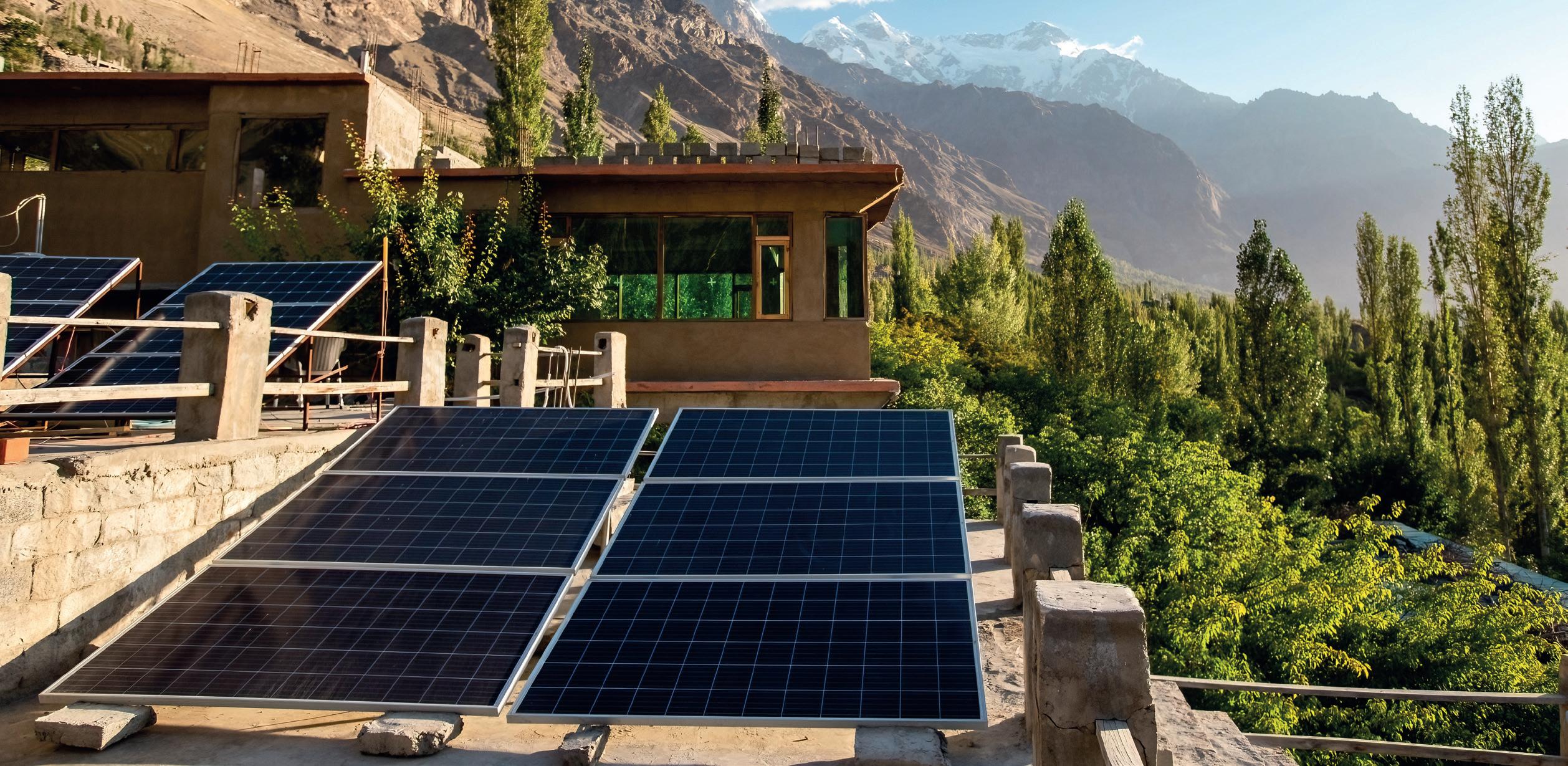
As the hospitality industry faces increasing pressure to operate responsibly, sustainability is no longer just a moral imperative—it’s a smart business strategy. With experts on hand, we explore the true financial value of going green, moving beyond upfront costs to reveal long-term benefits for hoteliers.
From significant energy savings and operational efficiencies to enhanced brand reputation and guest loyalty, sustainability initiatives are proving to be powerful tools for boosting the bottom line.
One venue paving the way for a greener future is The Hari London, since July 2024, The Hari London has operated on 100% renewable electricity, certified by REGO through their partnership with npower, significantly reducing their carbon footprint.
General Manager at The Hari London, Francesco Sardelli, explained how they have also completely refreshed the minibar and in-room amenities at The Hari London with a focus on ethical sourcing and eliminating singleuse plastic. Key highlights include: fairtrade-certified chocolates and coffee from a British supplier, sustainably
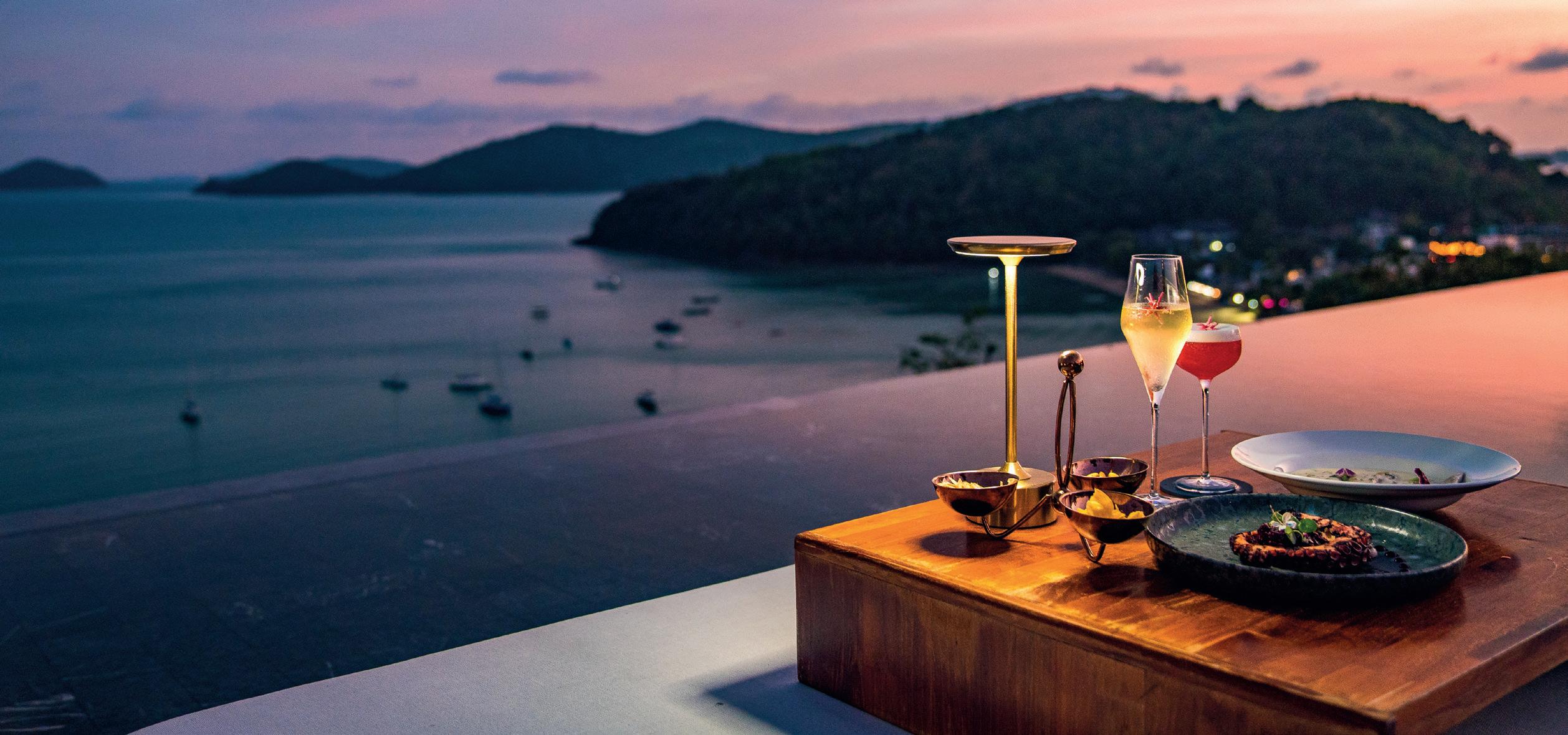
sourced Belu water in recyclable glass bottles (with profits supporting WaterAid), compostable or biodegradable snack packaging, FSC-certified tissues, toilet paper, and key cards and refillable toiletries.
Francesco said, “Guests increasingly notice and value these efforts, often asking about packaging materials and certifications—showing clear alignment between their expectations and our values.”
At The Hari London, they measure ROI through guest satisfaction, reduced waste costs, stronger supplier partnerships, and enhanced brand reputation—all contributing to long-term financial and environmental sustainability.
Francesco revealed that at The Hari London, they “see sustainability as an investment—not a cost.” While some upgrades carry higher upfront expenses, Francesco acknowledges that careful planning and cost-benefit analysis ensure strong returns.
“For example, switching to 100% REGO-certified renewable electricity cut emissions and reduced our energy cost per guest night by 20%. Replacing single-use amenities with sustainable alternatives delivered a 10% cost saving and reinforced our Responsible Luxury ethos.
“We prioritise initiatives that align with our environmental goals and operational strategy, weighing financial ROI alongside regulatory readiness, guest expectations, and efficiency.”
Key results include a 32% reduction in CO₂ emissions per guest night (2023–2024), zero waste to landfill, with full waste traceability, EarthCheck Silver Certification for three consecutive years and being named one of the world’s most sustainable hotels by TripAdvisor.
Looking beyond cost savings, we were keen to find out how The Hari London’s sustainability strategy has contributed to brand value, guest loyalty and occupancy
rates, Francisco added, “Our commitment to sustainability has elevated brand perception and deepened guest loyalty. In 2024, The Hari London was ranked the 7th Most Sustainable Hotel in the World by Tripadvisor’s Travellers’ Choice Awards.
“We hold EarthCheck Silver Certification (2023–2025), having progressed from Bronze in 2022. These thirdparty accreditations, along with Booking.com’s verified certifications, boost our credibility and increase visibility— especially among conscious travellers who filter search results based on sustainability.
“As demand grows for responsible travel, our leadership in this area strengthens loyalty and drives occupancy through meaningful brand differentiation.”
For hoteliers hesitant to adopt sustainable practices due to perceived high costs, Francisco advises starting with awareness. At The Hari London, they’ve found that internal understanding is the foundation for success. “Without it, cost concerns tend to overshadow long-term benefits.”
The Hari London have embedded sustainability into their culture with structured training—twice annually for all staff, plus induction and onboarding for new team members.
“Sustainability is about future-proofing. It reduces risk, builds brand resilience, and unlocks new opportunities— from operational efficiency to guest loyalty.
“Work with a reputable certification body like EarthCheck to provide structure and credibility. Start small—switch to LED lighting or eliminate single-use plastics. With the right mindset, sustainability becomes a pathway to long-term growth and differentiation,” finished Francisco.
At room2, they also see return on investment not just in pounds and pence, but in purpose and long-term value. From a financial perspective, room2 Lucy Eaglesfield, Head of Sustainability, explained, “Our sustainability initiatives

have reduced operating costs across energy, water, and waste. In fact, our fully electric room2 hometels use, on average, 61% less carbon per night than a typical UK hotel - translating to lower energy bills and operational efficiencies over time.”
Lucy recognises that the value goes beyond the balance sheet and admitted they’re seeing stronger brand loyalty, employee engagement, and increased guest trust - all driven by our commitment to doing the right thing. “Sustainability has become a powerful differentiator, helping us to attract like-minded travellers, purpose-led businesses, and ESG-conscious investors. Together, these factors are collectively building long-term brand strength and long-term asset value,” added Lucy.
At room2 they take a whole lifecycle approach to cost analysis, looking beyond upfront expenses to the long-term savings and environmental benefits that unfold over time. “Our Net Zero Building Specification guides all of room2’s developments and retrofits, helping us avoid short-term thinking,” said Lucy.
For room2, efficiency is embedded into their design choices. By installing systems like air or ground source heat pumps and smart energy controls from day one – the team ensure that performance is optimised from the start. By optimising systems and eliminating excess, upfront material costs are lowered while also cutting embodied emissions.
Looking ahead at what sustainability investments will offer the greatest ROI for hoteliers in the next 5–10 years, Lucy believes that electrification and energy monitoring technologies will continue to be smart investments, especially as regulation tightens and energy prices fluctuate. “Retrofitting our existing buildings to reduce Scope 1 and 2 emissions and lower long-term operating costs will also remain essential, helping to cut long-term
operating costs while aligning with our Net Zero goals.
“We are also investing in circular design - choosing materials that can be recovered, reused, or repurposed”, added Lucy. This not only extends the lifecycle of assets and reduces waste disposal costs, but also adds a new and innovative element to the customer journey.
“It’s not just about buildings and systems, it’s also about people. We believe that investing in our team through sustainability training, active engagement, and a purposeled culture delivers equally valuable returns driving innovation, employee retention, and long-term brand loyalty,” Lucy finished.
Scott Mitchell, Managing Director at Surgeon’s Quarter Said: “At Surgeon’s Quarter, sustainability represents a long-term commitment rather than a passing trend. One of our most impactful initiatives began in 2019, when we joined a Scottish Water campaign to eliminate single-use plastic water bottles from our 129 guest bedrooms.
By switching to a more sustainable hydration solution, the venue has successfully removed approximately 80,000 plastic bottles from circulation each year.
“This simple yet significant change not only supported our environmental goals by reducing plastic waste but also delivered a clear financial return, resulting in annual savings of around £22,000 and £132,000 since the initiative began,” Scott explained.
An increasing number of eco-conscious travellers actively seek out environmentally responsible accommodations, giving sustainably-run hotels a competitive edge in the market. Embracing sustainability also fosters stronger relationships with local communities and aligns with global efforts to combat climate change, positioning hoteliers as responsible industry leaders committed to a better future.
Red Carnation’s commitment to sustainability is now more structured and deeply integrated than ever. Michelle
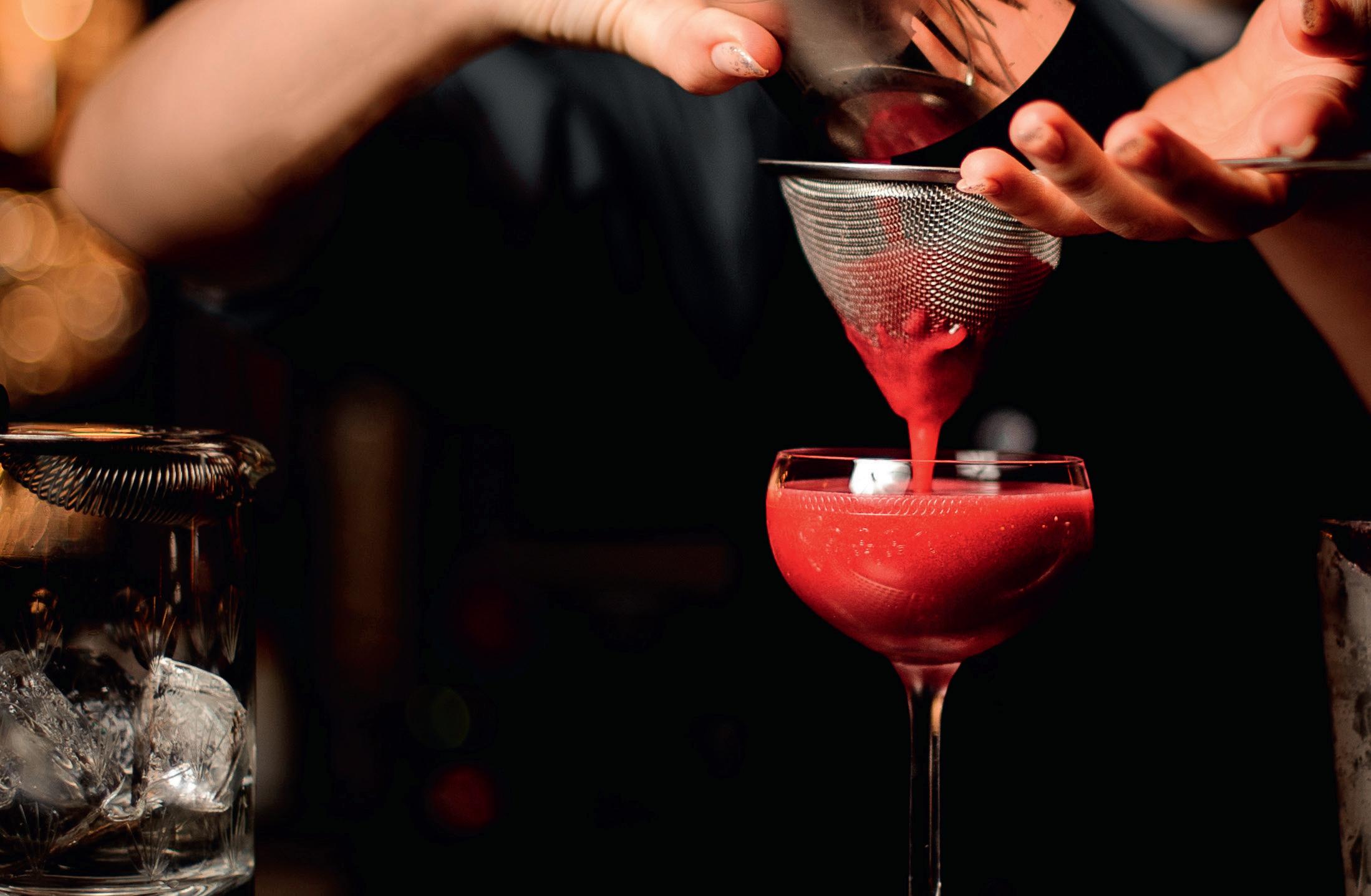
Maximum flexibility for mixed loads with our MasterLine fresh water dishwashers.
Short cycles and top-class cleaning results ensure that crockery is ready for use again in no time. Simplicity of operation and a broad range of programmes make MasterLine a most efficient member of the team.
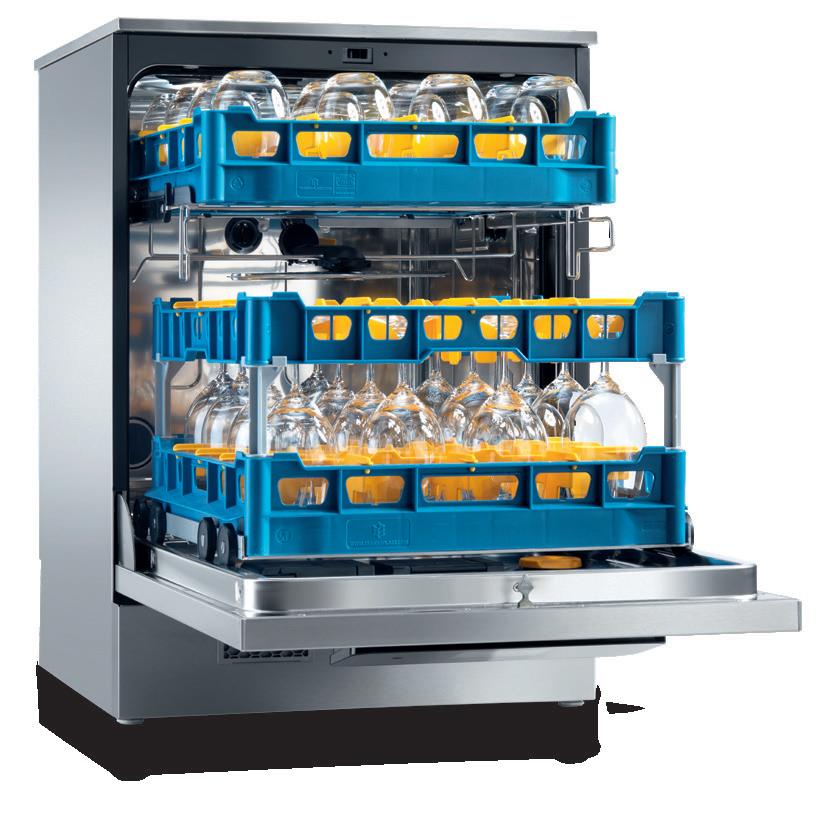

Devlin, Vice President of Sustainability at Red Carnation Hotels, explained since taking on the role of Vice President of Sustainability, stepping away from the role of General Manager at The Egerton House Hotel, she has been able to drive the group’s vision by leading on initiatives and working closely with the hotel teams to implement impactful programmes.
“Our collection has always championed sustainability as a fundamental value that should be embedded at the heart of every operation, not treated as a separate initiative.
“Through our new partnership with EarthCheck, we can now formally document, verify, and quantify these environmental practices that our hotels have upheld for years, reinforcing our commitment to accountability and stewardship. This forms a key part of our long-term journey towards achieving net zero by 2050,” added Michelle.
At Red Carnation Hotels, they measure ROI through savings in energy consumption, reduced waste management costs, and strengthened relationships with local suppliers. “For example, working with Winnow has enabled us to cut food waste by 42%, delivering both environmental benefits and operational savings.” Beyond operational efficiencies, Michelle recognises that the real return lies in building a brand aligned with today’s values, where awareness of social and environmental responsibility is not just expected — it defines market leadership.
RedCarnation proudly began their partnership with EarthCheck in January 2025, with Bronze certification anticipated by July this year and Silver by May 2026. In tandem, Michelle explained how they have engaged McGrady Clarke, energy management professionals, to conduct energy audits and identify practical cost-saving measures across our collection, including enhanced lighting efficiency and improved energy management
systems. “These efforts are already yielding measurable operational improvements while reinforcing our long-term commitment to responsible hospitality. Initiatives such as our work with Winnow, our investment in renewable energy sources, and our emphasis on circular systems and local sourcing are all part of a broader strategy to reduce our environmental footprint and embed stewardship into every layer of our operations,” finished Michelle.
At the Sheraton Grand Hotel & Spa Edinburgh, they have also partnered with the Winnow food waste platform to help measure and record our food waste.
Frank De Kruijf, Director of Operations at Sheraton Grand Hotel & Spa Edinburgh, said, “We have seen a shift in the way we work when we can see the volume of food waste; it really has an impact. We have seen our overall food waste reduce year on year by 15% and this has a positive reduction on the volumes of food that we purchase and prepare. We have also seen a 10% reduction on the kitchen labour hours, as well as a positive reflection in our food cost - any opportunities to improve profitability is valuable in the current climate.”
Sustainability in the hospitality industry has evolved from a moral imperative into a clear business advantage. As illustrated by pioneers like The Hari London, room2, Red Carnation Hotels, and the Sheraton Grand Hotel & Spa Edinburgh, the shift toward greener operations is yielding tangible financial returns—through reduced energy and waste costs, enhanced operational efficiency, and stronger brand loyalty. Beyond savings, these hotels demonstrate how sustainability fosters guest trust, staff engagement, and long-term resilience. For hoteliers, the message is clear: investing in responsible practices is not just good for the planet—it’s essential for future growth, competitiveness, and enduring success.

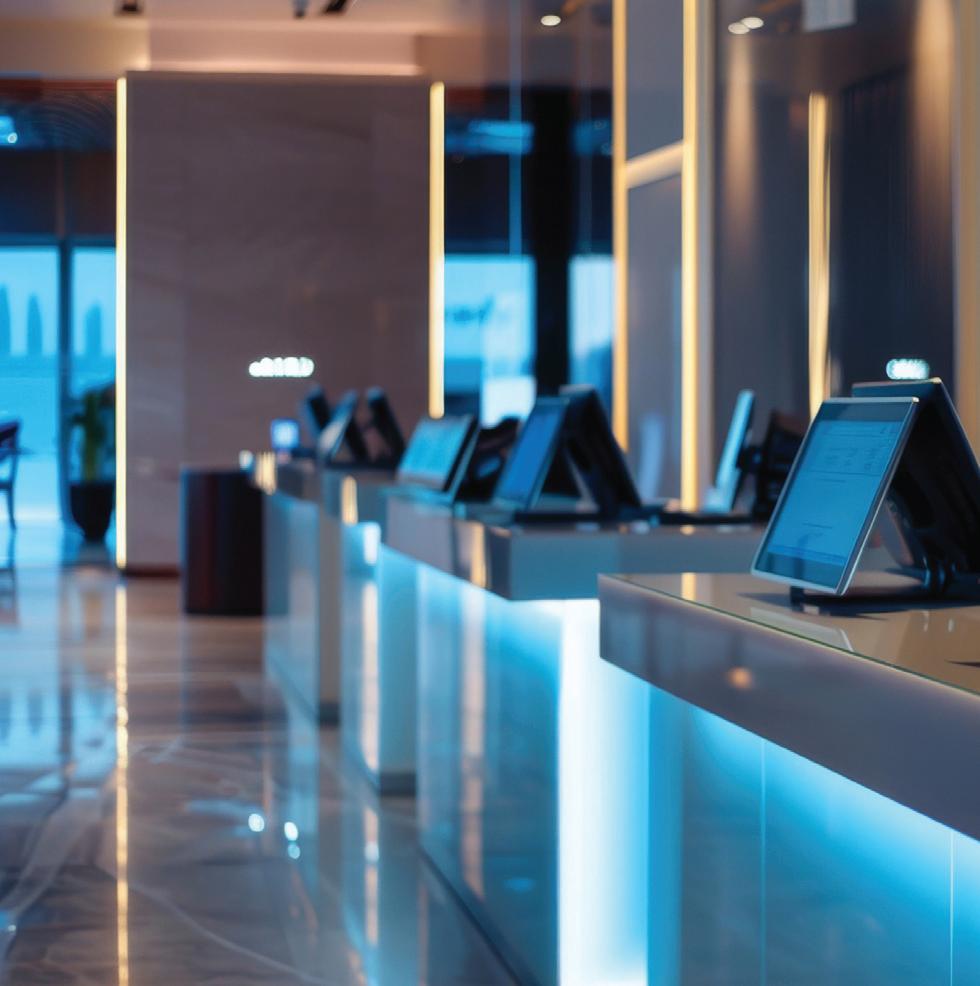
A solar installation will increase your energy security and offset guest wastage, WITHOUT compromising on guest comfort.
You can reduce operational costs and promote sustainability with a 25-yr lifespan system, that in most cases will payback in as little as 4-yrs!
We are nationwide Commercial Solar installation experts with hospitality sector experience.
Contact us today to see how we can help your business
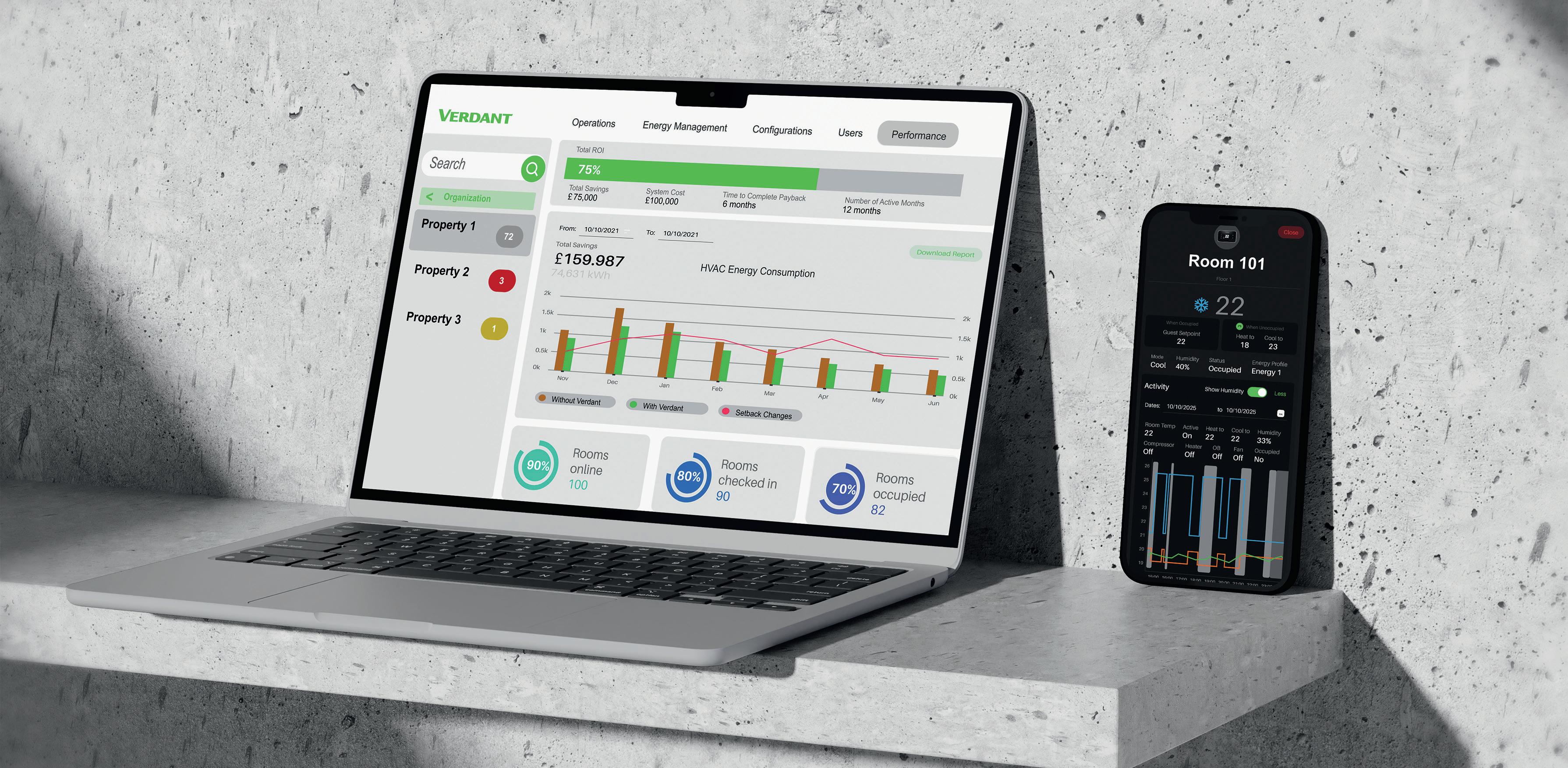
Sustainability in hospitality industry is no longer just a “trend” – it is slowly becoming a business imperative that drives the UK’s journey towards a greener future. Rising energy costs and increased environmental regulations are driving hoteliers to rethink their operations. At the same time, travellers are becoming more eco-conscious and have higher expectations for greener practices during their journey. Promising data indicates that travellers prefer hotels that are working towards net zero goals.
This poses the question; how can hotels reduce energy consumption without compromising guest comfort? One surprisingly simple answer lies in a small device with a big impact: the smart thermostat.
Designed to improve energy efficiency in hotels and commercial properties, Verdant’s energy management solution offers more than just a temperature control. Using occupancy detection, Verdant thermostats automatically adjust HVAC settings when a room is empty to reduce energy usage by up to an average of 45%.
Guest room represent one of the largest sources of energy consumption in most hotels. Did you know that hotel rooms are unoccupied 60% of the time? Heating or cooling and empty room is not just inefficient, it is a lot of wasted energy, unless your hotel is equipped to adapt.
Unlike traditional thermostats – or even many “smart” models – Verdant thermostats feature advanced patented features that continuously monitor motion and body heat. Verdant thermostats automatically enter setback mode when rooms are empty, allowing temperatures to adjust efficiently.
“Our plug-and-play solution has helped customers deliver up to a 45% reduction in HVAC runtime, and we are excited to now bring this solution to Europe,” said Michael Serour, VP and GM, Verdant energy management solutions for Copeland.
Verdant solutions utilise proprietary radio frequency technology over 862 MHz to operate independently

without depending on property Wi-Fi and disrupting guest experience.
It takes an average of 15 minute or less per room in installation, making it a seamless choice for property owners trying to switch to smart solutions. The Verdant thermostat requires minimal installation costs or guidance for both new builds and retrofit projects, avoiding disruptive processes like wall demolition and rewiring. Delivering a quick return on investment, averaging between 12 to 24 months.
One hotel leading the way recently rebranded and renovated as a part of IHG journey is the Haymarket Hub Hotel in Edinburg. The hotel underwent a 2£ million renovations as a part of IHG’s “Journey to Tomorrow” responsible business plan. Strategically located opposite Haymarket Station, the 195-room hotel is now aligned with IHG’s new Garner brand, focused on offering reliable, comfortable and more sustainable stays. Hotels across the UK, similar to the Haymarket Hub Hotel can make smart investment for a greener future and turn every empty room into an opportunity for energy and cost savings.
“Verdant is installed by over 9,000 hotels, multifamily buildings, senior living communities, and student housing properties across North America and Europe. Our smart energy solutions consistently deliver measurable savings, helping our customers reduce energy consumption and costs while advancing their sustainability goals,” added Serour.
Complementing our smart thermostats, Verdant Thermostat Manager provides a centralised platform to manage HVAC energy efficiently across individual properties or entire portfolios. This intuitive app empowers

operators to monitor real-time energy consumption, set custom alerts, and optimise system performance remotely with minimal staff effort. Optimise performance across hundreds of rooms or entire portfolios and get real time insights to create measurable ESG reports.
Available on desktop, iOS, and Android, it allows energysaving actions from anywhere. By reducing unnecessary HVAC use and thereby lowering carbon emissions, Verdant Thermostat Manager is a tool to provide further support for your sustainability goals.
Turn every stay into a more responsible one. Whether you are renovating an old property or building a new one; or simply looking for a sustainable solution – go smart. Verdant’s smart thermostats reduce energy consumption and cut energy bills by up to 18%, enabling owners and operators to see a faster return on investment while prioritising environmental goals.
Book a demo with a Verdant energy expert today and discover how our system can help your property achieve maximum energy savings while maintaining exceptional guest comfort and supporting your hotel’s energy goals.
verdant.copeland.com
In this interview, we sit down with the Plug Me In team to explore how they’re supporting the hospitality sector’s sustainability ambitions to becoming net zero. From custom solar and battery installations for hotels to long-term energy performance monitoring, the team share how its expertise, end-to-end service model, and future-facing approach are helping shape the guest experience of tomorrow—one kilowatt at a time.

Introduce us to the brand and tell us about its mission.
Powering the UK ahead with intelligent energy technology, Plug Me In is a market-leading financing and installation partner for businesses, public sector organisations, social housing providers, and consumers across the UK.
Part of the Calisen Group, a leading UK energy infrastructure business, our mission is to accelerate the UK’s transition to net zero by delivering smarter, cleaner energy solutions for homes, businesses, and communities. We specialise in the design, installation, maintenance, and funding of technologies like solar PV, battery storage, heat pumps, and EV charging—helping customers improve energy efficiency, cut costs, and reduce reliance on the grid - making the transition to cleaner energy simple.
How does Plug Me In position itself within the evolving solar (and battery) landscape, and what makes it uniquely suited to partner with hotels?
We position ourselves as a trusted, end-to-end partner for commercial-scale solar and battery projects. With deep expertise in sustainable energy infrastructure and a nationwide team of in-house engineers, we’re equipped to deliver fully managed installations that meet the needs of complex commercial environments—including hospitality settings.
For hotels, our value lies in tailoring each solution to the unique energy usage patterns of the property—helping them reduce reliance on the grid, generate on-site clean energy, and unlock long-term cost savings. We also support sites with energy monitoring and maintenance, ensuring performance remains strong over time.
With sustainability becoming a top priority for many hospitality brands, how do your solutions support hotels in meeting their green goals while enhancing guest experience?
Solar and battery systems not only cut carbon emissions, they also show visible, tangible action on sustainability— which today’s guests increasingly expect.
For hotels, installing solar panels can power core operations with clean electricity while also helping to offset energy used by EV charge points, spa facilities, and air conditioning systems. When combined with battery storage, hotels gain more control over their energy use, reduce peak demand charges, and improve resilience during outages. These are benefits that resonate with both business priorities and guest expectations.
What are the key considerations Plug Me
In takes into account when designing and installing solar solutions at commercial properties?
Every installation starts with a detailed site and energy usage assessment. We consider available roof space or land area, sun exposure, current and projected electricity demand, and opportunities for battery integration.
For hotels in particular, we ensure that systems are designed to complement daily operational rhythms and aesthetics, minimising disruption during installation and ensuring a seamless visual integration with the property.
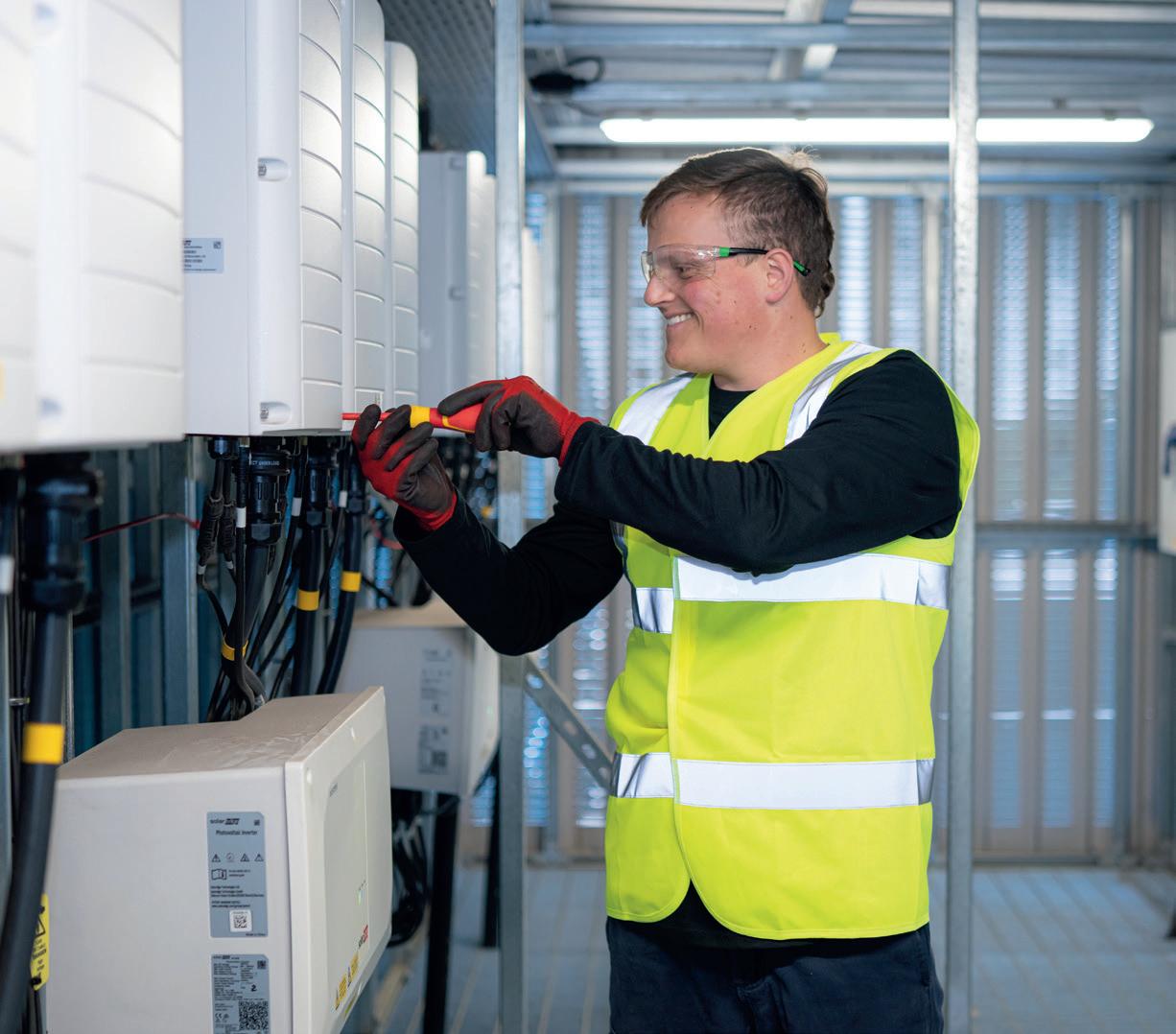
Safety, performance, and long-term return on investment are at the heart of every project we deliver.
Can you share a recent partnership or installation that showcases the value Plug Me In brings to the commercial sector?
Our solar install for farming and food business Barfoots Group was one of the largest solar installations in the UK. Boasting state-of-the-art hardware and supporting safe, long-term maintenance, the innovative system we implemented has given Barfoots substantial value by reducing their operational costs and supporting their longstanding sustainability aims.
While not in hospitality, this project demonstrates our ability to deliver at scale, coordinate across multiple stakeholders, and deliver social, financial, and environmental value principles that apply just as well to hotels and hospitality venues.
Looking ahead, how do you see solar and battery (and/or clean energy) technology evolving, and what role do you envision Plug Me In playing in shaping the guest experience of tomorrow’s hotels?
We’re moving into a future where energy is not only greener, but also smarter. Advancements in battery storage, AI-driven energy management, and grid services will make it easier for hotels to optimise their usage, participate in energy markets, and even generate new revenue streams from their clean energy systems.
At Plug Me In, we’re focused on staying ahead of the curve—offering integrated solutions that help hotels prepare for what’s next. Whether it’s powering more of their operations with solar, pairing it with EV infrastructure, or improving resilience in the face of energy price volatility, we’re here to make the transition as simple and impactful as possible.
plugmein.com
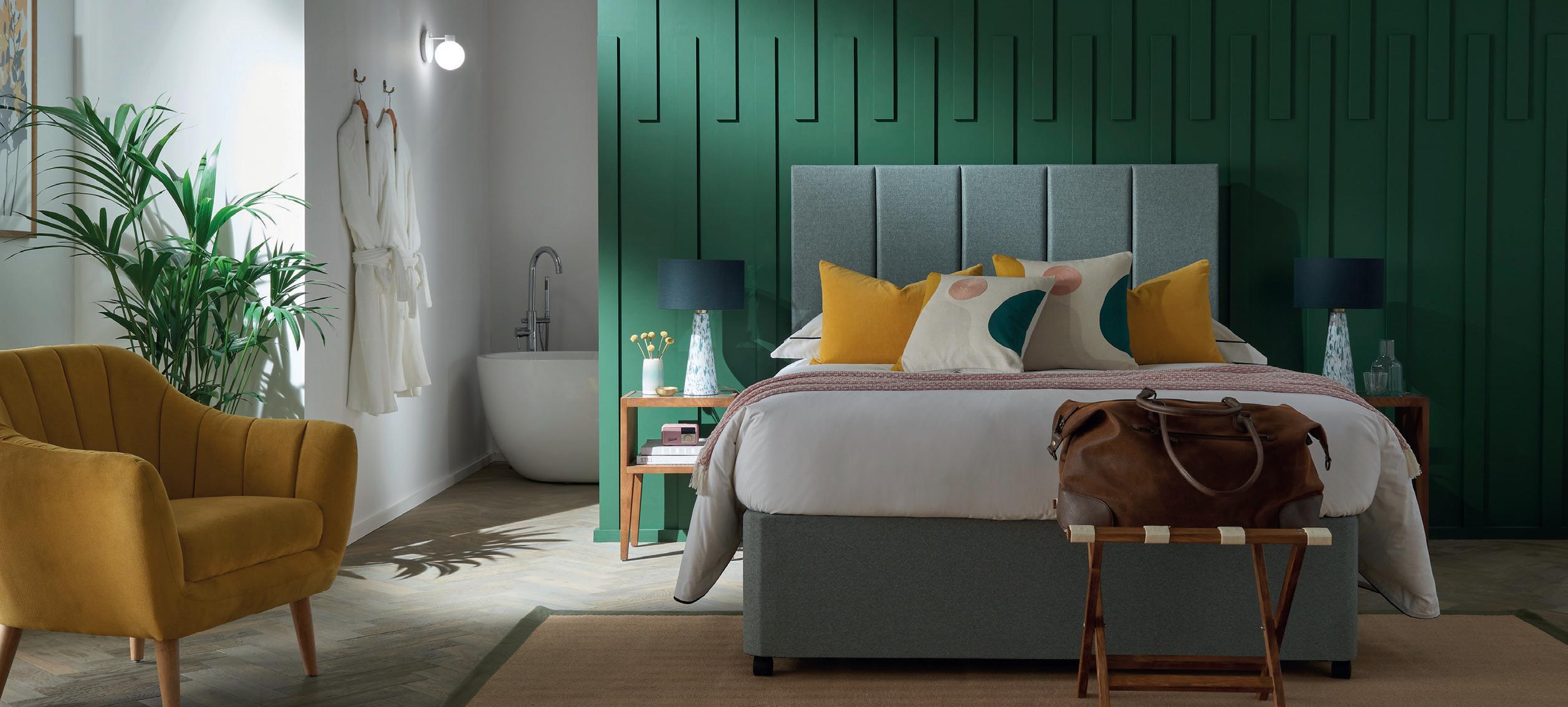
In today’s fast-paced hospitality sector, timing can be the difference between rooms sitting empty or generating revenue. From full refurbishments to emergency replacements, the ability to act quickly is a critical business advantage. That’s where Silentnight Contract comes in — not just as a supplier of high-performance beds and mattresses, but as a partner helping hotels stay fully operational, even at short notice.
Long lead times have become a frustrating industry norm. Many suppliers quote 12–16 weeks — or more — for delivery, creating knock-on delays for openings, upgrades, and essential maintenance. Silentnight Contract is changing that. We’ve engineered a responsive, hotel-first supply
model that delivers our core range of beds and mattresses in as little as two weeks, with some products available for next-day delivery.
What makes this possible is our combination of advanced manufacturing and strategic stock planning. We don’t wait for orders to start production — we anticipate demand and hold dedicated stock for the contract sector. Whether it’s a small upgrade or a full property rollout, our clients aren’t left waiting for a product that should already be contributing to guest satisfaction and nightly revenue.
Unlike traditional supply models that operate on a justin-time basis, Silentnight Contract holds rolling stock of our most in-demand SKUs, specifically geared for
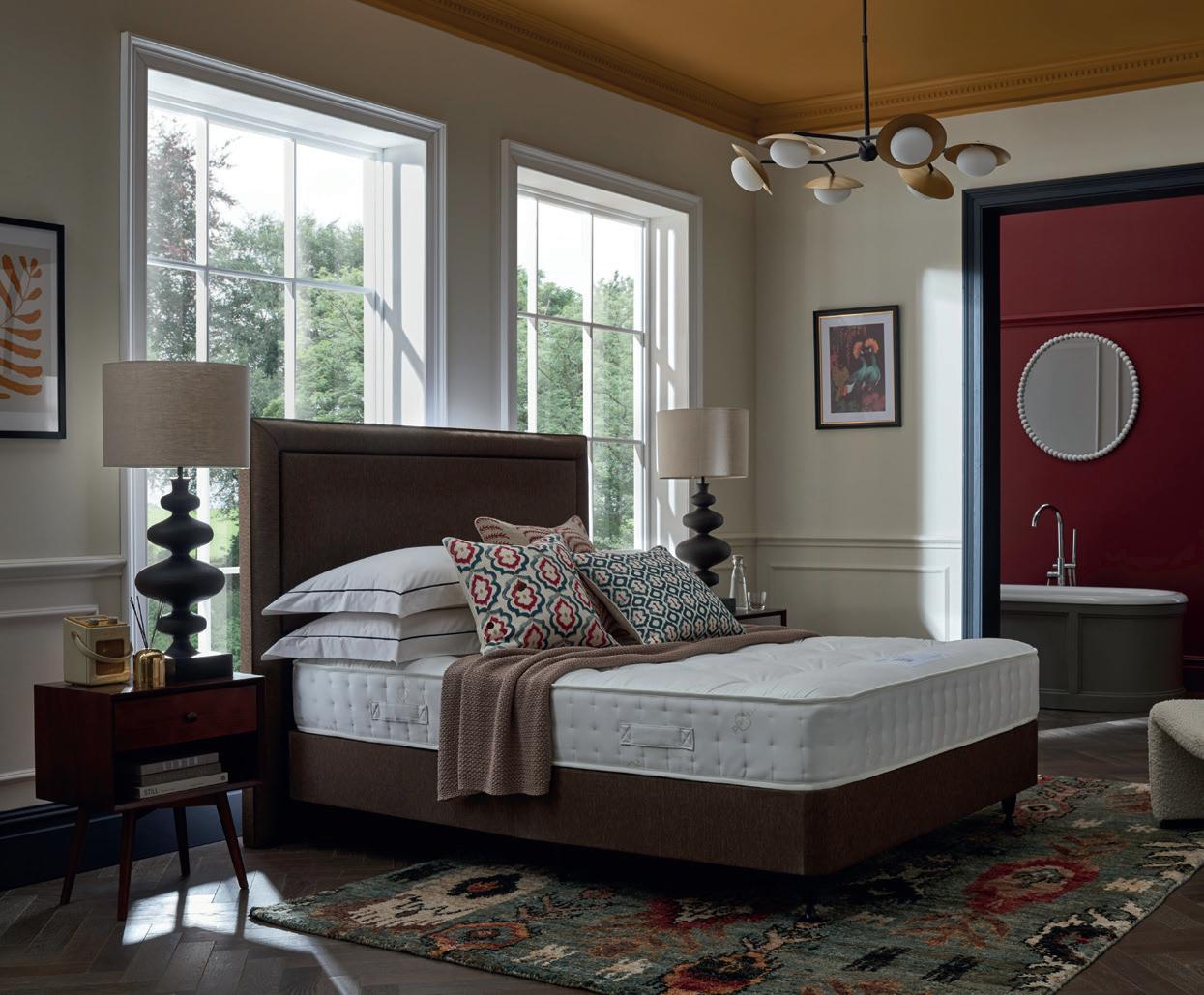

hospitality. We plan against industry refurb cycles, seasonal fluctuations, and client forecasts to make sure we’re always one step ahead.
This proactive approach means that when a hotel needs beds fast — whether due to an accelerated fit-out, room expansion or last-minute snag — we’re already positioned to deliver. We’re not just meeting timelines; we’re helping hoteliers protect theirs.
While our hospitality products are made on the same state-of-the-art lines as our consumer beds, the standards they’re held to are far more demanding. Our mattresses and divan bases go through enhanced durability and compliance testing to meet the daily rigours of hotel use: more frequent turnover, stricter regulations, and higher guest expectations.
Each Silentnight Contract product is engineered to deliver lasting comfort and resilience, helping hoteliers avoid costly replacements and maintain a consistently high standard of guest experience. Because in hospitality, a great night’s sleep isn’t a luxury — it’s the baseline.
Refurbishment cycles are getting shorter. Brand refreshes are happening more frequently. And travellers are more discerning than ever before. In this environment, the ability to act quickly — to respond to a sudden upgrade requirement or align with a rebrand launch date — can be a competitive edge.
We’ve heard countless stories from operators whose projects have stalled due to drawn-out delivery schedules. In worst-case scenarios, rooms sit empty — finished in every way but missing beds. Silentnight Contract exists to remove that risk. Our fast and reliable service has made us the go-to supplier for operators who can’t afford to compromise on timelines or guest expectations.
Beyond our lead times and product performance, our hotel clients value the way we operate. Our dedicated contract team works closely with hotel partners to coordinate delivery, installation, and access around operational realities — from check-in schedules and lift access to room sequencing and floor plans.
We don’t just deliver beds. We deliver confidence. Every project is supported by a professional installation team, a rigorous compliance framework, and a service model designed specifically for hospitality.
Silentnight is proud to be the UK’s most trusted sleep brand. This trusted heritage underpins our contract division, which is now working with some of the UK’s bestknown hotel groups and independent operators alike.
We believe that great guest experiences start with great sleep — and that great service means delivering it without delay. Our short lead times are not just a supply chain feature; they’re a business enabler.
So, if your current supplier is slowing you down, maybe it’s time to switch to one that moves at the speed of hospitality.
Discover what smarter, faster bed supply looks like. contracts@silentnight.co.uk silentnight.co.uk/hospitality

We had the pleasure of speaking with Richard Price, the esteemed Head Concierge at The Wellesley Knightsbridge, a luxury collection hotel in the heart of London. Richard has been with the property since its pre-opening days, bringing decades of expertise, dedication, and a deep understanding of exceptional service. Recently honoured with the prestigious 25 Years Golden Keys recognition, Richard embodies the very spirit of Les Clefs d’Or. Join us as he shares insights from his remarkable career and what it truly means to go above and beyond for every guest.
Richard, congratulations on receiving your 25year Golden Keys award! Can you share with us what this milestone means to you personally and how it reflects your journey in hospitality? It’s hard to believe it’s been over three decades since I made what turned out to be a life-changing career move. Back in 1994, I left the world of fast-paced retail management feeling somewhat uninspired and unsure of my next step. That’s when my cousin, Simon Thomas – the renowned Head Concierge of The Lanesborough – introduced me to the world of hospitality, and more specifically, concierge service.
At the time, Simon was working at The Sheraton Park Tower (now The Park Tower Knightsbridge) and mentioned they had an opening for a Night Porter. He described the role, and I decided to go for an interview with Mr. Dennis Purcell, the Head Concierge – himself a legend in our industry. He was firm but fair, and thankfully, I got the job.
From day one, it was a world apart from retail – assisting guests with luggage, hailing taxis, and managing requests that were a far cry from anything I’d encountered before. Then, on just my fifth day, the Night Concierge went on long-term leave, and I was asked to step in. Suddenly, I was booking restaurants and theatre tickets, researching flights and local attractions – all long before the days of Google. Guidebooks and reference manuals became my closest allies. It was exhilarating. It felt like I had found my calling.
Over the next five years, I honed my craft across a variety of hotels and concierge positions. Eventually, I
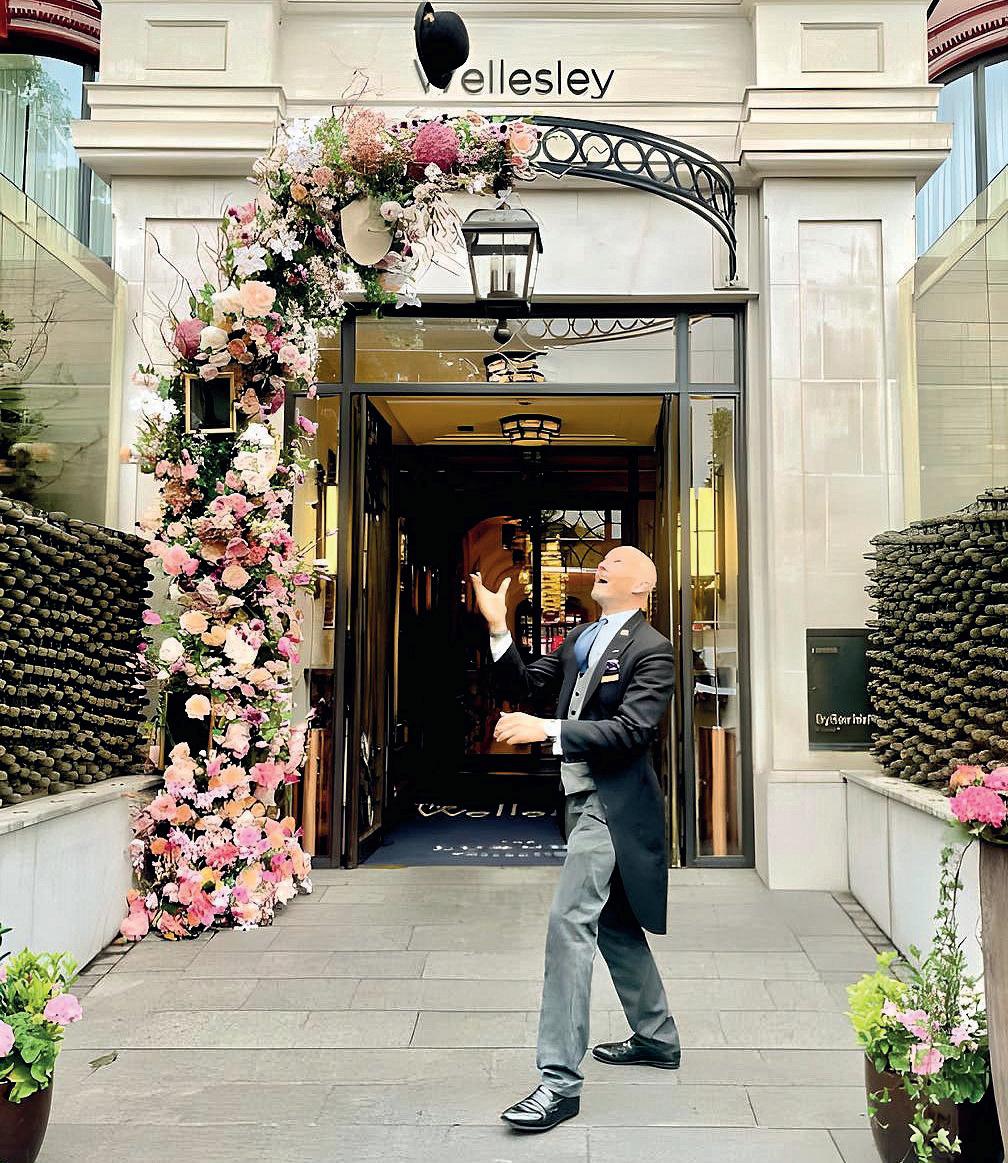

was honoured to earn my Les Clefs d’Or – the prestigious Golden Keys – a milestone that still means the world to me.
Since then, my journey has taken me through some of London’s most prestigious hotels. One of the highlights was joining the opening team at the legendary 11 Knightsbridge, now known as The Wellesley. It’s been an incredible ride, and remarkably, I still find the same joy in this work as I did on that very first day.
Having been with The Wellesley since its pre-opening days, you’ve witnessed a lot of changes. What are some of the most significant transformations you’ve seen in the hotel industry over the years, and how has The Wellesley adapted to these shifts?
Since the early days of the 1990s, the hospitality industry has undergone a dramatic transformation. The rise of the internet and the explosion of instant access to information have reshaped the way guests plan, book, and experience travel. Yet amid this constant evolution, one element remains timeless: the personal touch.
For concierges, adapting to this ever-changing landscape has been both a challenge and an opportunity. While guests now arrive armed with mobile apps and online recommendations, the true value of a seasoned concierge lies in something no algorithm can replicate—authentic,
personalised service. The Golden Keys we proudly wear on our lapels are more than a symbol; they’re a global emblem of trust, insider knowledge, impeccable attention to detail, and a deep devotion to the art of hospitality. International travellers recognise this immediately, and it remains one of the most enduring connections we have with our guests.
At The Wellesley, we’ve always embraced innovation, especially in the realms of sustainability and information technology. But arguably the most significant milestone in recent years came in 2017, when we joined the Marriott family. It was a transition that unfolded quickly—first, we became part of The Luxury Collection through Starwood in late 2016. Just a few months later, Marriott acquired Starwood, and The Wellesley became a proud member of the Marriott Bonvoy portfolio. This partnership connected us with the largest hotel company in the world, expanding our reach while maintaining the bespoke luxury experience that defines The Wellesley.
You’ve built a reputation for embodying the true spirit of service. How do you maintain such high standards of excellence, and what advice would you give to younger generations entering the hospitality field?
I’m constantly researching new restaurant openings and keeping an eye on what’s coming to the West End theatre
scene—often months in advance—so we can confidently make recommendations to our guests. It’s about staying ahead, knowing what’s new and exciting before anyone even asks.
One of my greatest joys is seeing my son join the team during holiday periods, working as a luggage porter. I tell him what I tell all newcomers: do your research, get to know London inside out—its rich history, its hidden gems, and its ever-changing cultural landscape. A good concierge knows what’s happening. A great concierge makes it happen.
I often tell people to think of the concierge desk as a stage, and the hotel lobby as our theatre. We’re performing every day—not with scripts, but with service. Guests light up when we hand them their dinner reservation as they walk in, or let them know, before they even ask, that the package they’ve been waiting for is already in their room. These aren’t just gestures—they’re moments of magic.
In our role, we’re part magician, part secretary, part personal assistant. Sometimes, we’re even marriage counsellors—yes, that’s happened too. We’re trusted with secrets, celebrations, and everything in between. It’s a challenging role, certainly, but for those of us who love crafting unforgettable experiences and building genuine connections, it’s incredibly rewarding.
As Head Concierge, you’re often the first point of contact for guests. Can you share a memorable experience where your service truly made a difference in a guest’s stay, and how you approach those personal interactions? There have been countless occasions where my team and I have made a meaningful difference to a guest’s stay — moments where, quite literally, we’ve pulled a rabbit out of the proverbial hat. It’s difficult to single out just one example, as there are so many.
I’ve helped orchestrate last-minute marriage proposals, assisted guests in making their way home during the 2010 Icelandic volcano eruption — including arranging chauffeur-driven journeys all the way from London to Lisbon and Madrid — and even helped one guest surprise his wife with a chocolate brown Labrador puppy. The list could go on.
But for me, it’s the human connections that matter most. We recently welcomed a wonderful family from New Jersey over New Year’s. We got along so well that, when it came time to say goodbye, both the guest and I were genuinely moved to tears.
That kind of bond is what makes The Wellesley truly unique among the hotels I’ve worked in. Here, it’s not just about exceptional service — it’s about the personal touches and the friendships that guests carry with them long after their stay. In fact, with our regulars, we don’t shake hands — we hug.
Looking back over your career, what moments or achievements are you most proud of, and what do you hope your legacy in hospitality will be for future generations?
There are many moments that I cherish, but perhaps the most meaningful of all was meeting my wife. We both worked at The Royal Garden Hotel in Kensington during

the late 1990s—she was the Guest Relations Manager, and I was a Concierge. It was truly love at first sight, glimpsed through the flowers and trees in the hotel lobby. That chapter not only shaped my personal life but also deepened my connection to the world of hospitality.
Professionally, one of the standout milestones in my journey was earning my Golden Keys in the year 2000 and becoming a member of Les Clefs d’Or, the esteemed international society of Concierges. It was a moment of immense pride, symbolising years of commitment to excellence in service. That honour was recently matched when I received my 25-year pin from my cousin Simon at a Les Clefs d’Or event—an emotional reminder of the time, effort, and passion poured into this career.
As I look to the future, my hope is that my legacy in hospitality will inspire the next generation. With the right mentoring and a sincere passion for the craft, they too can find a rewarding and enduring career in this incredible profession. Vive Les Clefs d’Or!

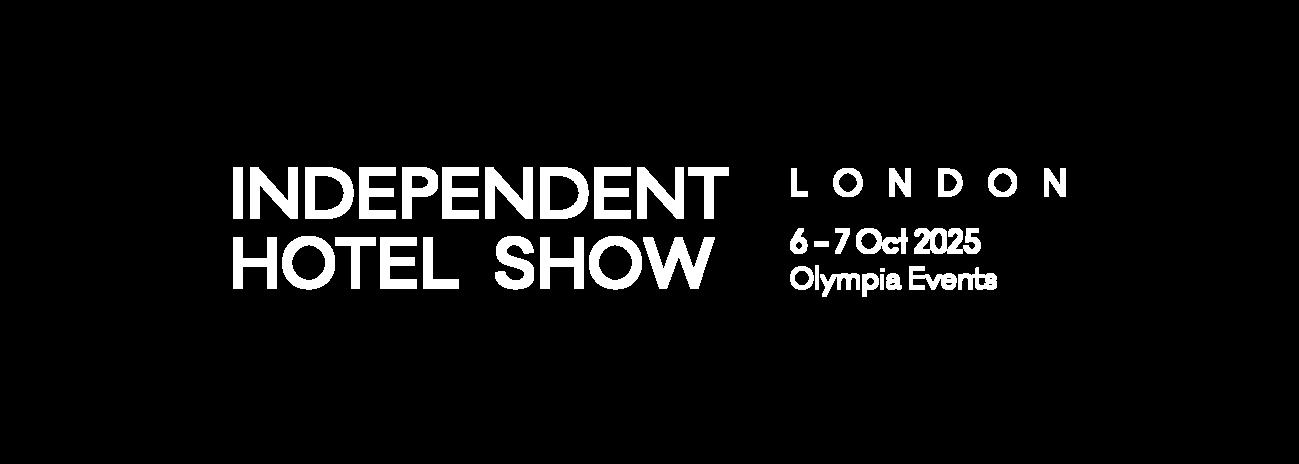


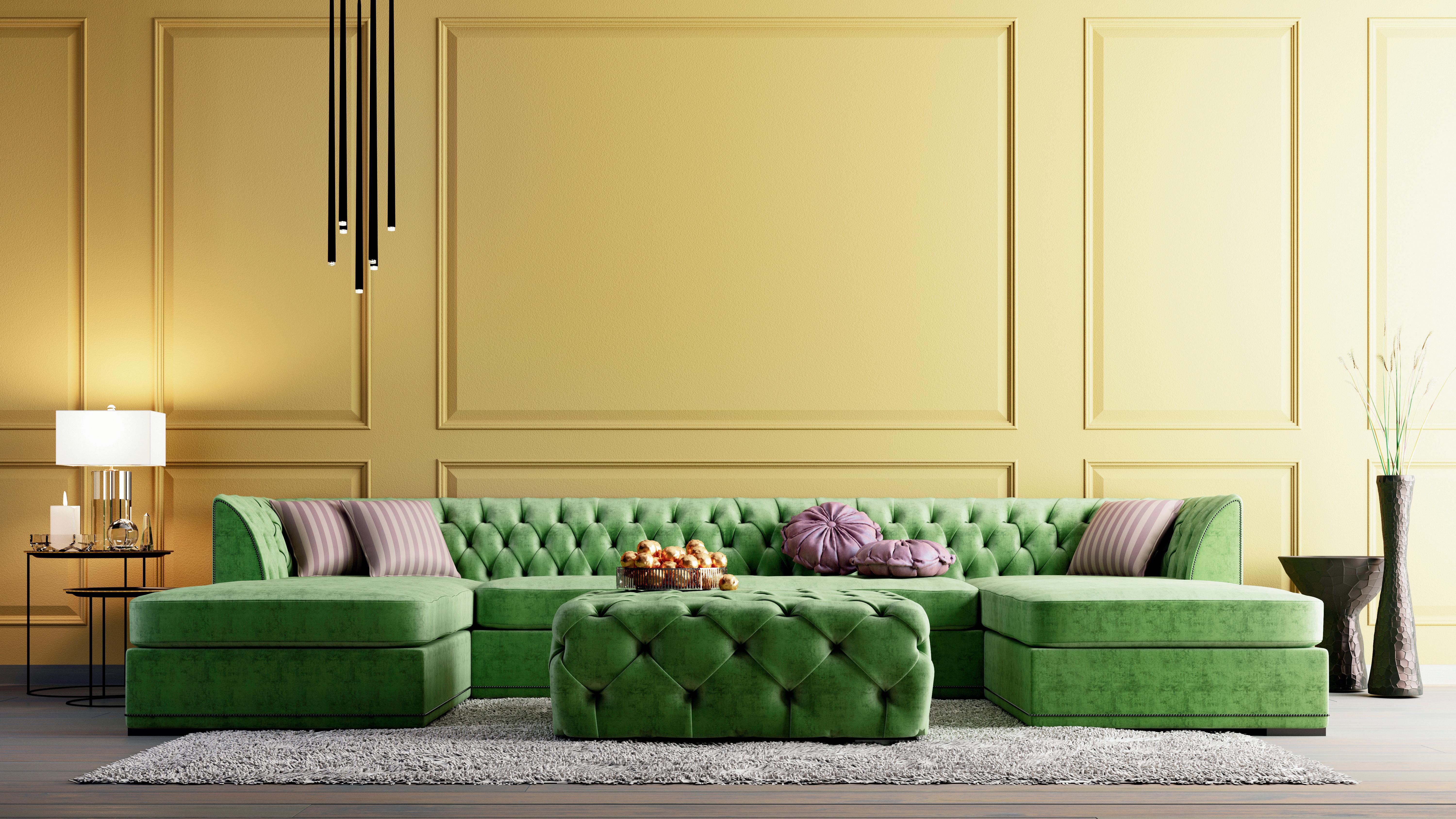
In our first instalment of a brand new segment: Inside Housekeeping, in collaboration with UK Housekeepers Association (UKHA), we speak to Fernanda Telatin Lewis, Director of Housekeeping at The Goring Hotel and Chairperson for UKHA for London and the Southeast where she shares her remarkable journey from room attendant to operations leader in luxury hospitality. Drawing from over two decades of experience, she offers practical wisdom on leadership, team motivation, and the evolving role of technology in housekeeping—all while advocating passionately for greater recognition of the profession.
Can you share a bit about your path to becoming Head of Housekeeping and what key experiences helped shape your leadership style?
I graduated from university in my home country of Brazil with a degree in Primary Education and a Bachelor’s in Arts. I arrived in London in June 2000, initially working as a room attendant. I gradually advanced through various roles, including supervisor, assistant housekeeper, and head housekeeper. By 2004, I earned a promotion to Operations Manager at a luxury boutique property, which broadened my perspective on hotel management.
One key experience that significantly shaped my leadership style was when I was shouted at by a supervisor early in my career. This pivotal moment taught me to be sensitive towards people’s feelings and the importance of respect in leadership. I strive to communicate as effectively as possible, adapting my style to connect with each individual. Working in hospitality means we must value and demonstrate care for one another daily, as our people are the most important asset of our business.
What are some lesser-known tips or efficiencies you’ve discovered that help maintain high standards while keeping your team motivated?
One lesser-known tip I’ve found helpful in maintaining high standards while keeping my team motivated is our morning role-playing sessions. We often engage in activities like “knock-knock” games, where we pretend we are guests interacting with housekeeping staff. This kind of training not only improve our skills in personalising guest experiences but also fosters a sense of camaraderie within our team. With 12 different nationalities represented, these


sessions boost confidence in speaking English and allow us to express genuine interest in our guests.
How has technology changed the way housekeeping operates in recent years, and are there any tools you now consider indispensable?
I am a big fan of technology and how it facilitates our work. Over my 25 years in housekeeping, I’ve seen incredible changes—especially in planning, checklist management, image sharing, maintenance reporting, and health and safety training. I love every aspect of leveraging technology, always seeking ways to improve our processes. Communication apps have become indispensable tools, as they allow our team—scattered throughout the building—to share insights and updates in real-time.
What advice would you give to someone looking to build a long-term career in hotel housekeeping or hospitality management?
If you’re looking to build a long-term career in hotel housekeeping or hospitality management, my advice is simple: be very good at finding the right people. Don’t be seduced by credentials alone; focus on finding great team players with a positive mind-set who will add value to your existing team. In hospitality, we thrive on warmth, kindness, and generosity, creating memorable experiences for both our guests and ourselves.
With ongoing staffing challenges and shifting guest expectations, what strategies have you found effective in maintaining service quality and team morale?
Given the ongoing staffing challenges and shifting guest expectations, I believe it’s crucial to “plan for the worst but hope for the best.” As a leader, I prioritise having robust contingency plans and keeping my team well-informed. When everyone knows that solutions are in place, team morale tends to be high. Housekeeping requires us to be problem solvers 24/7, and I see the best outcomes from my team when we navigate challenges together.
What would you like to see from hotel housekeeping in the next 1-3 years?
Over the next 1-3 years, I hope to see our wonderful community of housekeeping leaders gain the recognition we deserve. It’s time for us to raise our voices and advocate for our profession. We are often underestimated and taken for granted—but what would the world look like without our dedicated cleaning staff? It’s time to shout from the rooftops about the fabulous services we deliver 365 days a year and to ensure our teams are well-compensated and cared for.
I am committed to ensuring that the invaluable roles of housekeepers are acknowledged and celebrated. Together, we can advocate for a future where our contributions are recognised, respected, and impactful.
At a time when hotel operators are already navigating a sea of challenges, another wave is quietly approaching—Extended Producer Responsibility (EPR). In this guest column, Kate Nicholls, Chief Executive of UKHospitality, warns that this little-known policy could soon bring significant and unfair costs to the hospitality sector. With confusion, double charges, and poor policy design at its core, EPR risks becoming yet another burden for hotels and venues already under strain. Read on as Kate lays out why the industry is pushing back—and why it matters to you.
With everything else you’re having to contend with at the moment, hotel operators will be forgiven for not having EPR on their radar.
Extended Producer Responsibility, for those of you blissfully unaware, will effectively force hospitality businesses, including hotels, to pay twice for recycling.
Leading pub, hospitality and brewing bodies have expressed their ‘deep concern’ about the extra costs and impact of EPR, along with the Department for Environment, Food & Rural Affairs’ (Defra) lack of progress in addressing those concerns.
Under EPR, hotels and other venues must pay for existing business waste collection to dispose of glass, as well as face additional costs passed on by suppliers, meaning £millions more outgoings for the sector.
Poor policy design has incorrectly classified bottles of beer and wine as household waste and subject to a packaging levy, despite not leaving hospitality premises.
No final announcement of EPR prices plus ongoing confusion around double payment is negatively affecting investment decisions and business confidence, while additional costs will be passed on to guests.
In a letter to the Prime Minister and Chancellor, and another to Steve Reed, the Defra Secretary of State, UKHospitality and leading hospitality businesses have appealed for a delay of at least a year to the introduction of EPR, and called on Defra to remedy existing issues.
In the letter to the PM and Chancellor, we state: “EPR comes at a time when there are cumulative issues affecting the sector, including changes to employer National Insurance Contributions. Indeed, DEFRA has confirmed that EPR will operate in an unfair manner for at least two years.”
We tell Steve Reed: “The consequences of the flawed

[EPR] scheme are now being felt by the hospitality sector. Medium-sized outlets are seeing increases nearing £750, and a small venue up to £350-per-year. Larger pubs will see increases of around £2,000. This is in addition to their commercial waste contracts.
“EPR is designed to recover costs for the collection of household waste. The vast majority of packaging supplied to hospitality businesses is not leaving the premises and should not be considered as ‘household’ waste.”
So while EPR might not be front of mind for hotels right now, this desperately unfair levy on our sector could prove another costly piece of red tape at a time when we could all do without it.
Rest assured, we’ll be fighting it all the way.
Kate Nicholls, Chief Executive, UKHospitality




In today’s digital age, where smartphones, tablets, and laptops dominate personal entertainment, the humble hotel TV might seem like an outdated relic. After all, why would travellers need a television when they carry entire libraries of movies, shows, and games in their pockets? Yet, despite the streaming revolution, hotel TVs remain a vital and expected part of the guest experience. From convenience to comfort, hotel televisions serve functions that personal devices alone cannot replicate.
One of the primary reasons hotel TVs continue to matter
is the role they play in making a hotel room feel like home. After a long day of travel, meetings, or sightseeing, guests often seek a familiar, relaxing environment. Turning on the TV provides instant entertainment without needing to navigate logins, battery levels, or Wi-Fi issues. It’s a loweffort, comforting routine—just sit back and watch.
Lying on a bed and watching TV is an experience many associate with relaxation. For families, especially, hotel TVs allow shared screen time without crowding around a phone or laptop. It’s a communal, social element that’s difficult to replicate with personal devices.

Hotel TVs often serve as more than just a portal to basic cable. Many modern systems now offer tailored content, including:
• Local news and weather updates
• Hotel services and amenities
• Room service menus
• Concierge recommendations for dining and attractions
This curated content helps guests orient themselves in a new city and understand what the hotel offers—far beyond what a streaming app on a phone can provide.
Even the best smartphone or tablet can’t compete with a high-definition, wall-mounted television for visual impact. Guests often choose hotel TVs to enjoy sports, action films, or late-night shows in better quality and on a bigger screen. This is especially true during major events like the Super Bowl, the Olympics, or major political coverage— times when high-quality visuals and sound make all the difference.
Rather than being replaced by smartphones, many hotel TVs now integrate with them. Smart TVs with Chromecast or AirPlay support allow guests to stream their own content onto the hotel’s big screen. This creates a hybrid experience: the personalised content of a phone with the comfort and scale of a television. Many chains have invested heavily in such upgrades to ensure TVs remain relevant and user-friendly.
From the hotel’s perspective, the in-room TV is a valuable marketing tool. On-screen promotions for the hotel spa, dining options, or partner experiences can lead to upselling opportunities. Additionally, pay-per-view options, though
less common now, still exist in some markets, particularly for exclusive or early-access content.
Interestingly, many guests still expect a television as a standard amenity—just like clean sheets or a working shower. The absence of a TV could result in poor reviews or lower star ratings on platforms like TripAdvisor or Booking.com. Even if guests don’t use the TV extensively, its presence symbolises completeness in the hotel offering.
For business travellers, hotel TVs can serve multiple roles. Some use them to catch up on financial news, while others connect their laptops to the screen for presentations or as a second monitor. With HDMI ports now standard, hotel TVs provide flexibility for a tech-savvy audience.
Perhaps most importantly, TVs offer a kind of passive entertainment that personal devices often don’t. You can flip through channels, discover something new, and let the programming roll without needing to choose or engage deeply. For some, it’s the perfect way to wind down—no decisions, no scrolling, just ambient relaxation.
Hotel TVs have evolved—not disappeared—in the streaming era. While personal devices dominate active viewing and personalised content, the television remains a powerful, comforting, and convenient fixture in the hotel experience. Through smart integration, curated content, and a commitment to guest comfort, hotel TVs continue to earn their place on the room’s amenity list.
Far from being obsolete, they’ve adapted to coexist with modern entertainment habits—and in doing so, still matter more than ever.
We
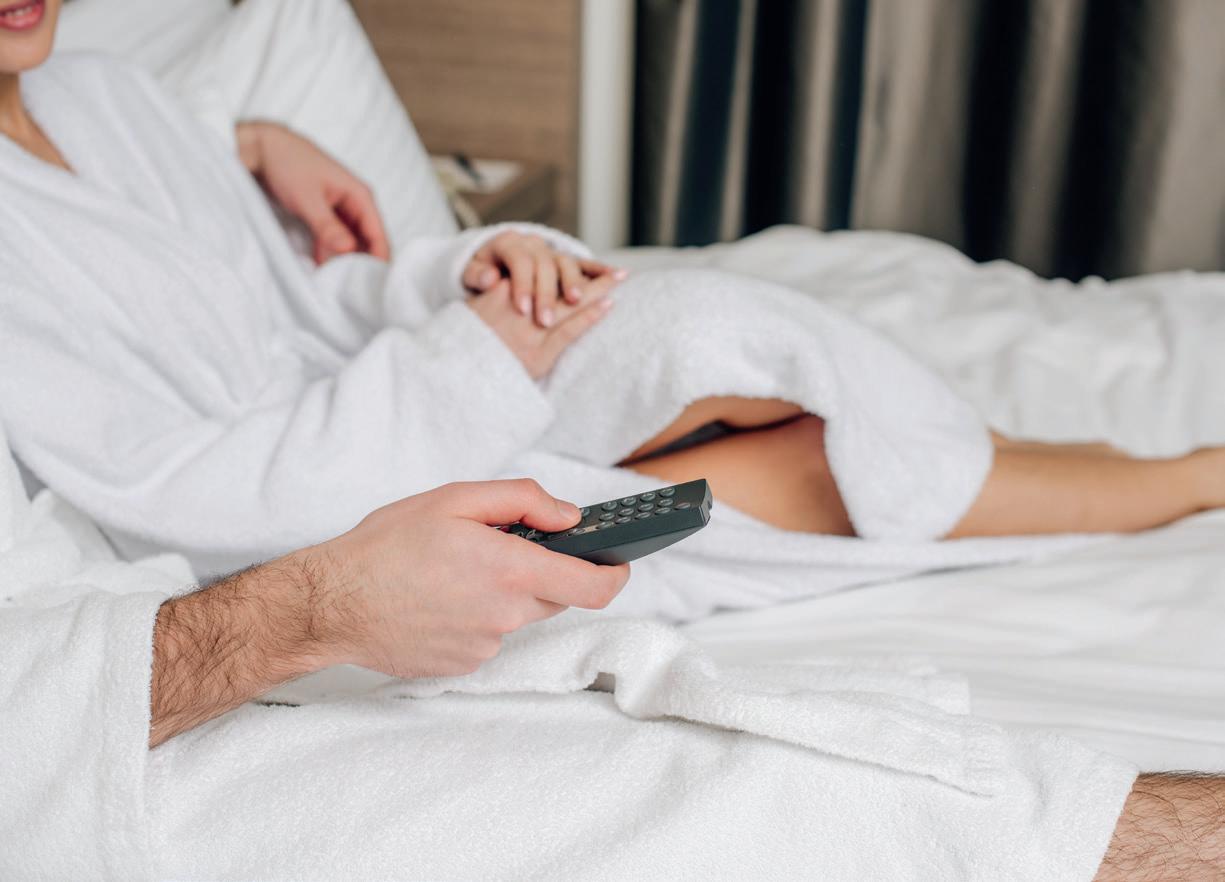
In an era dominated by personal devices and streaming services, in-room televisions might seem like relics of the past. In today’s hyper-connected world, it’s easy to assume that traditional TV has lost its relevance. But that assumption is misleading. In fact, in the hospitality industry, television remains a key amenity that continues to play a significant role in shaping the guest experience.
Access to TV channels can positively influence a guest’s perception of their stay and impact reviews and recommendations. Despite the ubiquity of smartphones, tablets, and laptops, many travellers still turn to the hotel room TV for relaxation, information, and a sense of familiarity. After a long day of meetings, sightseeing, or travel, the comfort of a big screen and a remote control is hard to beat.
Traditional TV channels offer instant entertainment — no subscription, setup, VPN or login required. For many hotel guests, flipping through them is a comforting part of the hotel experience. Traditional television also serves as a shared activity for families, keeping children entertained while adults unwind. For many travellers — particularly older demographics — it remains the preferred way to relax. This enduring importance is especially evident in the UK, where British programming is valued for its quality and innovation.
To meet evolving guest expectations, many hotels now offer smart TVs that blend traditional broadcast
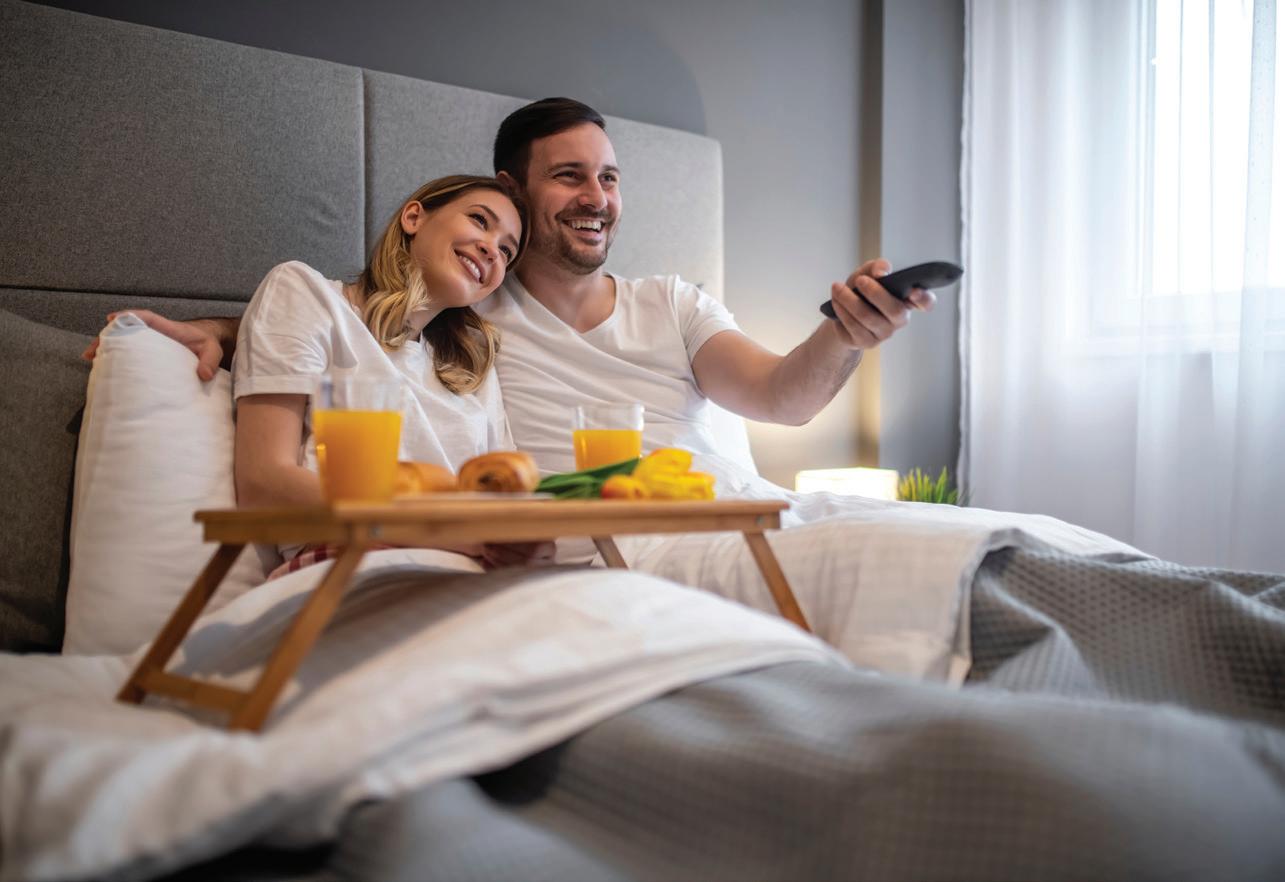
with streaming capabilities — a hybrid model that caters to a wide range of viewing preferences. Today’s media consumption is characterised by convergence, where multiple platforms coexist to meet different needs, contexts, and audiences. Rather than one service replacing another, guests increasingly value choice and flexibility.
However, unlike private homes, hotels are considered public venues under copyright law. To offer TV legally, hoteliers must obtain the appropriate licences. Failing to comply can result in fines, legal action, and reputational damage.
The AVLA licence allows hotels to offer access to TV channels — including the main free-to-air networks — featuring films, series, documentaries, cartoons, and other shows from AVLA’s extensive repertoire. It covers TVs in guest rooms as well as in communal areas, and includes works and rights not licensed through other organisations.
Traditional television remains key to enhancing the guest experience. Respecting copyright laws is crucial not only to avoid legal or reputational risks, but also to support creative professionals. Hotels that secure the necessary licences demonstrate a commitment to ethical business practices and respect for intellectual property rights. This adds a layer of positive value that guests are increasingly sensitive to.
To learn more about AVLA and to take the licence visit www.avla.uk

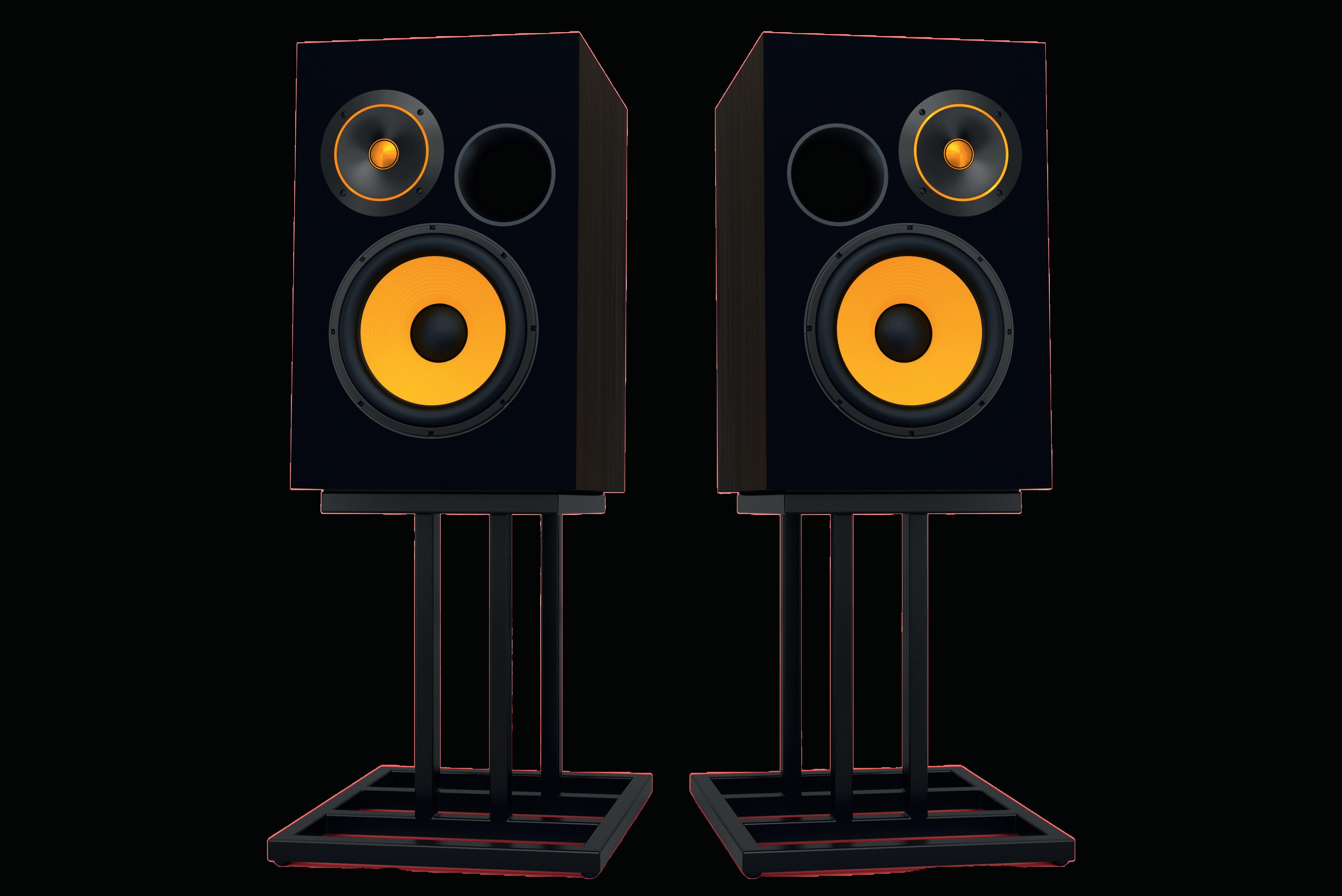



We had the pleasure of speaking with Julia Selyukova, General Manager at the iconic Four Seasons Gresham Palace Budapest. With a career spanning continents and shaped by transformative experiences in both Europe and the Middle East, Julia brings a deep passion for hospitality, cultural connection, and team empowerment to one of Budapest’s most storied hotels. In this interview, she shares insights from her journey, her vision for Gresham Palace, and the evolving nature of luxury hospitality in a city as dynamic as Budapest.
Tell us briefly about your experience as a hotelier, including your early career and passion for the industry.
I began my journey in hospitality in 2008, spending over five years with Marriott International. My passion for creating meaningful experiences led me to join Four Seasons during the pre-opening of our Moscow (former Four Seasons) property. Over time, I progressed from Director of Sales and Marketing to Hotel Manager, and served as General Manager during a pivotal transition. In 2022, I took on a new challenge in Doha, stepping into a leadership role just after the FIFA World Cup. Doha taught me to lead with even greater empathy, flexibility and cultural sensitivity. The Middle East has a unique rhythm— there, I learned the power of patience, the importance of listening, and how to build trust in diverse teams. These experiences across continents have reinforced my belief that, at its core, hospitality is about building genuine human connections, embracing cultural richness, and curating moments that leave a lasting impact.
What excites you the most about leading the Four Seasons Gresham Palace, and what drew you to the property?
The Gresham Palace captivated me from my first visit—it’s not just a hotel but a a reflection of Budapest’s timeless elegance and character. Every day, walking across the Chain Bridge and seeing its stunning architecture fills me with gratitude. I’m naturally drawn to places that tell a story and reflect a strong identity—Gresham Palace



is exactly that. The unique energy of the building, its dedicated team, and its deep integration into the city’s heritage and everyday life make it an incredible place to lead. It’s a rare opportunity to blend history, elegance and genuine hospitality, and I’m excited to contribute to its ongoing legacy.
Budapest is a dynamic city with a growing tourism scene. What new trends do you see emerging in the luxury hospitality market, and how do you plan to implement them at the Four Seasons Gresham Palace?
Luxury today is about meaningful experiences and genuine human connections—guests increasingly seek authenticity, personalisation, and a true sense of place. At Gresham Palace, we’re embracing these trends by enhancing our experiential offerings and refining service to be even more intuitive and engaging. Our goal is to position the hotel not just as a place to stay, but as a destination in itself—immersive, inspiring, and uniquely Budapest. We’re also exploring new dining concepts and creative local partnerships to help elevate the city’s appeal. Luxury is evolving beyond aesthetics, and so are we—always aiming to stay ahead, while remaining deeply rooted in the craft of true hospitality.
What is a memory which really shaped your career?
My experience in Doha was especially transformative. I arrived shortly after the 2022 FIFA World Cup, during a time when the city was shifting from global spotlight to long-term development. It was a moment of change—not just for the destination, but also for me personally and professionally. Doha’s culture inspired a shift toward a more open and patient approach to high-level empathetic
leadership. Relationships there are built slowly, with intention and respect. I learned to lead by listening, to value timing, and to adapt without losing sight of purpose. What truly shaped me was the growth that came from working with people from vastly different backgrounds. Building trust and embracing the region’s values strengthened my resilience.
What do you feel is the most powerful element you can bring to Gresham Palace?
I bring a global mindset shaped by rich, international experiences, along with a deep passion for detail, beauty, and genuine human connection. I see it as both a privilege and a responsibility to honour its legacy while guiding it into the future. What truly sets this iconic hotel apart is not just its architectural grandeur, but the heart of our team. Kind, inclusive and genuinely helpful, our people create a sense of warmth and belonging that guests feel from the very first moment. I’m proud to lead a team made up of individuals from a wide range of backgrounds and perspectives—an environment I’ve always thrived in and championed throughout my career. This mix of talents and viewpoints strengthens our ability to deliver meaningful, personalised experiences for every guest.
My greatest contribution lies in empowering that team: nurturing pride in their craft, encouraging growth, and fostering a culture built on care and excellence. With strong commercial insight and a heartfelt appreciation for Budapest’s unique charm, I’m committed to ensuring Gresham Palace continues to grow—enhancing guest experiences, while staying true to its storied heritage. More than a hotel, it’s a living, breathing experience—and I’m here to help it shine.


Siemlus 0330 016 1920 hello@siemlus.com www.siemlus.com @siemlus siemlus
VANITY GROUP

02045 381787 info@vanitygroup.com www.vanitygroup.com @vanitygroupglobal VANITYGROUPGLOBAL





Hotel Buyer 01375 651 606 info@hotel-buyer.co.uk www.hotel-buyer-store.co.uk @hotelbuyer uk-hotel-buyer

ADA Cosmetics 01234 347 140 info@ada-cosmetics.com www.ada-cosmetics.com @ada_cosmetics_international adacosmetics



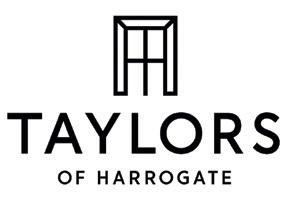

Lanchester Wines 01207 521234 sales@lanchesterwines.co.uk www.lanchesterwines.co.uk @lanchesterwines

Franke Coffee Systems 01923 635700 coffee.franke.com @frankecoffeesystems franke-coffee-systems


REM 01282 619977 sales@rem.co.uk www.rem.co.uk @remuklimited

EcoPure Waters 01844 290088 enquiries@ecopurewaters.com www.ecopurewaters.com @ecopure_waters ecopure-waters

S.Pellegrino



LEMI +39 0374 363069 contact@lemigroup.it www.lemispa.com/en/ @lemi_italianwellnessequipment

Taylors of Harrogate www.taylorsoutofhome.co.uk @taylors Taylors of Harrogate
Silentnight Group 0333 123 0892 info.silentnight.co.uk www.silentnight.co.uk @silentnightbeds

VOYA info@voya.ie www.voya.ie @voyabeauty La Bottega info@labottega.com www.labottega.com @labottega_official la-bottega-spa
IDeaS +1 952-698-4200 info@ideas.com www.ideas.com ideas-revenue-solutions

Alex.McMillan@waters.nestle.com www.sanpellegrino.com/uk/ @sanpellegrino_uk Schweppes www.schweppes.eu @schweppes

